INTERNSHIPS
Training Programs Work to Become More Equitable
REPRESENTATION
Historically Excluded Voices
Share Their Paths into Tech
SHARED LEADERSHIP
Inclusive Model Spurs More Diversity and Innovation

GOING BACK
Which Pandemic-Inspired Changes Will Continue?
Volume LXIV Number 1 • Winter 2023 • $8.00 INSIDE: 2023College, University &TrainingProgram Directory
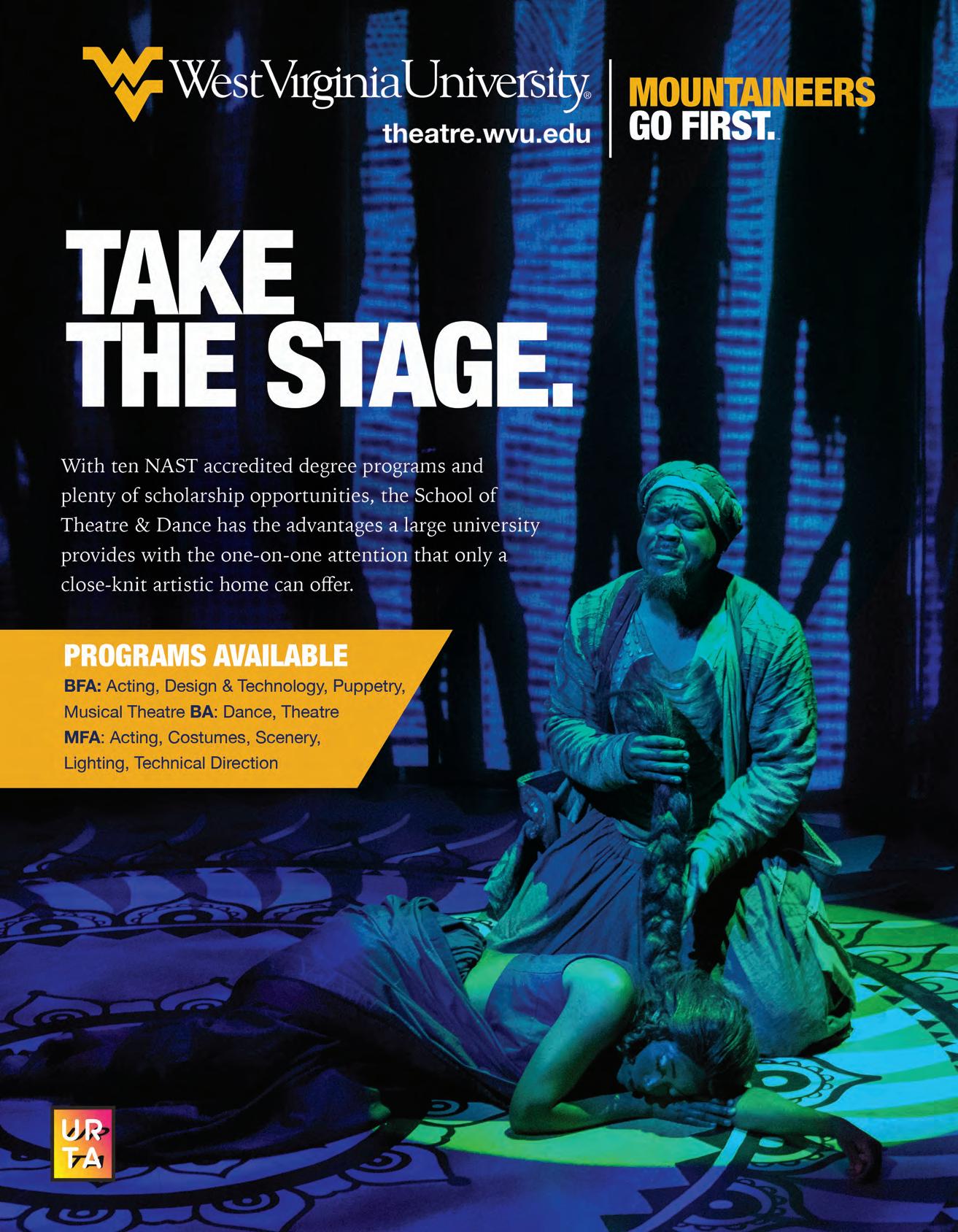
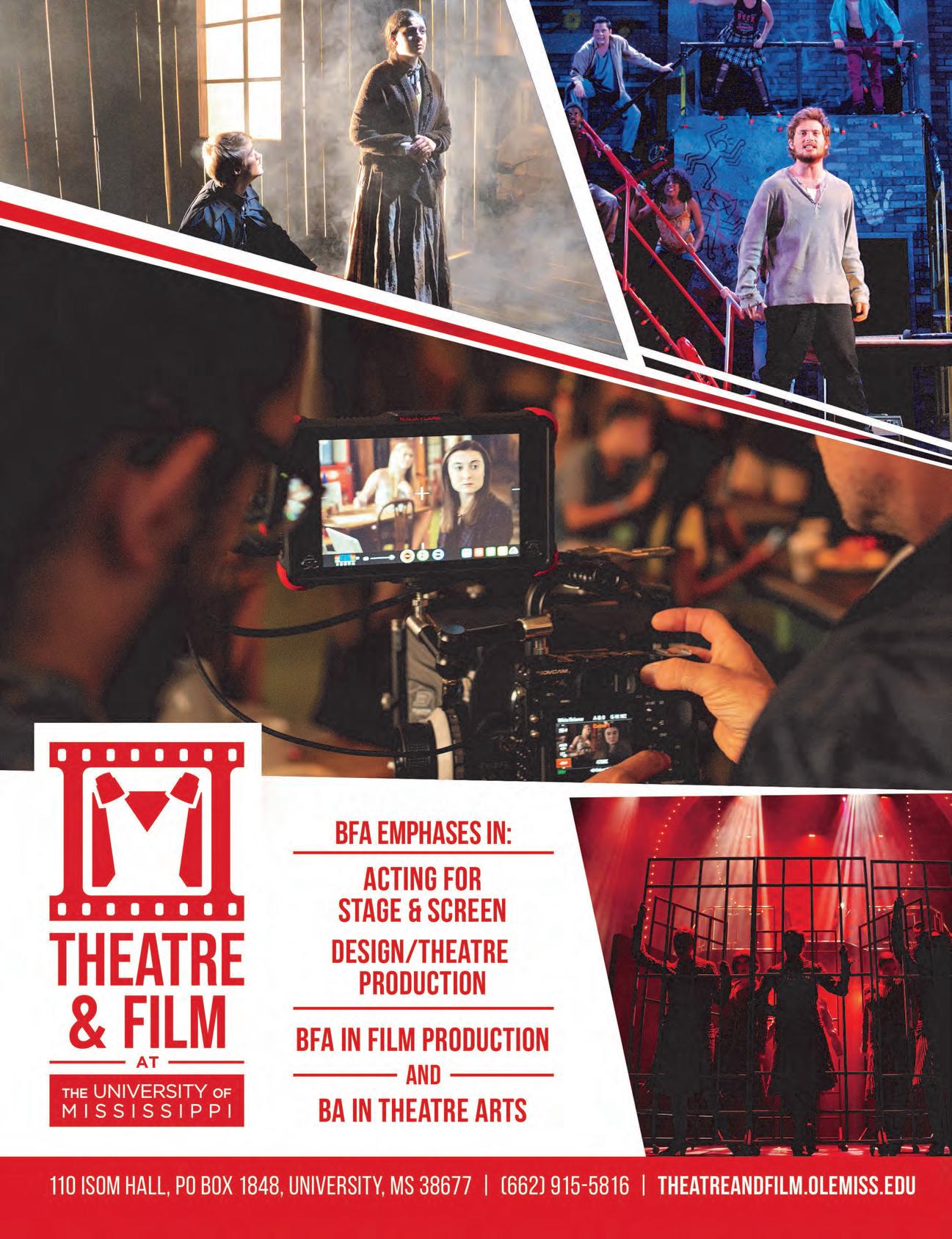

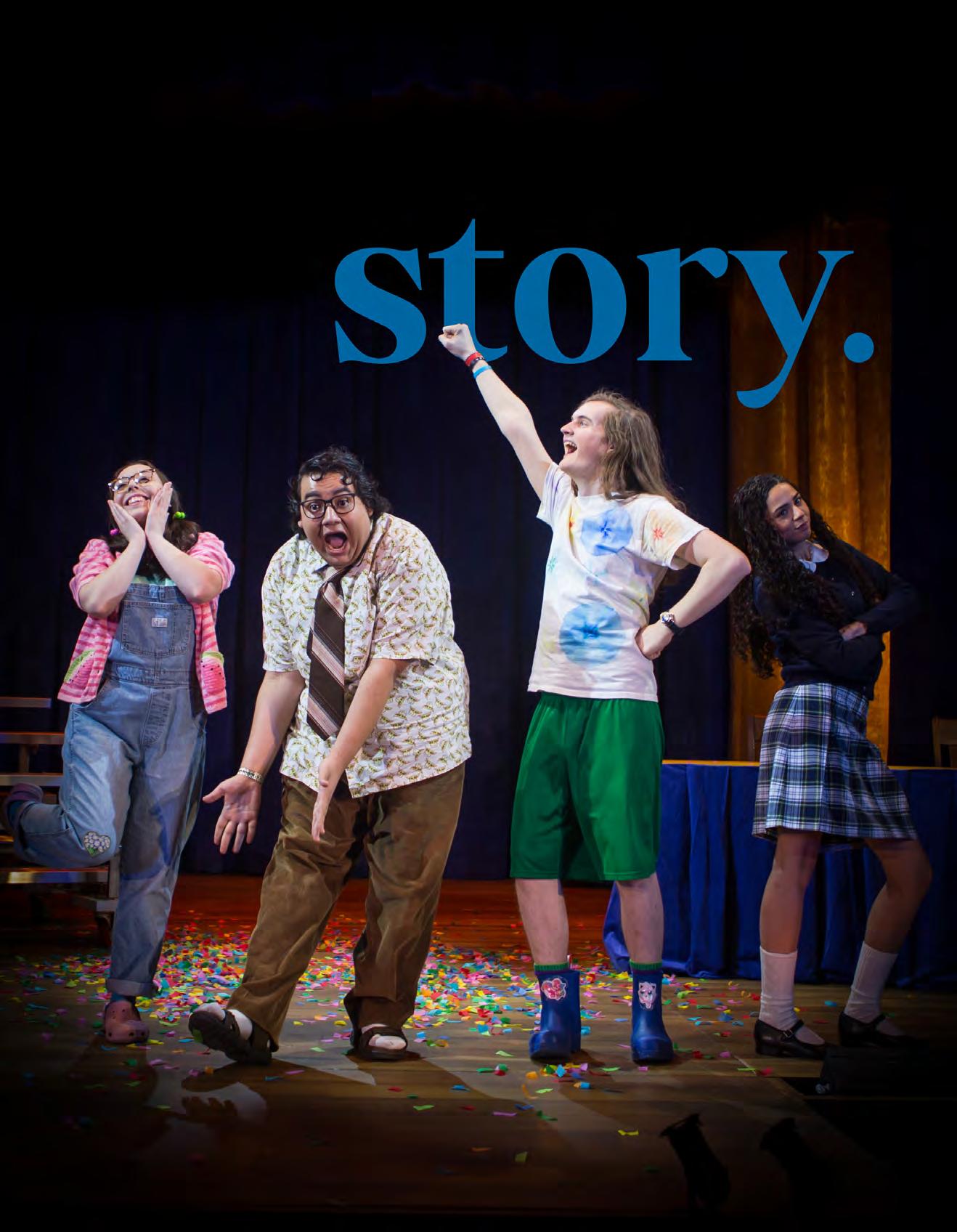


University of Mary Washington • 1301 College Ave. Fredericksburg, VA 22401 Admissions - www.umw.edu/apply • 800-468-5614 • admit@umw.edu Department of Theatre and Dance • www.umwtheatre.org • 540-654-1243 • theatre@umw.edu inspiring faculty supportive community empowering opportunities Tell your
Departments
4 Hot off the Press
When Art and Politics Collide
by Zackary Ross
6 Outside the Box: Design/Tech Solutions Reducing Your Waste Footprint: Nontraditional Fasteners Save Money, Lumber
by Michael O'Nele
66 Words, Words, Words …
Review of Stage Management Basics: A Primer for Per forming Arts Stage Managers (2nd edition) by Emily Roth, Jonathan AllenderZivic and Katy McGlaughlin
review by Stacy A. Blackburn
68 Index to Volume LXIII
Special Section
D-1 2023 SETC College, University & Training Program Director y and HBCU Director y
Find the perfect school for you in these directories, the first listing SETC member institutions and the second listing HBCUs with theatre offerings. (Special section begins after Page 34.)
Contents
Features
8 Internships
Theatre Training Programs Work to Become More Fair and Equitable
 by Stefanie Maiya Lehmann
by Stefanie Maiya Lehmann
12 An Intern’s Perspective: Brissa Lopez
16 An Intern’s Perspective: Michael DeWhatley
24 Representation
Four Individuals With Historically Excluded Voices Share Their Paths into Technical Theatre
by Jennifer Goff
36 Shared Leadership
Theatres Find An Inclusive Model Spurs More Diversity and Innovation
 by Holly L. Derr
by Holly L. Derr
52 Pandemic Productions
Which Pandemic-Inspired Changes Will Continue at Theatres, Schools?
by Scott Hayes
Cover
This photo from Virginia Commonwealth University’s 2022 production of Roald Dahl’s James and the Giant Peach was chosen from more than 90 submissions as the winner in our annual college and university cover photo contest. Shown in the photo are (top) Paige Smeltzer as Ladahlord, and clockwise from bottom middle, under the umbrella: Brandi Pleasant as James, Kiera McManus as Ladybug, Lukas D’Errico as Grasshopper, Gracie Berneche as Centipede, William Cardozo as Earthworm and Amber Fe Armstrong as Spider. The costume design by Audrey Reed won 1st place in the 2021 SETC Graduate Costume Design Competition. The builders of two of the costumes received awards in the 2022 SETC Design Competition’s Costume Technology category: Lilly Valentin, 1st place for the Grasshopper costume, and Addison Mitchell, 2nd place for the Earthworm costume. Set design is by Jeffrey Hales; lighting design is by Cat Cochran and the production stage manager was Demarco Lumpkin. (Photo by Aaron Sutten; Photoshop
Volume LXIV Number 1 l Winter 2023 l Southern Theatre – Magazine of the Southeastern Theatre Conference
work by Garland Gooden; cover design by Deanna Thompson)
Paradise Blue,
Jan
Winter 2023 x Southern Theatre x 3
City Theatre, Kristi
Hoover
When Art and Politics Collide
Our regular column on plays that have recently become available for licensing focuses in this issue on works that spotlight the clash of art and politics.
by
Zackary Ross
There are two contemporary perspectives concerning the role of the artist. The first, often feverishly shouted in Twitter comments, is that artists should keep quiet about politics and “stay in their lane.” The second is that all good art is political, and the act of making art is inherently political because artists give public voice to their privately held beliefs. Theatre literature is filled with the second perspective, works that feature a clash of ideals, where personal goals and values slam against public sentiment and characters are left to navigate the tumultuous waters between their private lives and the society to which they belong. What follows is a collection of new plays that prominently feature this clash of art and politics. To develop the following list of suggested titles, we surveyed major play publishers’ offerings during the last few months. Following each description, you’ll find information about the cast breakdown and a referral to the publisher who holds the rights.
Are You Now or Have You Ever Been ...,
by Carlyle Brown
Famed poet Langston Hughes has been called to testify before the House Un-American Activities Committee on the charges of communism leveled by Sen. Joseph McCarthy. In the late-night hours on the eve of his testimony, Hughes begins to write a poem begging his audience not to abandon him despite the confession he intends to deliver. This searing work of fiction celebrates Hughes’ poetry and literary activism, examining one of the most iconic clashes between art and politics ever known.
Cast breakdown: 6 men (one Black/African descent; 5 white/European descent)
Publisher: Dramatists Play Service, Inc. www.dramatists.com
The Michaels, by Richard Nelson
Known best for his Apple Family Plays , Richard Nelson is a playwright who seeks to capture a snapshot in time in the lives of a single family – in this case, The Michaels of Rhinebeck, NY. Rose Michael, a celebrated choreographer, has prepared a meal to share with her estranged husband
(a producer), his new wife (a former dancer), their daughter, their niece and a few family friends. As the meal is eaten, the group discusses the worlds of dance, art and politics, the very nature of America and how we as a country are perceived abroad.
Cast breakdown: 6 women (any ethnicity); 1 man (any ethnicity)
Publisher: Broadway Play Publishing, Inc.
www.broadwayplaypub.com
Alabama Story, by Kenneth Jones
It is 1959 in Montgomery, AL, and a new children’s book about a fuzzy white rabbit marrying a fuzzy black rabbit is stirring up all sorts of political controversy. Amidst the racial divide, two childhood friends – an African American man and a white woman of means – reconnect as adults and provide a compelling counterpoint to the play, which is inspired by true events. Cast breakdown: 2 women (white/ European descent); 4 men (1 Black/ African descent, 3 white/European descent)
Publisher: Dramatists Play Service, Inc.
www.dramatists.com
Follow Me to Nellie’s, by Dominique
Morisseau
Nellie Jackson operates a brothel in Natchez, MS, that is home to both Na Rose, a vocalist in a traveling blues band, and Ossie Brown, a freedom fighter seeking to secretly register black voters amidst the hostile segregation policies of the South. In this early work from one of America’s most celebrated contemporary playwrights, the author presents a poignant look at the clash of art, politics and the dreams of the individual as they come into stark conflict with the sociopolitical landscape of Mississippi in the 1950s.
Cast breakdown: 5 women (Black/African descent); 3 men (2 Black/African descent, 1 white/European descent)
Publisher: Concord Theatricals

www.concordtheatricals.com n
 Zackary Ross (he/him) is an assistant professor of theatre and the arts administration program director at Bellarmine University in Louisville, KY. He is a member of the Southern Theatre Editorial Board.
Zackary Ross (he/him) is an assistant professor of theatre and the arts administration program director at Bellarmine University in Louisville, KY. He is a member of the Southern Theatre Editorial Board.
4 Southern Theatre x Winter 2023
EDITOR
Deanna Thompson
SETC EXECUTIVE DIRECTOR
Toni Simmons Henson
SETC EXECUTIVE DIRECTOR EMERITUS
Betsey Horth
From the SETC President … From the SETC President
ADVERTISING
Clay Thornton, clay@setc.org
BUSINESS & ADVERTISING OFFICE
Southeastern Theatre Conference
5710 W. Gate City Blvd., Suite K, Box 186
Greensboro, NC 27407 336-265-6148
PUBLICATIONS COMMITTEE
Laura King, Chair, Independent Theatre Artist (GA)
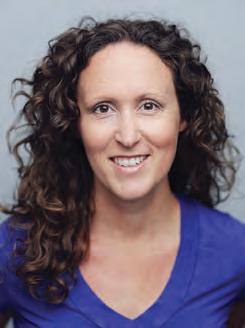
Becky Becker, Clemson University (SC)
Jennifer Goff, Centre College (KY)
Gaye Jeffers, University of Tennessee at Chattanooga
Ricky Ramón, Howard University (DC)
Chalethia Williams, Miles College (AL)
EDITORIAL BOARD
Tom Alsip, University of New Hampshire

Keith Arthur Bolden, Spelman College (GA)
Amy Cuomo, University of West Georgia
F. Randy deCelle, University of Alabama
Kristopher Geddie, Venice Theatre (FL)
David Glenn, Samford University (AL)
Scott Hayes, Liberty University (VA)
Edward Journey, Independent Artist/Consultant (AL)
Stefanie Maiya Lehmann, Lincoln Center (NY)
Sarah McCarroll, Georgia Southern University
Tiffany Dupont Novak, Actors Theatre of Louisville (KY)
Thomas Rodman, Alabama State University
Zackary Ross, Bellarmine University (KY)
Jonathon Taylor, East Tennessee State University
Chalethia Williams, Miles College (AL)
PROOFREADERS
Catherine Clifton, Freelance Copy Editor (NC)
Denise Halbach, Independent Theatre Artist (MS)
PRINTING
Salem One, Inc., Winston-Salem, NC
NOTE ON SUBMISSIONS
Southern Theatre welcomes submissions of articles pertaining to all aspects of theatre. Preference will be given to subject matter linked to theatre activity in the Southeastern United States. Articles are evaluated by the editor and members of the Editorial Board. Criteria for evaluation include: suitability, clarity, significance, depth of treatment and accuracy. Please query the editor via email before sending articles. Stories should not exceed 3,000 words. Color photos (300 dpi in .jpeg or .tiff format) and a brief identification of the author should accompany all articles. Send queries and stories to: deanna@setc.org.
Southern Theatre (ISSNL: 0584-4738) is published three times a year by the Southeastern Theatre Conference, Inc., a nonprofit organization, for its membership and others interested in theatre. Copyright © 2023 by Southeastern Theatre Conference, Inc., 5710 W. Gate City Blvd., Suite K, Box 186, Greensboro, NC 27407. All rights reserved. Reproduction in whole or part without permission is prohibited.
Subscription rates: $24.50 per year, U.S.; $30.50 per year, Canada; $188 per year, International. Single copies: $8, plus shipping.
TThis issue of Southern Theatre provides opportunities to consider how we might approach the new year differently through new perspectives on our theatrical training. Winter often brings a time of reflection, and these pages give us the chance to take what was done before and make it better for future theatre-makers.
Both the pandemic and calls for greater diversity and equity have had an impact on theatre internships. Stefanie Maiya Lehmann shares information on what students can expect going forward, based on the results of a survey of professional theatres. Two interns also share their perspectives on the value of internships – and what needs to change, in their opinion.
We also explore representation in theatre, zeroing in on behind-the-scenes roles in tech. Jennifer Goff interviews four individuals with historically excluded voices. They share information on how they paved paths in the tech field – and also provide details on what their jobs entail.
Professionals, professors, and students alike will find helpful information in a story by Scott Hayes, which looks at the world of theatre nearly three years after COVID shut down most live performance. Using comments from a survey of professors and professionals, the story outlines which changes made at the height of the pandemic continue on stage and in classrooms, and which are disappearing.
As professional theatres address both a generational shift and calls to increase their diversity, some are finding benefits from moving to a more inclusive organizational structure. Holly Derr takes readers inside eight theatres that operate under a shared leadership model.
Students who are still searching for the perfect school for their undergraduate or graduate education will find comprehensive help in the center of the magazine in our 2023 SETC College, University & Training Program Directory, which lists all SETC member institutions and provides details on the degrees they offer. Following that directory, we also include a special section this year spotlighting historically black colleges and universities (HBCUs) with performing arts offerings.
In our regular “Words, Words, Words…” column, Stacey Blackburn reviews Stage Management Basics: A Primer for Performing Arts Stage Managers (2nd edition) by Emily Roth, Jonathan Allender-Zivic, and Katy McGlaughlin. Zackary Ross provides a sampling of newly available plays that touch on the clash between art and politics in our regular “Hot off the Press” column. Finally, in our “Outside the Box” column, Michael O’Nele shares how nontraditional fasteners can help reduce your shop’s waste footprint.
SETC continues to provide a place for theatre artists to collaborate, coexist, and challenge norms as we focus on progress in the safety of community. Let these stories motivate you to work on excellence in your theatre-making practices with shared knowledge and admiration through 2023. The gratitude and growth that comes with theatrical education can inspire the next generation.
Theatre s o u t h e r n
Maegan McNerney Azar (she/her), SETC President
Winter 2023 x Southern Theatre x 5
DESIGN/ TECH SOLUTIONS
Reducing Your Waste Footprint Nontraditional Fasteners Save Money, Lumber
As the technical director, I have always tried to reuse materials when possible and recycle any material that I could. With the average cost of our lumber doubling during the pandemic, we looked at the use of several composite and nontraditional fasteners – including composite staples, composite “common” nails, and scrails –as a way to increase our ability to reuse lumber and save money.
Composite staples for facing, attaching turf
While looking for an alternative to the narrow crown staples we normally use to install our facing (typically ¼" imported birch plywood), I purchased an Omer 82P composite stapler and SH/05-55 model composite staples from Raptor Nails. I wasn’t sure if the staples would penetrate the birch plywood, but knowing that we would find a use for the staplers even if they did not work with the ¼" birch, we decided to invest in them.
The result of our experiment? The composite staples work beautifully. They perform best with the crown parallel to the interior grain, because the outer veneer on the birch ply is paper thin. We also found that you need to take care when attaching these to 1x4 frames since the crown on the composite staples is ½" wide, leaving little
6 Southern Theatre x Winter 2023
ith a growing awareness of the environmental impact that typically results from creating theatre, the artists at the University of Memphis Department of Theatre and Dance have made strides in improved sustainability in recent years. Examples of these efforts include electronic documentation for stage management, support from the University’s Green Fee grants to upgrade our house lighting to LED fixtures, and costume design graduate students creating near- zero waste costume designs.Composite staples were used to attach fake turf to homosote for a production of The Wolves at the University of Memphis in February 2022.

room for error. The crowns of the staples occasionally protrude a little bit, but after the scenic artists finish, they are not visible.
We do still glue the birch facing to the frame, as I don’t trust any wall to remain structural without glue. When the facing is removed for reuse, the glue causes the thin veneer to delaminate. With the type of birch ply that we use, only the outer layer delaminates and remains on the 1x4 frame. This allows us to reuse the sheets several times as long as the “ugly” side always faces the frame. We considered this solution successful and purchased a second 82P stapler.
We also used our composite staples to attach fake turf to homosote for our production of The Wolves. My hope was that these would hold well for the action of the play but make it much easier to pull up the turf when it came time to strike. This proved to be true. As a bonus, the composite staples are far less likely to cause an injury if they back out during a show. Over the run of the show, none of the staples pulled free. Composite ‘common’ nails for flat frames
Drywall screws are the most common fastener in theatre construction. However, I have found they aren’t ideal for flat frames
because they often cause the wood to split and are more time-consuming to attach than pneumatic fasteners.
I previously tested the use of composite “finish” nails in place of drywall screws in the construction of flat frames, but found they were too brittle to be trusted. However, I recently tried a different product –composite “common” nails – which are stronger and less likely to shear than composite “finish” nails. These are applied with a coil nailer. We are now incorporating these into our builds to further help in recovering materials from our flat frames.
Scrails for plywood decking
Another fastener that helps us reuse more wood and maintain the speed of pneumatic construction are scrails, made by Fasco. They can be installed with a nail gun and removed, like a screw, with a drill or driver. We get the speed of installing with a nailer and the recycling convenience of removing them like a screw.
the box
by Michael O’Nele outside
W
Scrails are a very good solution for installing 3/4" plywood decking on a platform. We have found that the square-drive scrails are easier to remove than the ones with Phillips-head fasteners. We predominantly use the scrail model SCWC413FPEG 11/2" x .113, which fits into our coil siding
Step-by-Step Instructions for Composite Staples
nailers, but the company has models that fit both coil framing nailers and stick framing nailers.


How well do composite fasteners hold?
I performed strength tests on three fasteners: composite nails, common nails, and scrails (11/2" long). In the test, I used two fasteners to attach an overhanging board that was 9" long, added a screw to the end, and pulled down using a hanging digital scale. To my surprise, the composite nails had the strongest hold, even with some splitting. One drawback I observed is that they fail without slipping or bending first. The metal fasteners slip/bend first (but at about half the applied weight of the composite breaking strength), but the joint has still failed at that point.



Is the extra cost of composite fasteners worth it?
If the primary goal is to reduce a shop’s waste footprint, then the answer is 100% yes. Looking purely at dollars and cents, the per-piece cost of the nontraditional fasteners is higher, but the cost of application per scenic unit ends up not being a lot more than with traditional fasteners. We found that in building a 4'x12' flat (no doors or windows), composite staples combined with scrails increased the cost of the flat by $1.14, and the combination of composite staples and composite nails increased the cost by 90 cents. That cost is roughly one-tenth of the cost of a single stick of 1x4 (currently over $11). With three
Notes on the Use of Scrails
sticks of 1x4 needed to make a 4'x12' flat, I can recycle over $30 worth of lumber off of a disassembled flat. This more than justifies the cost of the fasteners and tools needed to install them.
Bottom line
Introducing new fasteners at the University of Memphis has increased our ability to recycle many materials and ultimately had a positive impact on our construction budget. We also have seen other benefits. When lumber gets reused, metal fastener fragments can become projectiles, and if you use a Saw Stop table saw, that metal can also trigger the safety mechanism, increasing down time and adding repair costs. Composite fasteners reduce or eliminate those risks. Finally, composite fasteners benefit anyone building scenery for outdoor theatre as they never rust. n
Materials and Costs

Michael O’Nele has served as the technical director for the University of Memphis Department
He also has worked as technical director or sound designer

at a number of
Omer 82P Staple Gun 210.00 DeWalt 66C Coil Nailer 270.00 SH/05-55 composite staples (5,040) 60.00 15/8" composite nails (3,200) 106.00 11/2" scrails (2,000) 99.00 Stick for framing nailer (100) 55.00
you have an idea for an Outside the Box column? Email Outside the Box Editor David Glenn at djglenn@samford.edu for information on submission requirements.
of Theatre and Dance since 1998.
theatres.
Do
Step 1: Acquire Omer 82P and SH/05-55 model composite staples. Step 2: Glue frame and staple with composite fasteners crossing the grain. Step 3: Finish the piece with traditional scenic techniques that hide the staples. Step 4: Peel the facing off, losing the outer veneer but preserving it for future use. Total
cost: $800.00
Scrails are installed with pneumatic coil nailers (far left) but can be removed with screw guns (left).
Step 1
Step 2
Step 3
Step 4
Winter 2023 x Southern Theatre x 7
INTERNSHIPS Theatre Training Programs Work to Become

More Fair and Equitable
by Stefanie Maiya Lehmann
Photo courtesy of Jobsite Theater
At the age of 20, after finishing my first year of college, with one month’s notice, I packed an overstuffed suitcase and hopped on a plane to New York City. I dove headfirst into a summer internship at a dream company where I worked long hours and was solely paid in MetroCards and experience. Those three months were exhausting, but without a doubt, they changed my life and paved the way for my entire career. In exchange for 12 weeks of grueling intern labor, I had doors easily open for me during every summer that followed. I thrice returned as a full-time seasonal employee to the same company that started it all, the same company that hired me as soon as I completed graduate school and has kept me happily employed ever since.
But there is also a dark side to internships. For every positive story like mine, there is a nightmarish tale of unsafe workplace practices and abusive treatment of interns – treatment that would not only be intolerable if it was done to an employee, but also illegal.
Just as importantly, there is an undiscussed story of inequity that is systemic to the internship concept. I was privileged to be able to take an unpaid internship; many cannot afford to do so.
In recent years, theatrical internships have come under fire for those reasons and more. Websites and Facebook pages such as Lift the Curtain called for change during the pandemic, and theatres have begun taking note of the inequity of asking interns to work for free or at very low salaries and to endure “grunt work” rather than benefit from on-the-job learning about theatre.
The pandemic shutdown of live theatre and the related financial challenges further impacted internships, with many theatres scaling back or putting their internship programs on hold.
So, what will students looking for internships find going forward? In the pages that follow, we share the thoughts of company representatives who participated in a Southern Theatre survey, as well as the perspectives of two past interns on their experiences and what needs to change.
Survey on theatre internships
In summer 2022, Southern Theatre magazine reached out to companies in the SETC database with a survey on the state of internships. A total of 58 companies that employ interns responded. Of those, one-third employ 1-3 interns, one-third employ 4-10 interns and another third employ 11-20 interns each – with the exception of one single organization that employs over 21 interns annually.
Most of the companies that responded (46%) said their internship programs have remained the same in
recent times, while 10.8% said their programs have been put on hold – with most noting the pandemic and related financial issues as the reason. The remainder of the companies were evenly divided on recent changes in their programs, with 21.6% saying their internship programs had decreased in size and the same percentage saying their programs had increased.
Interestingly, concerns about providing adequate pay and valuable work opportunities to interns factored into both increases and decreases in
one of the theatres that has moved from an internship program to an apprenticeship program in recent years.
Winter 2023 x Southern Theatre x 9
A
OPPOSITE PAGE: Jobsite Theater in Tampa, FL, is
Apprentices Maxwell Allen (left) and Chase Reeder (middle) work alongside carpenter Nick Noelte (right) on the first day of load-in for Dracula, presented in fall 2022.
Global Languages and Theatre Arts


programs. As one company manager noted, “our internship program was put on hold during COVID and has now been brought back in limited capacity. Because we want to prioritize being able to pay at least minimum wage to our interns, we are hiring fewer.”
Similarly, Stages Theatre in Houston, TX, has reduced the number of interns it hires, revamped its program and adjusted its pay structure.


“We gave the program more focus, hired trained mentors for interns, and hired fewer total interns with greater accountability for them – and clearer expectations of them,” said Kenn McLaughlin (he/him), artistic director at Stages.
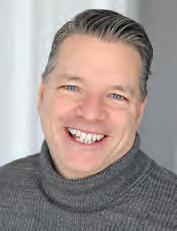
The company also adjusted interns’ compensation structure to match rates for similar roles in the company – in essence, less quantity but more quality, a step that McLaughlin believes will be essential for internship programs in the industry to continue.
“Theatres will need to focus their efforts to truly offer the education and experience equal to the value given – and to pay fairly for that value,” McLaughlin said. “I think internships offered in this way will allow the field to thrive and grow.”
Among the theatres that have increased their internship programs recently is Children’s Theater of Madison (CTM) in Wisconsin, which added internships in more departments while also working to ensure that students truly benefit from the jobs they are assigned.

“We have made all of our internships goal-focused, so interns are able to name their goals at the top, work toward them
during their internship, and check in with their supervisor about them after their internship is complete,” said Erica Berman (she/her), CTM’s director of education.
Brevard Music Center/Janiec Opera Company in North Carolina “increased the stipends our interns are paid by 100% in 2022, and we anticipate another significant increase in 2023,” according to Andrea Boccanfuso (she/her), director of production. “The interns are expected to learn the trade by shadowing industry professionals and learning/working alongside skilled staff members.”
A to Z Theatrical Supply and Service, which provides theatres with services ranging from costume rental to scenic design/construction, also has increased its internship opportunities, partly due to “a change in our management,” said Dylan Bollinger (he/him), manager of the Production Department.
“Our new management has a background in education and views bringing on emerging professionals as paramount for company growth,” Bollinger said. “Our interns are brought on as production associates. They work under our lead installers and area specialists on projects. As a general rule, interns are treated as full-time temporary employees at our company.”
Many theatre representatives stressed the importance of changing the internship model so that interns are paid an adequate salary and given jobs that prepare them for work in theatre.
“So many theatres rely on intern power as part of their operations model,” said one theatre representative who did not want to

BA/BS Theatre BA/BS Theatre/Film BA/BS Musical Theatre Murraystate.edu/theatre
Dylan Bollinger Kenn McLaughlin
Andrea Boccanfuso Erica Berman
10 x Southern Theatre x Winter 2023
School of Theater, Film and Media Arts

THEATER AT TEMPLE

more information: (215) 204-3209 or tfma@temple.edu
For
tfma.temple.edu
Chair & Head of Scenic Design Fred Duer Head of Costume Design Marie Anne Chiment Head of Directing Marcus Giamatti Head of Theater Studies David Ingram Head of Technical Production & Management BFA Andrew Laine Head of Theater Education & Stage Management Matthew Miller Head of Lighting Design and Projections Jason Norris Head of Musical Theater BFA Peter Reynolds Head of Acting Donna Snow Head of Urban Theater & Community Engagement K. Williams-Witherspoon
@templetheaters BA Theater Studies Acting Directing Design & Production BFA Musical Theater Technical Production & Management BA + M.Ed Theater Education
An Intern’s Perspective
Brissa Lopez (she/her) High School Drama Teacher Atlanta, GA, Metro Area

How have your internship experiences impacted your life (good and bad)?
I have interned at three top children’s theatres. I was a young first-generation college student excited to work in my field, determined to make ends meet. My low-income grandparents worked extra shifts to provide me with the resources to move to these cities and make a mark for myself. At the time, I thought to myself that I was lucky to be in the room. I ignored the snickers of other interns or employees of the theatre and told myself that I deserved to be there and I wasn’t a token. And I proved that time after time. I excelled in teaching and absorbed everything I heard and saw. I found a way to make ends meet despite not being properly compensated.
Looking back now, I realize how problematic their business model was. These theatres are bringing in interns to teach their summer camps, camps that bring revenue the theatre needs to survive. The labor of these interns is helping to pay the full-time employees and fund the theatre’s programming and shows. Yet their interns aren’t compensated enough to survive. Many have to take on second jobs and/or put their families in difficult financial situations to support them.
At my first internship, a prominent theatre encouraged us to apply for food stamps because they were aware that we wouldn’t be able to survive without them. I didn’t apply, but many of my peers did. I am certain it never crossed their mind the trauma associated with food stamps for their POC interns. At my next internship, the stipend went up, but they didn’t provide housing. The spring before my internship, I took an additional job to save money to be able to live and survive in that expensive city. After graduation, I moved to another city where I still didn’t make enough as an intern/fellow to pay my student loans. Not only did I have to take up an additional job to survive, but I had to ask permission from my theatre because they felt entitled to my time.
At each inter nship, there was a common theme of not having enough representation. I would advocate and try to bring solutions, and at two out of three internships, I became the problem. I was the intern who couldn’t be satisfied with the status quo and whose white male boss felt threatened by that.
What do you believe the future of internships should be for our industry?
Every person in the theatre industry deserves to be compensated at a livable wage. If a theatre cannot afford to adequately pay all of their employees, then they need to reassess their business model. And no theatre should feel entitled to their employees’ lives. Yes, theatre is our passion, but it is not healthy for it to be life-consuming.

How can companies better face the equity issue of internships?
If a theatre is relying on unpaid work to survive, they need to reassess their budget. Any other thoughts you would like to share?
I learned a lot at each theatre, and I’m thankful for the time I spent learning from so many great artists. It is time for theatres to invest in having adequate resources and support for their interns of color. Typically, they come from low-income households and have to jump through more hoops to be in the room and to stay in the room. Interns of color shouldn’t be taken advantage of or ridiculed for advocating for themselves. As an educator today, I believe in equipping my high school students to ask for what they need. It is our job in the education field to listen and to provide. I know these top children’s theatres believe in putting the needs of children first, but somewhere along the way they have forgotten that the interns they hire were children just a few years prior.
12 x Southern Theatre x Winter 2023
be identified. “Fortunately, the old-school way of treating interns (especially resident interns) with overwork and next to no pay is dying out and newer, better models are evolving.”
Internships: then and now
The concept of internships arguably can be traced back 4,000 years to ancient Egypt. Internships, or apprenticeships, as they are commonly called outside of the United States, were so important to society and commercial interactions that there are references to them in Hammurabi’s Code (circa 1792–1750 BC).
Greek philosopher Aristotle (apprentice to Plato, who was the apprentice of Socrates) wrote about the importance of techne and praxis, two key features of internships. Techne is about craftsmanship and the value of making or doing, as opposed to intellectual or academic understanding. Praxis is about combining practice with thoughtful reflection. This “‘learning-bydoing” methodology is the cornerstone
of the continued value of internship opportunities.

In the United States, the practice of apprenticeship came over with the settlers. The concept of an unpaid internship was officially recognized in the 1940s by the U.S. Supreme Court, when the court ruled that railway workers who were members of a training program were not guaranteed pay. The subject went relatively undebated until the mid-2010s. Following a controversial 2013 lawsuit filed by a group of unpaid interns against Fox Searchlight Pictures, and a judgment referred to often as the “Black Swan” ruling, the U.S. Department of Labor (USDOL) changed its formerly rigid six-criteria test to a more loosely applied, flexible seven-factor test to distinguish employees from interns.
The test is ultimately aimed at determining the “economic reality” of the intern–employer relationship and whether the internship is primarily for the educational benefit of the intern or the financial benefit

• COLLEGE STUDENT PACK • EDUCATOR PACK BROADWAY BOOK CLUB bwaybookclub.com
Winter 2023
13
Southern Theatre
of the employer (Read online at www.DOL. gov: “Fact Sheet #71”).
Although this is the standard reference for all employees, this seven-factor test technically only applies to for-profit companies, meaning it may not affect interns working for nonprofit theatres. The USDOL states that “unpaid internships for public sector and nonprofit charitable organizations, where the intern volunteers without expectation of compensation, are generally permissible.”
The bottom line from that: Those hoping to get internships need to understand that they can either be paid as an employee,
and hours of work, and clear identification of unpaid or paid status and policies, such as those related to reimbursement or insurance coverage for workplace accidents and injuries.
In his survey response, Garry Lee Posey (he/him), founder and executive artistic director of the Ensemble Theatre of Chattanooga (TN), underlined the importance of both intern and employer having a clear understanding of their agreement. Posey identified “actual opportunity vs. presumed opportunity” and “clarity of expectations” as what is most important.
Many theatre companies with intern-



is important that the intern has an advisor actively involved and collaborating with the work being done.
Addressing inequity
The nature of the internship model –often offering no pay or a stipend – fosters systemic issues with equity and access. It can unintentionally create a socio-economic divide where students from more financially stable families or who are already benefiting from scholarship support are much more likely to feel secure enough to pursue an internship and thus are more likely to benefit by receiving future employment opportunities.
FROM THE AUTHOR OF Playwriting with Purpose
Writing Adaptations and Translations for the Stage A NEW BOOK PERFECT FOR INDIVIDUAL OR CLASSROOM STUDY!

Writing Adaptations and Translations for the Stage is the newest book from award-winning playwright Jacqueline Goldfinger, coauthored with Broadway Dramaturg Allison Horsley. It includes writing exercises, case studies, interviews, and more. "This book gives you courage to start writing and keep writing. It looks at adaptations from all angles, while prompting and nurturing your own unique approach. It's for the novice, the experienced, the student, the professor, and everyone in between." -Elena Araoz, Princeton University. Available now where ever books are sold.
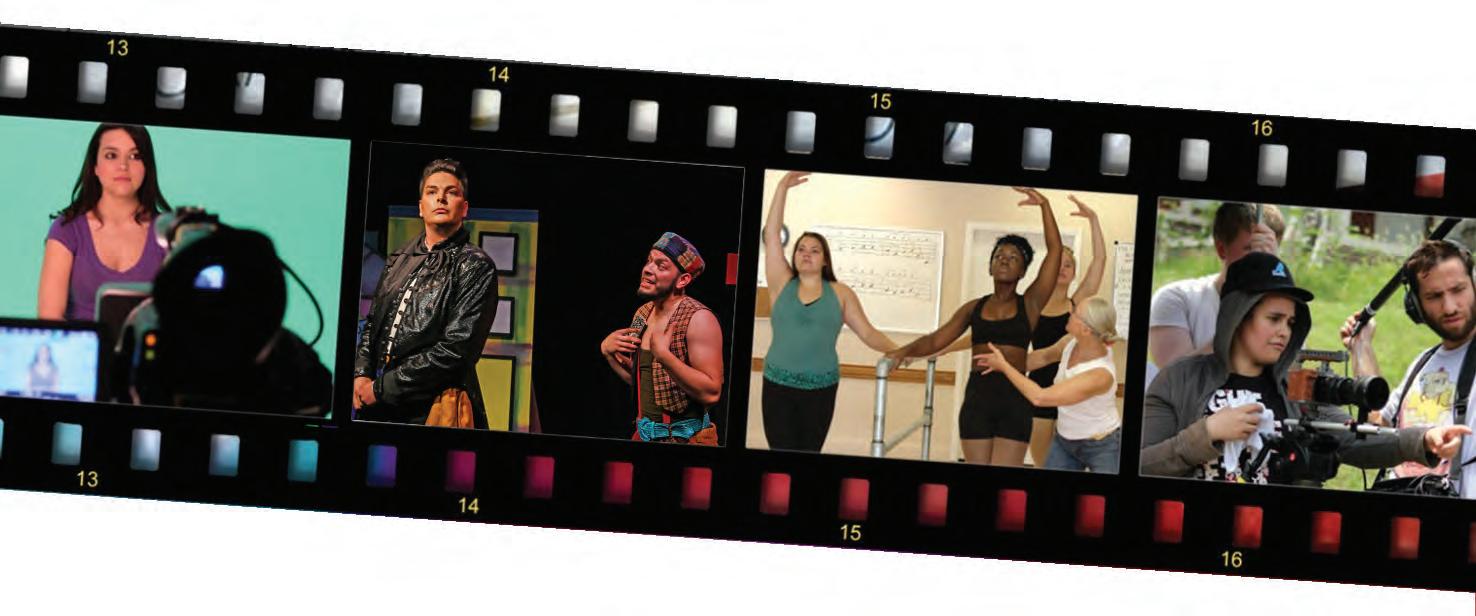
14 x Southern Theatre x Winter 2023





Associate of Applied Arts Degrees Acting Musical Theatre Filmmaking KD Conservatory offers Associate Degrees in Acting, Musical Theatre and Filmmaking. KD Conservatory is accredited through NAST. Financial Aid is available for those who qualify.
An Intern’s Perspective
Michael DeWhatley (he/him) Ph.D. Candidate in Performance as Public Practice, University of Texas at Austin

How have your internship experiences impacted your life (good and bad)?
I've had six internships at four theatre companies, including one I took 10 years into my career as part of a requirement for a portfolio in my graduate school program. These internships were deeply practical, perfectly designed for people who think that the only way to learn something is by doing it. They led directly to my first paid jobs in theatre and transitioned into a career that had the kind of stability and compensation that most artists and administrators struggle to find. My internships taught me a great deal about self-advocacy, mentorship and the importance of setting personal and professional boundaries. I learned about being the best production manager I could be, how to interact with actors in a rehearsal room, the delicate power balances of artistic collaborators, and how networking (oh, that most nebulous term) could be a source of joy or despair. However, most of these lessons were not taught to me in a proactive way, but were things I picked up piecemeal as I stumbled (at times very badly) through my beginnings. These experiences worked for me, but they didn't work for many of my peers, and internships need to undergo a process of equitable transformation along with the rest of the theatre industry as we search for ways forward.
What do you believe the future of internships should be for our industry?
As I was making a difficult decision about a summer internship, which promised to be unpleasant and at a theatre company known for rigorously exploiting the energy of its interns, I asked for guidance from a mentor. I clearly remember them saying to me, “Well, you can do anything for three months.” I think the future of our industry has to be the creation of internships that: 1) prioritize opportunities for people from historically marginalized communities, 2) are truly dedicated to the education and training of those people, and 3) provide an atmosphere of explorative joy rather than exploitation commiseration. As our industry reimagines these programs, we should focus on sharing and magnifying the enthusiasm and passion of people who are signing up for these internships, rather than throwing cold water on them.
How can companies better face the equity issue of internships?
I'm coming into this conversation as a straight, able-bodied, cisgender, white man, so I'm not sure I have the life experience that is best directed to answer this question. That said, what I have heard in my internship experiences is that compensation, actual mentorship and recruitment strategies need the most transformation, in that order. For internships to be more equitable, they have to provide a living wage for people who are either pausing their academic education or have completed high-level training to do those internships. Full stop. Part of my understanding of equity also involves providing differing and necessary levels of support for people based on where they are in their career journey. This means having mentors who are willing to adapt plans for the season and respectfully work with people who may come into their internships with various levels of knowledge and experience. And of course, recruiting for internships at historically white conferences and job fairs leads to predominantly white candidates. Any other thoughts you would like to share?
I know that some people feel that theatre internships only feed more people into a human meat grinder of an industry, but I believe that internships allow theatres to work with the individuals who may be best situated to provide the new perspectives theatres need to transform themselves into more anti-racist and sustainable organizations. Growing our field means caring for those most excited and ready to join it.

May 30 – June 25 2023 Lenox, Mass. Learn more at SHAKESPEARE.ORG/ACTOR-TRAINING or email training@shakespeare.org Olivia Merritt,
Shakespeare Intensive, 2022.
Center for Actor Training 2023 SUMMER SHAKESPEARE INTENSIVE
Summer
Photo by Christina Lane.
16 x Southern Theatre x Winter 2023
of theatre internships, a number of survey respondents said they expect them to continue as long as theatres work to make internships paying jobs and open the doors to more diversity.

“They will need to make more money – interns no longer have the ability to put their lives on hold to work for the summer for little money,” said Boccanfuso.
Lindsay Schmeling (she/her), resident costume designer and co-intern coordinator at Playhouse on the Square in Memphis, TN, believes theatre internships will continue “as long as they are paying. Unpaid labor can never be justified.”

A theatre working to improve its diversity must ask itself: Is my company’s internship program helping or hurting efforts to improve workplace equality?
One theatre that is working to make a difference in that area is Jobsite Theater in Tampa, FL, which is actively seeking candidates from historically marginalized groups, David M. Jenkins (he/him),



producing artistic director, said.
“[Jobsite] provides access to this field with pay, which we hope helps level the playing field and pays dividends in the future,” he said. “We’re finding here locally that the universities and high school theatre programs are not exactly that diverse, and so we’re not seeing those folks come out and into the workforce. We’re also learning that folks from historically marginalized populations do not have access to training programs because of economic reasons: either no tuition money, or if they have the ability to cover tuition, theatre is deemed as
a ‘bad idea’ to spend it on … In short, this system, our system, has basically helped create the makeup of the workforce we have, and so the only way to really disrupt that is to try to help be part of the solution.”
Jobsite pays hourly wages, “hopefully training a more diverse workforce,” Jenkins said.
Berman also noted the importance of a livable wage in making it possible for diverse students to pursue internships, saying she hopes “internships will be provided with ample funding so that these learning opportunities are more accessible.”

Berea College Department of Theatre & Film CPO 2148, Berea College Berea, KY 40404
Urinetown: The Musical! April 2022. Photo by M. Meadors
vPerformance, Design, and Directing Opportunities on the Mainstage! vA Diverse Learning Community! vInternational Travel Opportunities! vConference Travel Support!
Urinetown: The Musical! April 2022. Photo by M. Meadors
Garry Lee Posey
Todd Davison
Winter
17
David M. Jenkins Lindsay Schmeling
2023 Southern Theatre
George Hamrah (he/him), director of production at Orlando Shakespeare Theater, which put its internship program on hold until it’s clear the pandemic is over, thinks it’s only a matter of time before unpaid internships end.

“Internships will evolve into entry-level theatre jobs at an hourly salary,” Hamrah said.
Todd Davison (he/him), artistic director at Maples Repertory Theatre, an Equity theatre in Macon, MO, had a similar vision of internships’ future: “They are a continuing valuable source of people and training, but will be more job-like.”
Meanwhile, Bollinger said he is concerned that as the industry emerges from COVID, there may be backsliding to the “toxic environment” that existed prior to COVID: “Specifically low pay, overworking young students, and poor living conditions. During COVID, I was encouraged by our community taking a stand for adequate compensation and being treated with
dignity and respect. As our industry begins to re-saturate with emerging professionals, there’s a concern that theatres will put budgets over human beings. My company refuses to step backwards and will continue to pay our staff a living wage and provide the work-life balance to sustain a staff.” What’s in a name, no more grunt work
Some strongly believe that another key to fixing internships is to return to the original concept of apprentices. Traditionally, an apprenticeship refers to the assignment of a novice to gain in-depth knowledge and hands-on experience under the guidance and direction of an expert. Apprentices aren’t meant for quick, surface-level learning or to sweep floors and make coffee. An apprenticeship is about working on a vocation side-by-side with veteran craftspeople.
Although some companies conflate internships and apprenticeships, the USDOL says the two terms differ, in that
internships are usually for a few months, while apprenticeships last a year or more; interns don’t necessarily have a specific training program and a mentor, while apprentices do; apprentices have paid experiences often leading to full-time work, while interns often are unpaid and have no guarantee of a future job; and apprentice programs often lead to a credential, while internships do not.
One surveyed company representative wrote: “I think we’ve already seen a shift from internships to apprenticeships, and that shift will continue. The days of unpaid or hardly paid internships need to come to an end.”
Jobsite Theater is an example of a theatre company that has shifted its programs over time from internships to apprenticeships.

“We call our interns apprentices,” said Jenkins. “This is an apprentice industry. It always has been. ‘Intern’ carries a stigma, well, several stigmas. I don’t think I need to tell anyone what those are.”



Act With Purpose
TODAY:
APPLY
regent.edu/apply
18 x Southern Theatre x Winter 2023
INNOVATE. EXCITE. TRANSFORM.
We can only shape art if we understand and embrace the community around us. In the School of Theatre & Dance, experiential education programs like WildWind Performance Lab and The Marfa Intensive amplify a diversity of identities, perspectives, and histories to encourage transformation.


LEARN MORE AT THEATRE.TTU.EDU

TM
At some companies, interns are automatically assigned what is known as “grunt work.” These are boring, laborious and typically undesirable tasks. Jenkins argues that internships should be used for “real on-the-job training, not just ‘go-fering’ or providing cheap manual labor.”
He notes that apprenticeships at Jobsite run for at least a season, from September to July. The apprentices work in a specific area (producing, scenic, stage management, acting) and are assigned a mentor. Starting pay is $15 per hour.
“Due to the size of our company and nature of our business, we can’t guarantee future employment,” he said. “However, we have certainly advanced many to regular work.”
Although they still call their programs internships, others who responded to the survey also described their programs as much more than “go-fering” exercises.
“[We let] them work in a variety of areas and take ownership of a project,” said Sandra “Sam” Hahn (she/her), technical producer for Cumberland County Playhouse in Tennessee. “Our production interns are given assignments as designers for a children’s show.”

Like many others, Ginger Poole (she/ her), producing artistic director at Mill Mountain Theatre in Roanoke, VA, and SETC secretary, believes that theatre internships going forward need to offer “competitive pay, full travel, housing at no cost, and true work experience – not grunt work.”


Lyn Dickinson (she/her), executive director of Theater Delta, based in North Carolina’s Triangle area, which develops

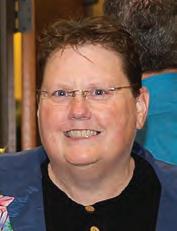
interactive theatre for social change, also says internships must be focused on meaningful work.
“It is important for students/interns to understand the value their work contributes to the program as a whole, not just for this task, for this week,” Dickinson said. “If a theatre program is to be inspiring for its audiences and community, it must inspire all who contribute to its success. Additionally, learning firsthand to appreciate teamwork and humility can foster excellent leadership among interns as they move forward in their careers.”

Mentorship and networking
They say it’s not what you know, but who you know. A good internship does more than simply provide work; it also builds a valuable network for young professionals entering the workforce. Whether it is providing a single, richly invested mentor or the opportunity to mingle in various roles and departments, the early relationships formed while an intern can enhance your career.
An internship, Berman said, should provide opportunities to “grow a professional network, observe and work with professionals … Q&A with local professionals … learn industry best practices, meet other emerging professionals and collaborate with them, partner with a mentor to identify internship goals, and receive feedback during one-on-one check-ins and overall support.”
It is vital to have a “well-trained, experienced staff member with a very positive attitude about the program and adequate time to coordinate and supervise the intern program,” said Denny Hitchcock
Sandra “Sam” Hahn
Mandi Broadfoot
Lyn Dickinson Ginger Poole
20 x Southern Theatre x Winter 2023
CONVERSE CREATE CRAFT
• Fully accredited by the National Association of Schools of Theatre

Scholarship and internship opportunities
•
•
BA
Theatre Management
Minors in Theatre and Dance
334.844.4748
Photo by Jeff Etheridge
auburnuniversitytheatre.org
• BFA
• BFA
• BFA
•
•
•
The Auburn University Department of Theatre and Dance is dedicated to the education and professional training of theatre artists, scholars, and audiences within a liberal arts environment. We champion the interaction between theory and practice and produce citizen artists who advocate for the arts through their own work in local, national, and international communities. AUBURN UNIVERSITY DEPARTMENT OF THEATRE AND DANCE
Design/Technology
Performance/Music Theatre
Theatre
State-of-the-art production facilities
Strong alumni network
utc.edu/theatre





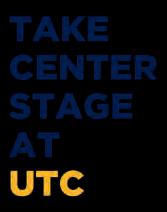




(he/him), executive producer at Circa ‘21 Dinner Playhouse in Rock Island, IL.“I will not accept an intern if I don’t believe the person supervising will have the qualities and experience I’ve mentioned.”
In addition to what is learned formally on the job, staff mixers and coffee dates offer a valuable opportunity for interns to learn about the “big picture” of how a company functions as well as learn what positions might be of interest in the future.
Opening more doors
So, what is the value of internships when it comes time to look for a fulltime job? When interviewing applicants for staff positions, 86.5% of responding companies said they consider internship experience as “somewhat important” to “very important.” The strongest response to Southern Theatre ’s survey came when companies were asked if they have hired individuals who previously interned with their organization. An overwhelming 92% of responding companies said yes.
So, there is no question internships ultimately lead to jobs. The question is how internships can become more inclusive. Like many in the field, Mandi Broadfoot (she/her), managing director of Making Light Productions in Tallahassee, FL, envisions internships opening the door for a more diverse array of students to explore how they might fit into the workings of a theatre.
“I hope the future of internships will be using them to create more gateways for entrance to the field,” said Broadfoot. “To allow more voices to be heard, and to pave the way for employment to creative artists who might not have had the opportunity to follow a traditional path into the theatre profession.” n

Stefanie Maiya Lehmann (she/ her) is the Lincoln Center’s associate general manager of performance and campus operations in New York City and a member of the Southern Theatre Editorial Board.
 22 x Southern Theatre x Winter 2023
22 x Southern Theatre x Winter 2023

REPRESENTATION
Four Individuals with Historically Excluded Voices
Share Their Paths into Technical Theatre
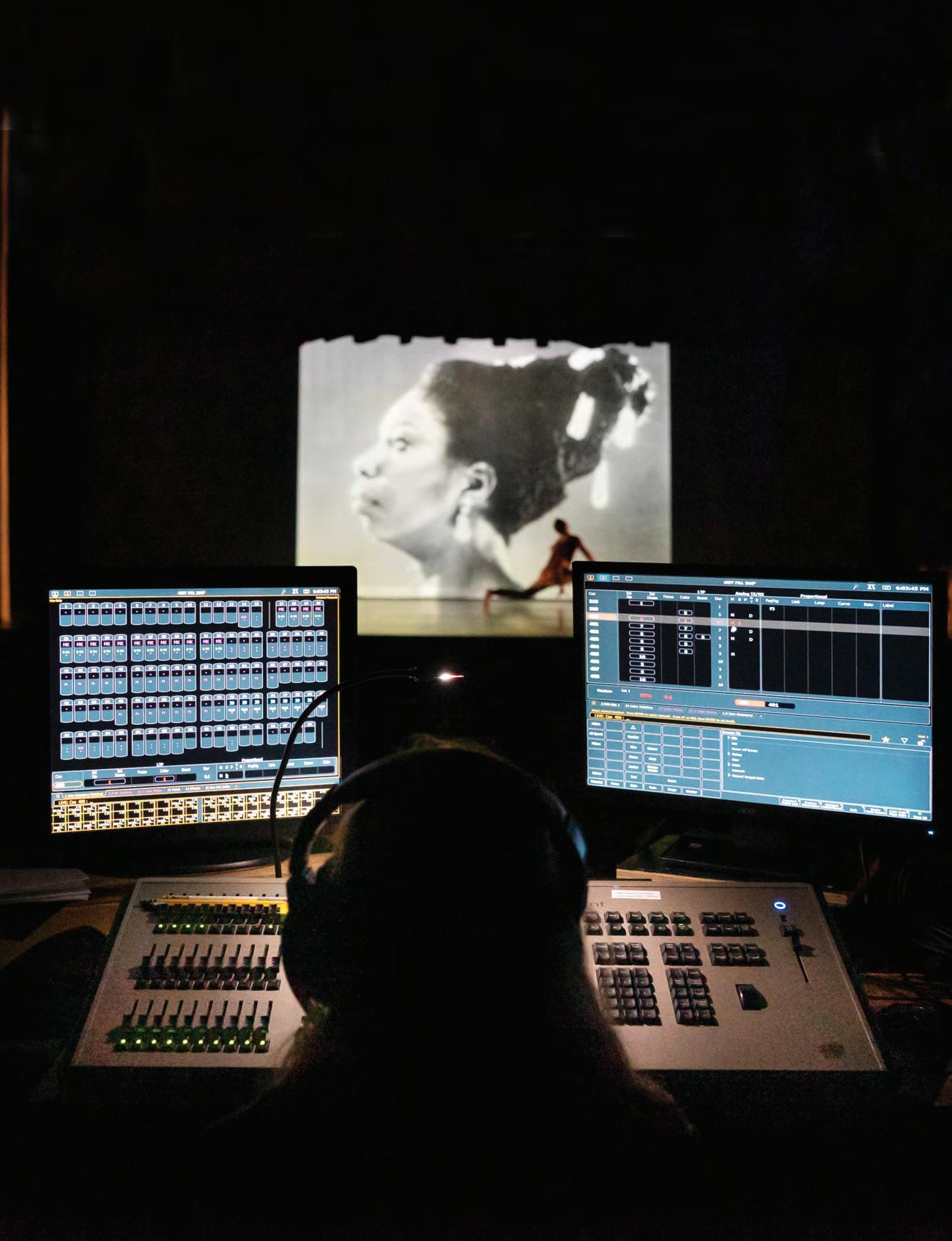 by Jennifer Goff
Porfirio Solorzano
by Jennifer Goff
Porfirio Solorzano
How does one measure representation in the theatre?
In 2002, the New York State Council on the Arts released their “Report on the Status of Women: A Limited Engagement” in which they explored primarily the dearth of women playwrights and directors on American stages. (In the seasons studied, women directors topped out at 23% and playwrights or playwriting teams that included women at 20%.) This report, though certainly not the first of its kind, was a significant touchpoint in early 21st century theatre on the road to recognizing the numerous ways in which a variety of voices and identities have historically been excluded from the theatre. But representation does not stop with playwrights and directors.
In 2006, The Asian American Performers Action Coalition began their annual tracking of “Ethnic Representation on New York City Stages,” casting a spotlight on not only the plays written and directed, but the roles within those plays, as measures of diversity, difference and equity. Their 10th anniversary report on the 2015-2016 season noted that 36% of roles on Broadway were occupied by minority actors – a record high over the decade. But representation does not stop with actors.
In 2015, Porsche McGovern published what would become the first in a nearly annual installment of data tracking the gender breakdown of lead creatives working in LORT theatres across the country. The study, which started out tracking male/female representation and has grown to measure representation based on pronoun, noted the unsurprising fact that, in all design areas except for costume design, men continue to be overrepresented. In the 2020 iteration of this report, McGovern notes that, “Of the 15,311 design positions, 68.9% were filled by he designers, 31.0 percent were filled by she designers, 0.1 percent were filled by they designers and less than 0.1 percent were filled by she/they designers.” But representation does not stop with designers.
In September 2021, USITT published a study in partnership with SMU DataArts that attempted to parse demographic distinctions within “Entertainment Design & Technology” positions. As this data was collated through a survey process rather than through assessing public bios (as is McGovern’s process), they gathered more intricate data sets, breaking down distributions in a variety of positions by gender identity, age, ethnicity and sexual orientation. In every field, at least 79% of the respondents in every role identified as white, and at least 52% of respondents in every field identified as male (except, again, in costume/ wig and makeup design and technology).
The behind-the-scenes leaders in tech hold perhaps some of the least widely known positions in the theatre. Even the stagehand who executes a flawless scene change is more visible to the average audience member than a master electrician or a technical director. And there’s the old adage that you only ever notice a stage manager when something goes wrong. The invisibility that is built into the technical positions that do so much of the heavy lifting in creating theatrical magic may well be one of the greatest barriers to establishing greater representation in those fields.
Representation matters: Meet four tech workers who broke barriers.
On the pages that follow, we feature individuals with historically excluded voices who have succeeded in some of these “invisible” tech jobs: a woman who has worked for years in the field of audio; a Black man who is a production manager; a trans, multi-racial man who trained as a technical director and works in a variety of roles; and a woman working as a head electrician and stagehand. They share what their jobs encompass, the challenges they have faced, and advice for others who aspire to hold similar roles.
OPPOSITE PAGE: A University of Alabama student operates the lighting console at the dress rehearsal for the Alabama Repertory Dance Theatre’s Fall 2018 production of Essentially Nina, choreographed by Lawrence M. Jackson. Those working in tech positions in theatre have traditionally been mostly white and male, but the field is beginning to become more diverse.
Winter 2023 Southern Theatre 25
WEDEL
Please describe the work you do in your current position.
I run the Audio Department at Baltimore Center Stage (BCS), which includes everything from planning and budgeting seasons to working with the sound designers on each production to help fully realize their designs. In addition to our mainstage shows, BCS also produces smaller events, and we have countless rentals and events all over the building that I ensure are staffed and set up for the event’s sound needs. I am responsible for hiring audio staff and overhires for the season. As the audio director, my scope also encompasses a lot of interdepartmental needs, such as maintaining the stage managers’ cube and the building’s complex paging, monitoring and lobby systems. I also manage BCS’s inventory of walkie-talkies, which are on an FCC license, as well as maintain other vital access programs like Assisted Listening and Audio Description. I am also the COVID safety manager for BCS with a small team of other certified officers. How did you get into your line of work?
I fell in love with theatre early on when I saw Annie at 5 years old. I didn’t really know it was something I could do for a living until high school, and since I am a horrible actor, I ended up gravitating to the more technical aspects. I went to a small private liberal arts college, Monmouth College, where I was given the freedom to really explore all the tech aspects of theatre. I would design lights quite often and sets as well; however, I would always revert to running sound for productions because it was more exciting than running the light console. (Sorry, lighting friends.)
I thought I would go into lighting or set design, but everyone always wanted me for sound, due to my experience running it. I took sound internships at Starlight Theatre in Kansas City, MO, and Berkeley Rep. I then went to Actors Theatre of Louisville (ATL) for two years, where I was the assistant audio engineer. I met my mentor, Marty Desjardins, and learned so much about systems and how they worked. I always felt that when sound became pushing a button that it would be the end of my board op days.

When I moved on from ATL to the Dallas Theater Center (DTC), that is exactly what happened. I spent four years at DTC as the sound supervisor, where I was able to really
 AMY
AMY
(she/her)
Audio Director Baltimore Center Stage, Baltimore, MD*
26 x Southern Theatre x Winter 2023
* Since this interview was conducted, Amy Wedel has moved to a new position as a project manager for CMI AV, an event technology firm.
work on how to manage a department and work with designers and directors to achieve their vision.
I moved to Baltimore and began my journey as the audio director in the fall of 2003, and over the lengthy time at BCS, I have been able to really hone my management skills. It was easy to be collaborative because my production colleagues at BCS have all been wonderful and so easy to work with. I have designed a few shows over the course of my career, but the dream for me was never to be a sound designer full-time. For me, it has always been about having a home base with colleagues you can collaborate with to make incredible art. The work-life balance has always been important to me, and having a steady job at a regional theatre where I can work with so many visiting artists has been the best choice. What are some of the most significant challenges you have faced in your career path?
Certainly sexism early on in my career was a big challenge. I have had, unfortunately, a few scary situations with designers early on in my career where they would get in my face and scream at me. I didn’t always have someone to stick up for me in those cases, which has made me a strong advocate for myself and others when I feel someone is out of line in their behaviors toward others.
I didn’t go to school for a sound degree, so I have had a lot of on-the-job learning. I have always tried to be humble in

what I know and don’t know, and I have always taken whatever lesson or instruction from people in my field that they were giving.
What was the best advice that you received along the way?
I think the best advice is somewhere along the lines of trying to remember to breathe and keep a good balance of life outside the theatre while still doing your best while working. What advice do you have specifically for other folks who might be interested in jobs like yours, but who don’t usually see themselves represented in these positions?


I would say to just be open and take notes on everything. You can learn so much from everyone around you that you could apply to your own work, but also theatre isn’t just one department/ aspect. It takes a huge collaboration of many different specialties to create a production. Opening your eyes and ears to what others are doing and how it all goes together will get you so much further than staying in your own little world.
Theatre is a small, small world, so you should know that it isn’t always who you list on your resume, but who someone knows based on your resume, that will determine if you get the job. I have hired (and not hired) many people based on the recommendation of someone I trusted who worked with them, and often those people were not listed as references.

Through personalized student mentorship, led by a faculty of professional artists, NKU Theatre & Dance provides the opportunity for BA and BFA students to stretch their creative expression and discover new possibilities for success, both in the vibrant Cincinnati arts community and beyond. Acting • Dance Pedagogy • Dance Performance Musical Theatre • Playwriting • Stage Management Theatre • Theatre Design • Theatre Technology theatre.nku.edu | sota.nku.edu
THEATRE & DANCE PASSION made PROFESSION
The Lightning Thief: The Percy Jackson Musical
Annual
Concerts
The African Company Presents Richard III
Dance
27
Winter 2023 Southern Theatre
Please describe the work you do in your current position.




As a production manager, my role is to facilitate the production elements of the show from the conceptual design phase to what you see on stage. This includes running design and production meetings, coordinating the production elements across all departments, assisting in problem-solving challenges that come up, and managing logistics. I am also in charge of maintaining our company calendar, coordination for any special events that come up, and generally supporting the Production Department in any way they need. How did you get into your line of work?

I graduated from Georgia Southern University with a BA in Theatre. My focus was primarily stage management, though I was also our scene shop foreman and master electrician, did a few designs, and even acted in a show. My thought was that, as a stage manager, I wanted to learn how to communicate with all of the other departments and understand what they would need from me. My jump into production management came when I was looking for a summer job. The Public Theater in New York was hiring a seasonal assistant production manager. Normally, I would have felt like I was unqualified at that point of my career, but there was a line in the job posting that stood out to me: “We are actively seeking candidates from underrepresented communities in theatre.” So, I applied and got the job and spent the summer working in New York learning a whole new skill set.

As a stage manager, you’re responsible for everything that happens in the rehearsal room. As a production manager, you’re responsible for everything else that happens outside of the room. I loved seeing how to adapt my skills into a new environment, shifting my Excel skills from prop lists to budgets and calendars. As my summer position ended, the assistant production manager position at Arizona Theatre Company opened up. After three years growing my skills in Arizona, I applied to the Alley Theatre for their associate production manager position, and then within a year moved up to production manager. What are some of the most significant challenges you have faced in your career path?
The biggest challenge is always having to police my own tone. I have been in several rooms where an emotional white man on a tirade screams at and curses out everybody in the room while everyone makes every attempt to placate and soothe his ego. As a Black male, I don’t get that luxury. If I act in a manner without the utmost professionalism, I come

of
Business
Find ESTA members at my.esta.org Follow us: Join us:
• Individuals • Service Providers • Organizations • Businesses MEMBERSHIP IN ESTA SUPPORTS: • Standards • Certification
Your industry initiatives • Protocol, ESTA’s quarterly industry journal
today to help us realize our vision of a thriving, inclusive industry strengthened by standards, safety, and shared
(he/him) Production Manager Alley Theatre, Houston, TX 28 x Southern Theatre x Winter 2023
Build the Business
Show
with
WHO SHOULD JOIN?
•
Join
knowledge! TAJH OATES
off as angry, aggressive or combative. As much as I hate to dance around others’ fragilities, it often becomes a question of, “Is this emotional energy something I am willing to sacrifice in order to get my point across?” We have to navigate these waters differently.
I’ve struggled a lot with learning to find my voice. In theatre, there are lots of big personalities that can take up all of the space in the room if you let them. I’m constantly learning how to take up space when needed, instead of allowing myself to be minimized. It doesn’t help that I also have a speech impediment, so I’m often having to repeat myself two or three times.
One of the most frustrating career experiences happened when I was an assistant stage manager. We were having issues with a transition, and multiple times I suggested a solution. Every time, I was ignored. Later, at a meeting, one of my older, white male colleagues who had heard me mention it before looked directly at me and offered the solution I suggested. Suddenly, it was a great idea. It just had to come out of the mouth of someone they felt was “qualified” to give the answer. What was the best advice that you received along the way?

My favorite piece of advice is the juggling analogy. Particularly when it comes to management, you’re going to constantly be juggling all kinds of balls. At some point, you’re going to drop one. Something is going to fall through the cracks or not get done on
time or just needs to be taken off the plate right now. The important thing to learn is which balls are glass, which are plastic and which are rubber. If you have to drop a few plastic balls in order to keep the glass balls in the air, then it’s okay. You may even drop some rubber ones, and they’ll bounce back up on their own or with the help of someone else. Not everything is a glass ball.
Also, go to therapy. Therapy slaps.
What advice do you have specifically for other folks who might be interested in jobs like yours, but who don’t usually see themselves represented in these positions?
Even though you may be a rarity, you are certainly not the only one in the industry. Pre-pandemic, I had only known of one or two other Black production managers and a handful of other production managers who were not cis white men and women. During the pandemic, I ended up on a BIPOC Production Managers Forum call with over 30 PMs of color. It was one of the first times that I realized that I wasn’t alone in this industry.
The other piece of advice I would give is to be the mentor that you always wish you had for other young, BIPOC, recent graduates and early career technicians that you meet. Stay in touch with who is going through your alma mater programs. Help them connect with other people in your network who may be able to provide additional support. Be proactive about building the labor force that you want to see.
CREATE YOUR COMMUNITY FIND YOUR VOICE WWW.PURDUE.EDU/THEATRE West Lafayette, IN 47907 | 765-494-3074 | theatre@purdue.edu Winter 2023 Southern Theatre 29
FRANKIE CHARLES
(he/him)
Technical Director
Brownbody’s Tracing Sacred Steps
Assistant Director of Access and Civic Engagement
Minnesota Opera, Minneapolis, MN
Please describe the work you do in your current position.
I have a few different positions. My full-time work is at Minnesota Opera as the assistant director of access and civic engagement. There, I am responsible for hosting a series of conversations called Creative Disruptions, which is a platform for me to build culturally innovative and professional development-centered content, primarily for Minnesota Opera staff.
I also assist in the production of the Offstage event series that creates engaging conversations and experiences for new and unfamiliar opera-goers, as well as the Opera Insights series, a pre-show lecture accompanying the shows in Minnesota Opera’s season that explores musical and historical highlights or topics.
By training, I am a technical director and advocate for the continued improvement of artistic and production spaces. In addition, I am also a member of USITT, and I serve on their Inclusion, Diversity, Equity, Accessibility & Social Justice (IDEAS) Committee.


As part-time work, I am the technical director for the Brownbody production Tracing Sacred Steps. Brownbody is grounded in African diasporic perspectives and driven by a mission to build artistic experiences that disrupt biased narratives and prompt audiences to engage as active participants in the journey of the performance. This is accomplished through a blend of modern dance, theatre, social justice and figure skating. We most recently went from Minnesota to Martha’s Vineyard to perform in a residency with The Yard. How did you get into your line of work?
By the time I started undergrad, I began to really recognize just how homogenous leadership in theatre and the arts is. This realization, while also in the beginning of my medical transition, put me in a place of wanting to be seen for all my identities, but not knowing how to achieve it. This need wasn’t new for me, since I had already spent my adolescent years growing up in predominantly white spaces. While I am someone who benefits from light skin privilege, the rest of my family does not, which allowed me to see multiple sides of the people around me.
Fast forward through undergrad, I am a trans masculine, multi-racial adult with cispassing privilege. The jump from starting school in a field that is predominantly occupied by white men to ending school having found access to male privilege was ridiculous. I had one short gig where I tried going “stealth” while working at a private school. (Going
30 x Southern Theatre x Winter 2023
“stealth” is the term used when a person who has transitioned does not inform those around them of their gender history, or when a person’s gender history is not widely known.) After that, I promised myself to explicitly inform all my immediate collaborators and supervisors that I was trans, mostly because I was tired of having my identities passively erased by colleagues.
The aftermath of the murder of George Floyd was also a big eye opener for me. I had been doing technical direction-type work for most of my career at that time. I watched as companies, including my own, made their statements, and I consistently wondered how production departments were handling this call to action.

I started asking other technical directors and production managers in my network if they believed there would be a point where I could be a technical director and not have to fight for things that I considered to be fundamentally necessary for me to do the job differently – this included things like no or fewer 10/12s and enforcing boundaries and expectations for collaboration.
I came out of those conversations with an understanding that most of them had asked similar questions, and they hadn’t figured it out yet either. At this time, I was also contemplating going


only queer individual on the team, and we all have the beautiful understanding that we cannot create a more human-centered workplace without first centering our humanity in all the ways that we are similarly and uniquely human. We are all committed to this work and understand that there are no shortcuts to these goals. What are some of the most significant challenges you have faced along your career path?
The challenge I consistently face is an antiquated system, complete with expectations, practices and policies designed to keep people like me out of leadership positions. The way I have faced these challenges is learning when to engage and honor my capacity.
What was the best advice that you received along the way?
To cherish the moments when I find myself deep in community. It fortifies the gratitude I have for the people who came before me and it makes space that allows me to continue.
What advice do you have specifically for other folks who might be interested in jobs like yours, but who don’t usually see themselves represented in these positions?
As a human being, you have inherent worth, so apply to whatever job excites you. Don’t expect your career to be linear. Do what you can to work around people who uplift you and remind you how incredible creative collaboration can be.
C M Y CM MY CY CMY K
31
Winter 2023 Southern Theatre
SARAH THIBOUTOT (she/her)

Head Electrician Summer for the City, Lincoln Center for the Performing Arts (seasonal), New York, NY
Stagehand IATSE Local One
Please describe the work you do in your current position.
I manage a seasonal staff of approximately 15 electricians, and I am responsible for the layout, install and maintenance of the light plot and other electrical equipment. From the beginning of the production, which includes the shop prep of the equipment, to working with the other departments and designers to ensure a successful day-to-day operation of live performances, my role requires me to consistently be organized, alert and flexible. When we close our season, I oversee and organize the load-out, which includes removing all the equipment, returning rentals and storing gear Lincoln Center owns. How did you get into your line of work?
I started in high school drama club with scenic design – not so much in an artistic way, but in a “this is what we need to fit on the stage” kinda way. I initially continued with stagecraft and intro to design in college because I needed to take X number of arts and humanities classes to balance my hard science major, but by my sophomore year I realized just how much more interesting theatre was and that working backstage was a real job, and not just something people did in drama club because they didn’t get cast in the play. I switched my focus to lighting design. There were only a few of us in those classes, and we essentially supported each other, taking turns being the head electrician to each other’s lighting designer to get shows up and running.
After college, I toured briefly and landed in NYC, where one of my college friends got me a job programming the light board for a series of short play runs. The lighting designer for those shows introduced me to all her friends in the lighting business, who then hired me to work for them.

For a long time, it was mostly Off-Broadway, and then fashion shows and corporate events. Events were where I started to get ahead, working as an assistant to production electricians, who then got so busy they couldn’t take all the shows offered to them, and they would hand them off to me. One of those events was a small, low-budget, twoweek, outdoor summer music festival that half of my friends had been the head on at some point.
About the time I was thinking it was time to pass that festival on to the next person, I got a call from the production manager, telling me that he was moving on to something different and wouldn’t be hiring me that summer. Shortly thereafter, I got another call, from
32 x Southern Theatre x Winter 2023
the new production manager, who wanted to know if I would keep working on the festival, but under new management. I demurred at first, but he convinced me, saying that the festival was being completely redesigned.
That was 2009, and 13 years later I am the production head electrician for what is now a multi-venue, three-month major music festival outdoors at Lincoln Center for the Performing Arts. What are some of the most significant challenges you have faced in your career path?
There is always the obvious answer of being a woman in a still male-dominated industry. It has definitely gotten easier to be female in this industry in the past 20 years, but it is also somewhat difficult to separate that from my age and experience.
I’ve also always looked younger than my age, so certainly through my 30s I would encounter people who didn’t want to believe that this little girl knew what she was talking about.
I also was given some bad or just outdated advice early in my career to avoid certain venues because of those prejudices, and I think that held me back in some ways. I didn’t get my union card until I was in my 40s, and I wish I had been encouraged to go that route earlier.
What was the best advice that you received along the way?
Know what you’re talking about, and if you aren’t sure, say so
and ask for help. Admitting what you don’t know gives people more confidence in what you do know.
Being easygoing and pleasant to be around will get you a first call; being good and confident at your job is what gets you invited back and recommended for future jobs.
What advice do you have specifically for other folks who might be interested in jobs like yours, but who don’t usually see themselves represented in these positions?
Do it anyway. I think some people limit themselves more than others do. Yes, it will be harder for some people than others, but if it’s what you want to do with your life, it will be worth it.
Take all the training available to you, whether that’s a person willing to mentor you, or a union apprentice program, or workshops offered by manufacturers and rental houses.
Talk to people at work, accept invitations to lunches/parties/ casual events with people you’re working with. Most connections are made informally, and I’ve always gotten a lot of work from word of mouth.
Jennifer Goff (she/her) is chair of the Theatre Program at Centre College in Danville, KY. Her acting and directing credits include work with The Distracted Globe, The Warehouse Theatre, and The Pioneer Playhouse. She is a current member and the incoming chair of SETC’s Publications Committee.


CREATE CULTURE. MAKE YOUR MARK. ADVANCE YOUR CREATIVITY. UNIVERSITY OF THE ARTS | PHILADELPHIA, PENNSYLVANIA PROGRAMS IN ACTING (BFA) DIRECTING PLAYWRITING & PRODUCTION (BFA)
THEATER (BFA)
DESIGN & TECHNOLOGY (BFA)
PERFORMANCE (MFA, GRADUATE CERTIFICATE) 5 performance spaces 2 annual new works festivals 25+ theaters citywide countless opportunities for creation and collaboration 20+ productions each year 1 place to become a fearless, innovative creator IRA
uarts.edu
MUSICAL
THEATER
DEVISED
BRIND SCHOOL OF THEATER ARTS
n
Winter 2023 Southern Theatre 33


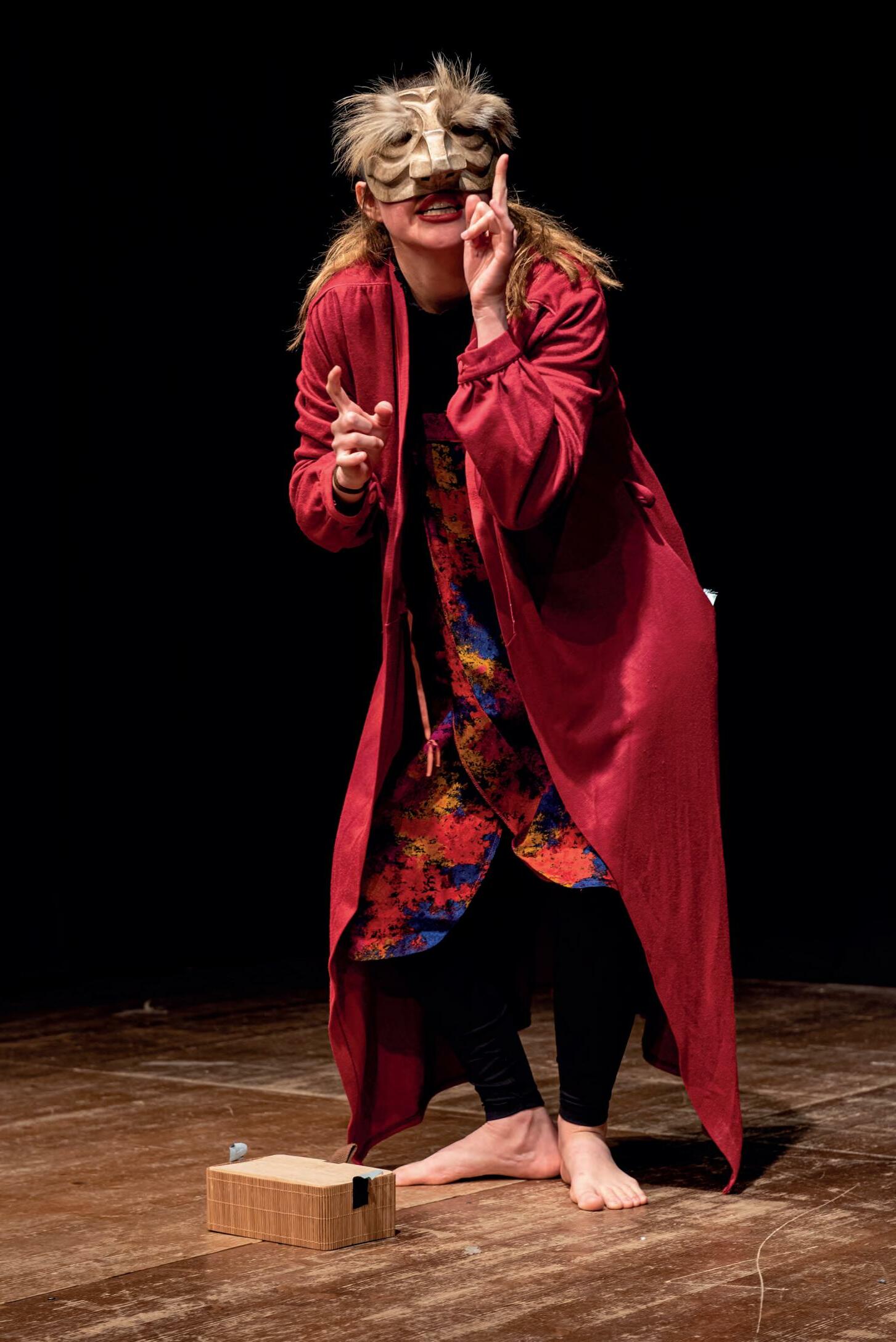
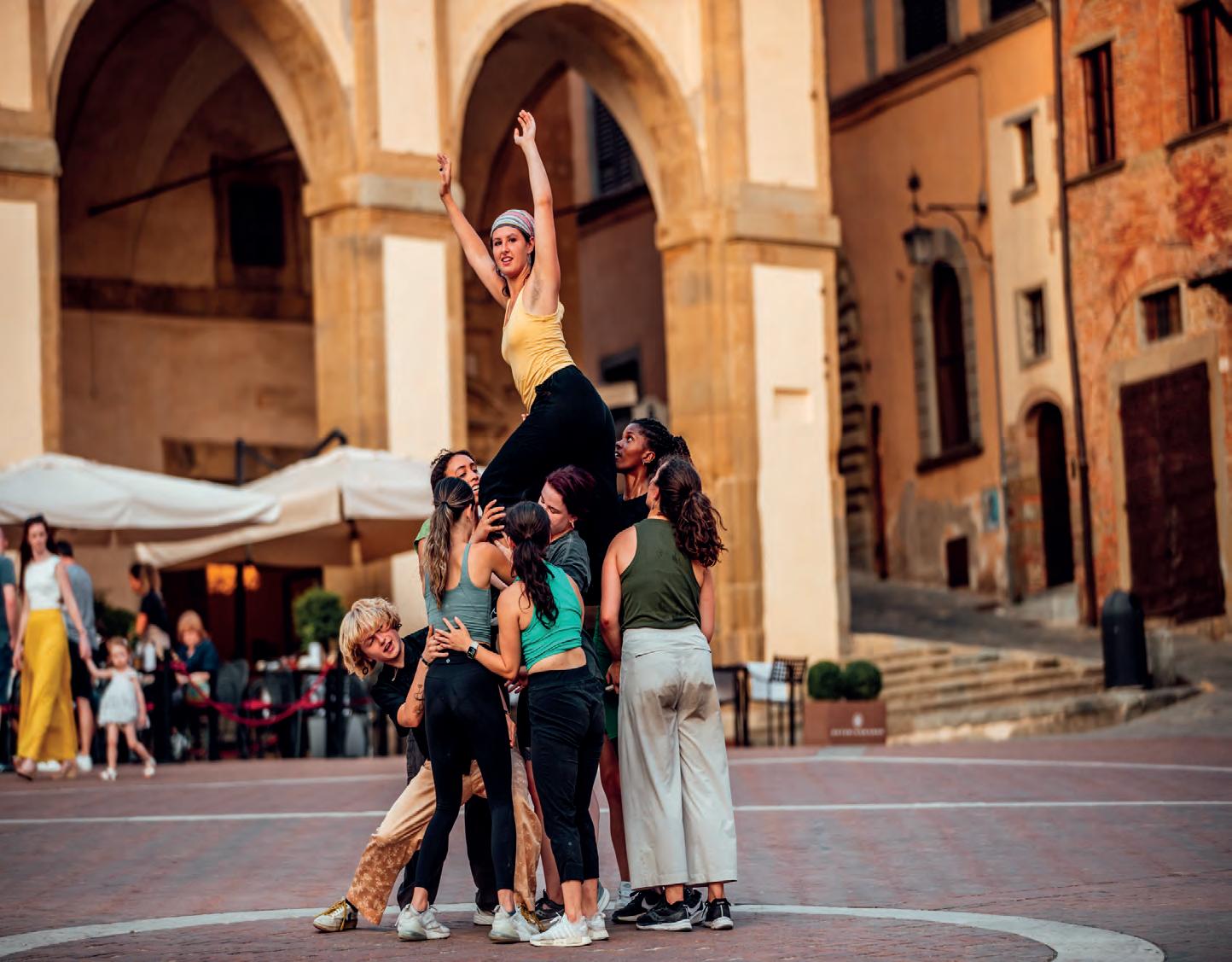
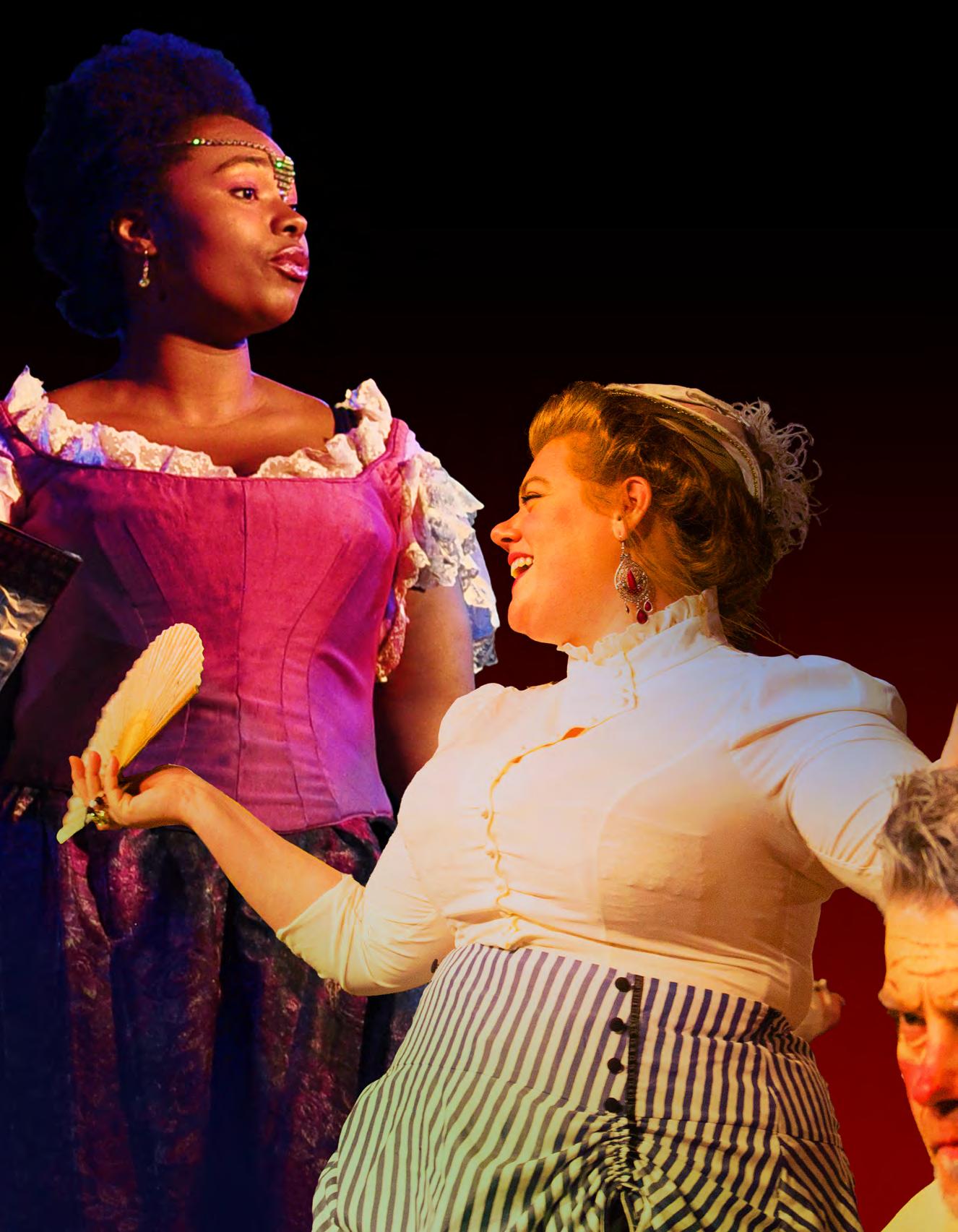
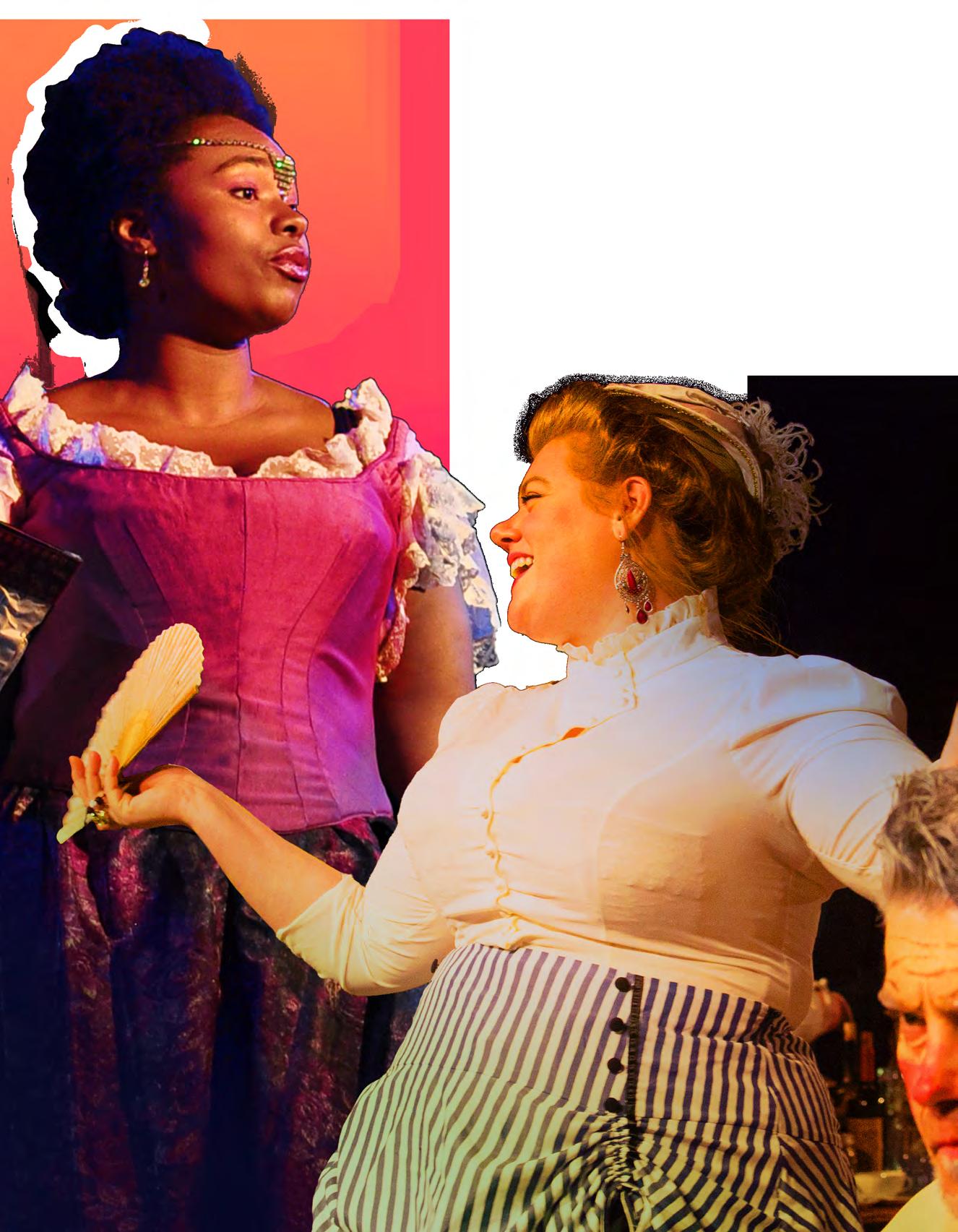
College, University & Training Program Directory
Looking for the best setting to launch your career in theatre? Or perhaps you’re seeking the perfect place to pursue an advanced degree in one of the theatre disciplines? To help you make those choices, we have compiled the most comprehensive directory available anywhere listing degrees and special programs offered at SETC member colleges, universities and training programs. Data for the profiles is provided by the institutions.
Searching for a Historically Black College or University (HBCU)? See Page D-24 for our directory of HBCUs with performing arts-related offerings.
2023
HBCU Directory
ACCADEMIA DELL’ARTE
Via San Fabiano 9
52100 Arezzo, Italy
Degrees: Accredited Program Offerings: One-Year Program in Physical Theatre, Semester in Physical Theatre, Semester in Dance, Semester in Music, OperArezzo Program, Summer Intensives in Physical Theatre & Dance.
Profile: The Accademia dell’Arte is a performing arts institution located in Tuscany, Italy. Study abroad and train from the source. We not only work with the masters of the great European tradition, but we place the body at the center of all of our training. Contact: +39 0575294155; info@dellarte.it www.dellarte.it
ALABAMA A&M UNIVERSITY
Visual, Performing & Communication Arts
PO Box 4900 Huntsville, AL 35762
Degrees: BA: Communications Media; Minor: Communications Media; BM: Music (Music Education, Business, Performance, Piano Pedagogy, General Music); M.Ed: Choral, Instrumental
Profile: The Department of Visual, Performing and Communication Arts is composed of three undergraduate programs: Visual Arts, Performing Arts (Music), and Communications
Media, and one graduate program: Communication Specialist. Each program’s curricular offerings are designed to yield a graduate who is ready to compete in today’s marketplace or to enter graduate school for advanced study and perfection of artistic talents.
Contact: Horace R. Carney 256-372-5512; horace.carney@aamu.edu www.aamu.edu/academics/colleges/education-humanities-behavioral-sciences/departments/visual-performing-communicationmedia
AMDA COLLEGE OF THE PERFORMING ARTS
6305 Yucca St, Los Angeles, CA 90028 211 W 61st St, New York, NY 10023
Degrees: BFA: Dance, Musical Theatre, Acting, Performing Arts; Liberal Arts; BA: Theatre; Associate of Occupational Studies (AOS): Acting, Musical Theatre, Dance Theatre; TwoYear Conservatory Certificate: Studio (Acting for Stage, Film and Television), Dance Theatre (Theatrical, Commercial and Concert Dance), Integrated (Acting, Music Theatre and Dance) Profile: Founded in 1964, AMDA provides rigorous, performance-based training by world-class faculty and an industry-focused education experience that prepares students for professional careers as performing artists. Students enjoy the option of studying at both campuses while completing their degrees. Scholarships offered through an audition process. Visit www.amda.edu for list of famous alumni.
Contact: Blake Babbitt
800-367-7908; bbabbitt@amda.edu
www.amda.edu
AMERICAN ACADEMY OF DRAMATIC ARTS
120 Madison Ave, New York, NY 10016
1336 N La Brea Ave, Los Angeles, CA 90028
Degrees: AOS: Acting; Certificate of Completion: Acting; Options to continue at partnered schools for bachelor’s degree
Profile: The American Academy of Dramatic Arts is the first conservatory for actors in the English-speaking world. With campuses in Los Angeles and New York, their alumni have been honored with an unprecedented 110 Oscar, 340 Emmy and 95 Tony nominations. Distinguished alumni include Robert Redford, Grace Kelly, Paul Rudd and Jessica Chastain, among many others.
Contact: 800-463-8990 (NY); 800-222-2867 (LA); admissions@aada.edu
www.AADA.edu
ANDERSON
UNIVERSITY
South Carolina School of the Arts
316 Boulevard
Anderson, SC 29621
Degrees: BA: Theatre, Dance, Theatre (Theatrical Design); BFA: Acting, Musical Theatre; Minor: Theatre, Dance
Profile: A top-tier, Christian liberal arts university providing professional training in performance, design, technical theatre and arts management in our four venues (large and small proscenium, concert hall, black box) and our brand-new, state-of-the-art dance facility. Auditions are required. Competitive scholarships are available.
Contact: David Sollish
864-231-2153
dsollish@andersonuniversity.edu
www.andersonuniversity.edu
APPALACHIAN STATE UNIVERSITY
Department of Theatre and Dance
PO Box 32123
Boone, NC 28608
Degrees: BA: Dance Studies, Theatre Arts (Theatre Design/Technology, General Theatre, Theatre Performance, Theatre Education/K–12); Minor: Theatre Arts, Dance Studies, Somatic Sustainability
Profile: Appalachian State University’s Department of Theatre and Dance offers challenging coursework, a dynamic co-curricular production program and a student–faculty ratio of 6:1, all in a liberal arts setting. It provides exemplary theatre and dance experiences to departmental students, as well as outreach opportunities within the community and the region.

Contact: Michael Helms
828-262-7461; helmsml@appstate.edu
theatreanddance.appstate.edu
ASBURY UNIVERSITY
1 Macklem Dr
Wilmore, KY 40390
Degrees: BA: Theatre and Cinema Performance
Profile: We focus on acting for stage and camera. We are connected to the largest film school in Kentucky, providing actors opportunities to be in professional film and video, plus 60 student films per semester, and have a formal connection with several acting agencies. Students study Shakespeare at The Globe in London.
Contact: Kristopher Dietrich
kristopher.dietrich@asbury.edu
www.asbury.edu/comarts/degree-programs/ communication-worship-theatre-arts-departments/theatre-cinema-performance
2023 SETC College, University AUBURN UNIVERSITY DEPARTMENT OF THEATRE AND DANCE auburnuniversitytheatre.org 334.844.4748 • BFA Design/Tech • BFA Performance and Music Theatre • BFA Theatre Management • BA Theatre • Minors in Theatre and Dance • Fully accredited by NAST • Scholarships and internships • State-of-the-art facilities • Strong alumni network
CREATE CRAFT CONVERSE
Photo by Jeff Etheridge
D-2
ATLANTIC ACTING SCHOOL
76 Ninth Ave, Suite 537 New York, NY 10011
Degrees: Certificate: Professional Conservatory, Evening Conservatory, Global Virtual Conservatory, Spring Comprehensive, Summer Intensive, Summer Teen Ensemble; BFA through NYU Tisch School of the Arts

Profile: Founded as an ensemble of students in 1985, Atlantic has grown into an acting school and 22-time Tony Award-winning offBroadway theatre company. Atlantic has the only conservatory program in the world offering in-depth training in Practical Aesthetics, The Atlantic Technique, with a disciplined approach to script analysis and working truthfully moment-to-moment. The mission of the school is to ensure that graduates master essential analytical and physical disciplines of acting and are empowered for success.
Contact: 212-691-5919 admissions@atlantictheater.org www.atlanticactingschool.org
AUBURN UNIVERSITY
Telfair Peet Theatre
350 W Samford Ave
Auburn, AL 36849
Degrees: BA: Theatre; BFA: Performance, Music Theatre, Design/Technology, Management
Profile: Auburn Theatre and Dance offers rigorous practical training in a liberal arts context. A high percentage of graduates proceed to industry employment, graduate theatre training programs, and alter native career paths.
Contact: Chase Bringardner 334-844-4748; cab0023@auburn.edu cla.auburn.edu/theatre
AUBURN UNIVERSITY
MONTGOMERY
Communication & Theatre
PO Box 244023
Room 351 Liberal Arts
Montgomery, AL 36124
Degrees: BA: Communication (Theatre, Broadcast Journalism)
Profile: Theatre AUM is a small, generalist theatre program with four full-time faculty dedicated to training students who are interested in learning all aspects of theatre.
Contact: Lexi Tippett 334-244-3632; atippett@aum.edu www.cas.aum.edu/departments/communication-and-theatre
AUSTIN PEAY STATE UNIVERSITY
601 College St
Clarksville, TN 37044
Degrees: BA: Theatre and Dance (Acting, Dance, Design); BFA: Theatre and Dance (Acting, Dance, Design, Musical Theatre)
Profile: We prepare the student to become a working professional in the entertainment industry by being well-versed in many disciplines and skills. Our season consists of six performances with no restrictions on freshmen auditioning. Scholarships and out-of-state tuition waivers available. Check out theatredance.apsu.edu for audition info.
Contact: Marcus Hayes hayesma@apsu.edu theatredance.apsu.edu
AVERETT UNIVERSITY
420 W Main St
Danville, VA 24541
Degrees: BFA: Acting, Directing, Musical Theatre, Technical Theatre; BS: Theatre with Teacher Licensure; BA: Theatre, English/ Theatre with or without Teacher Licensure; Minor: Musical Theatre, Theatre
Profile: Averett has a small, energetic and extremely active theatre department producing five mainstage productions yearly, where students are offered a variety of opportunities to learn their craft. Students are guided by a dedicated professional faculty.
Contact: Giuseppe Ritorto
434-791-5712; gritorto@averett.edu www.averett.edu
AVILA UNIVERSITY
School of Performing Arts
11901 Wornall Rd
Kansas City, MO 64145
Degrees: BFA: Theatre (Acting, Directing/ Producing, Musical Theatre, Design/Technology/Management); BA: Theatre, with optional Secondary or Music Education; BM (Voice Performance, Collaborative Piano); Minor: Theatre, Music, Dance Profile: Avila provides a pre-professional program with personal attention and specialized training, allowing choice and access to the professional world.
Contact: Matt Schwader Harbor; John Dylon Rohr; Amity Bryson; Admissions 816-501-2405; matt.schwader@avila.edu
816-501-3733; john.rohr@avila.edu
816-501-3651; amity.bryson@avila.edu
816-501-3603; admission@avila.edu
www.avila.edu/academics/college-of-liberalarts-social-sciences/school-of-performingarts
BALL STATE UNIVERSITY
Department of Theatre and Dance
2000 W University Ave, AC 306 Muncie, IN 47306
Degrees: BA or BS: Dance, Design & Technology, Directing, Stage Management,
Theatre Education, Theatrical Creation (Playwriting, Dramaturgy, Theatre Management, Theatre History/Criticism); BFA: Acting, Dance, Design & Technology, Musical Theatre; Minor: Theatre, Technical Theatre, New Works
Profile: The Department of Theatre and Dance at Ball State University fosters compassionate, inclusive and empathetic human beings. We challenge our students to become exceptional artists through the exploration of the dynamic relationship between art and the human experience.
Contact: Andrea Sadler
765-285-8740; amsadler@bsu.edu
www.bsu.edu/theatredance
BELHAVEN UNIVERSITY
1500 Peachtree St Jackson, MS 39202
Degrees: BA: Theatre (Theatre, Performance, Production)
Profile: The mission of Belhaven’s Theatre Department is to prepare students academically, technically, artistically and spiritually to serve their Community, their Collaborators, and their Creator in the world of theatre and related vocations.
Contact: Elissa Sartwell
601-974-6478; theatre@belhaven.edu
www.belhaven.edu/theatre
D-3
& Training Program Directory
BELMONT UNIVERSITY
1900 Belmont Blvd
Nashville, TN 37212
Degrees: BA: Theatre; BFA: Theatre (Performance, Directing, Production Design, Theatre Education with Licensure), Musical Theatre; Minor: Theatre, Dance
Profile: Belmont is a Christian university in the heart of Nashville, TN, with professional theatre and musical theatre training programs, state-of-the-art theatre facilities and a studentcentered faculty. We offer short-term study abroad programs in each concentration as well as semester-long opportunities in New York and LA.
Contact: Brent Maddox 615-460-8219; brent.maddox@belmont.edu www.belmont.edu
BEREA COLLEGE
101 Chestnut St, CPO 2148
Berea, KY 40404
Degrees: BA: Theatre; Minor: Theatre, Film, Musical Theatre
Profile: Our theatre major introduces all aspects of theatre: literature, theatre history, acting, directing, design, production and management. The program supports a full season of plays each academic year, as well as individual student projects and original
PERFORMANCE WITH
works. Every student accepted to Berea attends tuition-free!
Contact: Adanma Barton 859-985-3258; bartonad@berea.edu www.berea.edu/thr
BERRY COLLEGE
PO Box 495013
Mount Berry, GA 30149 - 5013
Degrees: BA: Theatre; Minor: Theatre, Musical Theatre
Profile: With its state-of-the art new facility and award-winning faculty and students, together on the world’s largest campus just 70 miles from Atlanta, Berry College is one of the most dynamic emerging theatre programs in the country. With small class sizes and the nationally recognized Lifeworks program, opportunities abound for personalized instruction and paid engagements across a spectrum of disciplines in theatre.
Contact: Peter Friedrich 706-236-2263; bctc@berry.edu www.berry.edu/academics/majors/theatre/
BOSTON UNIVERSITY
School of Theatre
855 Commonwealth Ave Boston, MA 02215
Degrees: BFA: Acting, Theatre Arts (Performance), Costume Design, Costume Production, Lighting Design, Scene Design, Sound Design, Stage Management, Technical Production, Theatre Arts (Design & Production); MFA: Costume Design, Costume Production, Directing, Lighting Design, Production Management, Scene Design, Sound Design, Technical Production; Minor: Dance, Theatre, Musical Theatre Course Sequence; Artisan Certificate: Scene Painting Profile: A nationally recognized program that balances artistic immersion with the rigor of a research university. Students explore possibilities through a laboratory approach to new and existing work while deepening their understanding of the industry as a whole. Faculty mentorship is grounded in sharing transformative professional experiences to amplify artistic discovery.
Contact: Dayna Cousins
theatre@bu.edu
www.bu.edu/cfa/theatre

CAMPBELLSVILLE UNIVERSITY
1 University Dr #872
Campbellsville, KY 42718
Degrees: BA or BS: Theatre (Performance, Technical Theatre); Minor: Dance
Profile: CU offers hands-on engagement with your craft and a personalized approach from faculty. A unique partnership with a local production company offers additional opportunities throughout the year for students to gain performance or design experience. CU offers a diverse campus and provides opportunities to visit and study around the world.
Contact: Starr Garrett
270-789-5266; sgarrett@campbellsville.edu
www.campbellsville.edu/theater
CARNEGIE MELLON UNIVERSITY
School of Drama
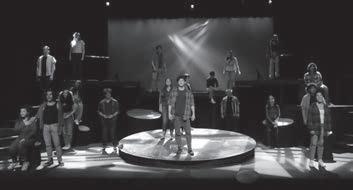
5000 Forbes Ave
Pittsburgh, PA 15213
Degrees: BFA: Acting, Music Theatre, Design (Scenic, Lighting, Costume, Sound, Media), Production Technology and Management (Technical Direction, Stage and Production Management, Production Technology), Directing, Dramaturgy; MFA: Design (Scenic, Lighting, Costume, Sound, Media), Production Technology and Management (Technical Direction, Stage and Production Management), Directing, Dramatic Writing
Profile: The CMU School of Drama offers an intense conservatory training ground with an emphasis on individual attention, leading to a career in theatre, film, television, and other entertainment industries. With individualized, hands-on training and strong alumni connections in the field, students are well-placed to work immediately upon graduation.
Contact: Drama-relations@andrew.cmu. edu
www.drama.cmu.edu
CATAWBA COLLEGE
2300 W Innes St
Salisbury, NC 28144
Degrees: BA: Theatre Arts; BS: Theatre Arts Management; BFA: Musical Theatre, Performance (Acting, Directing), Design and Production (Lighting Design, Set Design, Costume Design, Technical Direction)
Profile: Catawba was recently recognized as one of only 50 institutions in the nation included in The Princeton Review’s list of schools with “Great College Theatre.” We boast strong experiential learning and high graduate marketability. Scholarships are available.
Contact: Sacha Witt 704-637-4440; anwitt16@catawba.edu
www.catawba.edu/academic/theatrearts
2023 SETC College, University D-4
SCHOOL OF THE ARTS
& Training Program Directory
CATHOLIC UNIVERSITY OF AMERICA
Drama Department
620 Michigan Ave NE
Washington, DC 20064
Degrees: BFA: Acting for Theatre, Film and Television; BA: Drama; BA/MA: Accelerated degree in Drama and Theatre Education; MA: Theatre History and Criticism, Theatre Education (MATE); MFA: Directing, Playwriting
Profile: New BFA in acting for theatre, film and television. Our BA program has many performance, design and technical opportunities. There’s professional theatre training for directors and playwrights in our MFA, and the MA provides advanced studies in dramaturgy, theatre history and criticism. Our MATE can be completed online. Scholarships available!
Contact: Eleanor Holdridge 202-319-5358; cua-drama@cua.edu drama.cua.edu

CCM, COLLEGE-CONSERVATORY OF MUSIC
Theatre Arts, Production, and Arts Administration
PO Box 210003
Cincinnati, OH 45221-0003
Degrees: BFA: Performance (Acting, Musical Theatre), Dance, Design/Technology (Costume Design & Technology, Lighting Design & Technology, Sound Design, Stage Design, Props, Scenic Art, Stage Management, Technical Direction); MA or MA/MBA: Arts Administration; MFA: Design (Costume Design & Technology, Lighting Design & Technology, Sound Design, Stage Design, Stage Properties, Stage Management, Wig and Makeup Design); Artist Diploma: Opera (Singers, Coaches, Stage Direction)
Profile: CCM students are offered a wide variety of opportunities in classes, major productions, studio productions, master classes, summer projects and professional internships. This wealth of exposure is provided not only through shared resources among all the programs within the CCM community, but also through strong connections to CCM alumni and entertainment professionals.
Contact: Deborah Neiheisel-DeZarn 513-556-583; dezarndl@ucmail.uc.edu ccm.uc.edu
CENTRE COLLEGE
600 W Walnut St
Danville, KY 40422
Degrees: BA: Theatre
Profile: The Centre College Theatre Program provides a balanced and comprehensive theatre experience for all students. We offer classes for majors and nonmajors that provide a thorough foundation in all elements of
theatre. Students are prepared for graduate education and employment in and beyond the theatre as teachers, artists, technicians, managers or any number of fields that value creativity, collaboration, critical thinking and communication skills.
Contact: Jennifer Goff, Victoria Pook 859-238-5446; jennifer.goff@centre.edu sites.centre.edu/theatreatcentre
CIRCLE IN THE SQUARE THEATRE SCHOOL
1633 Broadway
New York, NY 10019
Degrees: Two-Year Certificate: Theatre, Musical Theatre; 2+2 BFA with Eckerd College, St. Petersburg, FL: Theatre, Musical Theatre
Profile: Circle in the Square is the world’s only school affiliated with a Broadway theatre. Former students, including Idina Menzel, Kevin Bacon and Lady Gaga, have appeared in countless Broadway shows, on television and in film. Taught by a faculty of NY professionals, graduates enjoy a curriculum that gives them the skills needed to be triple threats and true theatre artists.
Contact: Sara Louise Lazarus 212-307-0388; Admissions@circlesquare.org www.circlesquare.org www.eckerd.edu
CLEMSON UNIVERSITY
Department of Performing Arts
221 Brooks Center
Clemson University
Clemson, SC 29634-0525
Degrees: BA: Production Studies in Performing Arts (Theatre, Music, Audio Technology)
Profile: We are a unique interdisciplinary program in which students focus on a specific performing art, while learning skills that integrate all of the arts. Department productions are staged in our 100-seat black box and 968seat roadhouse. Affiliated with SETC, USITT, KCACTF and London’s Rose Bruford College.
Contact: Tony Penna 864-656-6961; tpenna@clemson.edu www.clemson.edu/PerfArts
COASTAL CAROLINA UNIVERSITY
Department of Theatre
PO Box 261954
Conway, SC 29528-6054
Degrees: BA: Theatre; BFA: Theatre Arts (Musical Theatre, Acting, Physical Theatre, Design and Production)
Profile: A nationally accredited program with alumni who are working professionals in the industry. Rooted in classical foundations, the accomplished faculty guide students into the profession through innovative training methods and dynamic practices. Immersive classroom study, contributions from notable guest
artists and a rigorous production season foster an environment of discipline, experimentation and empowerment.
Contact: Dory Sibley
843-349-2385; ccutheatre@coastal.edu www.coastal.edu/theatre
COKER UNIVERSITY
McCall School of Visual and Performing Arts
300 E College Ave
Hartsville, SC 29550
Degrees: BA: Theatre (Writing, Musical Theatre, Performance, Technical Theatre), Music (Piano, Voice, Music Education), Dance (Dance Education, General); BFA: Dance (Performance, Choreography); Minor: Dance, Music, Theatre
Profile: A major in the arts isn’t a choice – it’s a calling. If you want to succeed, it also takes dedication, practice and training. Coker’s McCall School of Visual and Performing Arts is designed to help you put all these pieces together, so you can turn your passion into a career!
Contact: Angela Gallo; Joshua Webb 843-383-8381; agallo@coker.edu 843-383-8378; jwebb@coker.edu www.coker.edu/academics/academic-programs/department-of-dance-music-theatre/ theatre
D-5
COLLEGE OF CHARLESTON
Department of Theatre and Dance
66 George St
Charleston, SC 29424
Degrees: BA: Theatre (Performance, Costume Design & Technology, Scenic/ Lighting Design & Technology, Theatre for Youth, Theatre Studies, General Theatre), Dance (General Dance Studies, Performance/ Choreography); MAT: Performing Arts –Theatre
Profile: College of Charleston provides comprehensive instruction in theatre and dance in a liberal arts setting, as well as focused training in the practice of theatre and dance across a range of skill sets through the CofC Stages season. The melding of production experience and academics helps students gain the tools necessary for a successful life both in and out of the professional arts.
Contact: Janine McCabe 843-953-6306; mccabej@cofc.edu theatre.cofc.edu
CONVERSE UNIVERSITY
Department of Theatre & Dance
580 E Main St
Spartanburg, SC 29302
Degrees: BA: Theatre, Musical Theatre; Minor: Theatre, Dance, Arts Management
Profile: We inspire, entertain and challenge audiences with live performances that enhance our capacity for empathy and illuminate our common humanity. Our primary focus in the classroom, in rehearsal and in live performance is to give student artists the opportunities and support to succeed.
Contact: Melissa Owens 864-596-9162; melissa.owens@converse.edu www.converse.edu/academics/theatre-dance
DAVIDSON COLLEGE
Department of Theatre Box 4171
Davidson, NC 28035
Degrees: BA: Theatre
Profile: The Davidson College Theatre Department is committed to fostering students’ intellectual and artistic growth. As a theatre student, you will collaborate and cultivate your skills with a faculty devoted to investigating how performance engages with and illuminates our multicultural world. Whether your passion is studying the intersection of theatre and community or acting or designing for the stage, you can find your place in theatre at Davidson.
Contact: Karli Henderson 704-894-2912; kahenderson@davidson.edu
www.davidson.edu/theatre
DICKINSON COLLEGE
Department of Theatre and Dance Box 1773
Carlisle, PA 17013
Degrees: BA: Theatre (Acting/Directing, Design/Technology, Dramatic Literature); BA: Dance; Certificate: Central Pennsylvania Youth Ballet (CPYB)
Profile: Dickinson offers a comprehensive liberal arts education in theatre and/or dance. In addition to many performance and production opportunities, students are encouraged to explore connections between theatre and other fields of interest. Dickinson’s program offers students both internship and study abroad opportunities.
Contact: Sherry Harper-McCombs 717-245-1239; theatre&dance@dickinson.edu www.dickinson.edu/academics/programs/ theatre-and-dance
EAST CAROLINA UNIVERSITY
School of Theatre and Dance
Messick Theatre Arts Center
Greenville, NC 27858-4353
Degrees: BA: Theatre Arts; BFA: Theatre Arts (Professional Actor Training, Musical Theatre, Stage Management, Design and Production, Theatre for Youth), Theatre Arts
Education
Profile: Accredited by the National Association of Schools of Theatre, our programs emphasize real-world practical preparation. Our program and practice are guided by our core principles of Excellence, Professional-
ism, Diversity, Artistic Risk and Community. Our graduates are prepared to excel in the professional theatre, film and entertainment world at any level.
Contact: 252-328-6390; theatre@ecu.edu
www.ecu.edu/theatredance
EAST TENNESSEE STATE UNIVERSITY
Department of Theatre and Dance
PO Box 70626
Johnson City, TN 37614
Degrees: BA: Theatre (Acting, Design/ Production, Musical Theatre, Physical Theatre, General Theatre)
Profile: We provide a foundation in theatre and dance with a focus on individualized mentoring. Our professionally trained faculty and staff offer current, up-to-date instruction in all aspects of theatre and dance, including performance, design and technology, aerial dance, circus arts and musical theatre. Martin Center for the Arts is our new state-of-the-art performance facility. NAST-accredited.

Contact: Karen Brewster 423-439-5827; brewster@etsu.edu
www.etsu.edu/theatre
FAIRLEIGH DICKINSON UNIVERSITY
Visual & Performing Arts Department 285 Madison Ave M-DB0-01
Madison, NJ 07940
Degrees: BA: Theatre Arts (Acting, Design and Technical Theatre, Directing, Musical Theatre, and Theatre Studies); Minor: Acting, Dance Studies, Design and Technical Theatre, Dramatic Literature and Performance, Entertainment Business and Management, Musical Theatre, Playwriting, Screenwriting, Dramatic Writing
Contact: Alexandra Kostis 973-443-8467; akostis@fdu.edu
www.fdu.edu/academics/colleges-schools/ becton/arts/theater/
FLORIDA INTERNATIONAL UNIVERSITY
11200 SW 8th St, WPAC 131 Miami, FL 33199
Degrees: BA: Theatre; BFA: Performance (Acting & Musical Theatre), Design (Costume Design, Scenic Design, Lighting Design); Minor: Theatre, Dance
Profile: We offer both BA and BFA degrees in theatre, and students may focus on acting, costume design, set and lighting design, or technical theatre. We have a broad curriculum taught by experienced faculty who continue to work professionally in acting, directing, design and playwriting.
Contact: Lesley-Ann Timlick, Rebecca Covey
timlickl@fiu.edu; rcovey@fiu.edu 305-348-2895
carta.fiu.edu/theatre
2023 SETC College, University D-6
& Training Program Directory
FLORIDA SCHOOL OF THE ARTS
St. Johns River State College
5001 St. Johns Ave
Palatka, FL 32177
Degrees: AS or AS+AA: Acting, Musical Theatre, Dance, Costume Design, Scenic and Lighting Design, Stage Management, New Media Design, Photography, Studio Arts, Animation
Profile: “FLO” is a two-year, state-supported professional arts school. We offer intense, creative instruction in the classroom, combined with many practical opportunities available during our rigorous production schedule of plays, musicals, dance events and exhibitions. Admission is by audition or portfolio review only.
Contact: Dana Cotton 386-312-4304; danacotton@sjrstate.edu www.floarts.org
FLORIDA STATE UNIVERSITY
School of Theatre, 239 Fine Arts Bldg
Tallahassee, FL 32306
Degrees: BA: Theatre; BFA: Acting, Music Theatre; MFA: Acting, Costume Design, Directing, Technical Production, Theatre Management; MS: Theatre Education; MA: Theatre and Performance Research; PhD: Theatre and Performance Research
Profile: The School of Theatre at FSU offers a comprehensive education in theatre. In addition to its academic offerings, the school presents a six-show season, including two musicals, on its three stages annually. Also, an active student theatre association presents a number of shows annually.
Contact: Michele Diamonti 850-644-7234; mdiamonti@fsu.edu theatre.fsu.edu
FRANCIS MARION UNIVERSITY
Department of Fine Arts, Theatre Program
PO Box 100547
Florence, SC 29502
Degrees: BA/BS: Performing Arts (Performance: Acting/Directing, Technology: Scenery/Lighting, Costuming)
Profile: We are a small theatre program “big” on giving students experience; students are given the opportunity to participate in all facets of production. Francis Marion University is a fully accredited institution with the National Association of Schools of Theatre (NAST).
Contact: Glen Gourley 843-661-1538; agourley@fmarion.edu www.fmarion.edu/finearts/theatrearts
FURMAN UNIVERSITY
3300 Poinsett Hwy
Greenville, SC 29613
Degrees: BA: Theatre Arts; Minor: Musical Theatre
Profile: Nationally acclaimed for The Furman Advantage four-year pathway for individualized student success. The Theatre Arts Department offers dynamic coursework with the primary goal of transforming theatre students into theatre artists. Rated #11 in The Princeton Review for Best College Theatre.
Contact: Maegan Azar 864-294-2051; theatre.arts@furman.edu www.furman.edu/theatrearts
GAINESVILLE THEATRE ALLIANCE
PO Box 1358
Gainesville, GA 30503
Degrees: BA: Theatre; BFA: Acting, Musical Theatre, Theatre Design & Technology
Profile: Gainesville Theatre Alliance is a oneof-a-kind, nationally recognized collaboration between the University of North Georgia and Brenau University. Utilizing hands-on, individualized training, GTA boasts a production program rivaling the largest theatre schools in the country. GTA’s state-of-the-art facilities include five theatres, multiple shops, design labs, and rehearsal and dance studios.
Contact: Zechariah Pierce (UNG) Tracey Brent-Chessum (Brenau) 678-717-2273; zechariah.pierce@ung.edu 770-534-6264; tbrent-chessum@brenau.edu www.gainesvilletheatrealliance.org
GEORGE MASON UNIVERSITY
4400 University Dr, MS 3E6
Fairfax, VA 22030
Degrees: BA: Theatre (Performance, Design/Technical, Theatre Studies); BFA: Stage and Screen Studies (Performance, Musical Theatre, Design/Technical); MA: Accelerated MA in Arts Management; Certificate: Graduate Certificate in Teaching Theatre Arts, PK–12
Profile: Located near the vibrant DC arts community, we encourage our students to engage their artistic and academic skills in regional and global communities. Theatre at Mason blends excellence and rigor using state-of-the-art resources to provide a professional approach in a liberal arts environment.
Contact: Nicholas M. Kfoury Horner 703-993-1120; theater@gmu.edu theater.gmu.edu
GEORGIA SOUTHERN UNIVERSITY
2434 Southern Dr, Sanford Hall/Box 8091 Statesboro, GA 30460
Degrees: BA: Theatre; Minor: Theatre
Profile:The Theatre Program at Georgia Southern University produces a diverse array of award-winning, culturally important theatre, including African American theatre. An institutional member of NAST, our program produces students who excel in artistic
achievement. Undergraduate students have the opportunity to perform, design and direct in four state-of-the-art performance facilities on two campuses while developing a strong portfolio based in realized productions.
Contact: Kelly Berry (Statesboro campus); John Wright (Armstrong Savannah campus) 912-478-0106; ksberry@georgiasouthern.edu
912-344-2705; johnwright@georgiasouthern cah.georgiasouthern.edu/commarts/majors/ theatre
GREENSBORO COLLEGE
815 W Market St
Greensboro, NC 27401
Degrees: BA: Theatre (Acting, Directing, Stage Management, Costuming, Theatre Education), BFA: Musical Theatre, Design/Tech; Minor: Dance, Musical Theatre, Design/Tech Profile: We provide many undergraduateonly production opportunities each year in a small college environment (approximately 1,000 students total on campus), including hosting the state theatre festival. Internship opportunities available at the local Equity theatre and professional organizations. Plenty of opportunities to double major, too!
Contact: Perry Morgan 336-272-7102 x5744 perr y.morgan@greensboro.edu theatre.greensboro.edu
The Hollins Theatre Institute
Award-winning B.A. Program in Theatre Award-winning M.F.A. in PlaywritingThe Playwright's Lab M.A. in Theatre & New Play Development London Theatre Immersion Program

Find
www.hollins.edu/theatre
D-7
your artistic home.
HEIDELBERG UNIVERSITY
School of Music and Theatre
310 E Market St
Tiffin, OH 44883
Degrees: BA: Theatre (Acting, Musical Theatre, Production)

Profile: Learn the art and business of theatre through four years of intense hands-on experiences. We believe our students succeed because they are welcomed into our artistic community as soon as they arrive. Our students become well-rounded theatre artists who understand and know how to navigate the arts world.
Contact: Karla Kash 419-448-2073; kkash@heidelberg.edu www.heidelberg.edu
HIGH POINT UNIVERSITY
One University Pkwy
High Point, NC 27268
Degrees: BA: Theatre (Performance, Design-Technical, Collaborative Theatre), Dance; Minor: Theatre, Dance, Musical Theatre
Profile: Our faculty artist-mentors walk the walk alongside students and help them to hone their craft and find their artistic voice.
We feature a busy production schedule and a company philosophy where students get ample hands-on learning opportunities in every aspect of theatre and dance production, making them highly competitive upon graduation.

Contact: Doug Brown 336-841-4525; dbrown@highpoint.edu www.highpoint.edu/theater
HOFSTRA UNIVERSITY
Department of Drama and Dance Hempstead, NY 11549-1000
Degrees: BA: Drama; BFA: Performance or Production (Costume Design, Set Design, Lighting Design, Sound Design, Directing, Technical Direction, Stage Management, Dramaturgy); Minor: Drama, Musical Theatre (with BA in Drama or BFA in Performance)
Profile: Exclusively undergraduate program, half-hour from NYC. Six mainstage productions a year, including one musical and an annual Shakespeare Festival, now in its 68th year. Student Rep at the end of every semester highlighting student directing and playwriting. Production students have the opportunity to design, stage manage or direct multiple projects.
Contact: Royston Coppenger 516-463-5444
Royston.P.Coppenger@hofstra.edu www.hofstra.edu
HOLLINS UNIVERSITY
7916 Williamson Rd, Box 9602
Roanoke, VA 24020
Degrees: BA: Theatre (Performance, Design and Technology, Theatre Management), Dance; BFA: Musical Theatre; Minor: Theatre; MA: Theatre and New Play Development; MFA: Playwriting (Dramaturgy, Directing, Performance, Youth Theatre, Plays with Music, Applied Theatre); Certificates in Directing, Performance, and Dramaturgy
Profile: The Hollins Theatre Institute provides classroom instruction and experiential learning in all aspects of theatre for undergraduate women. The Playwright’s Lab is a unique high-intensity/low-residency co-educational graduate program designed to provide an educational experience centered around experimentation – where process and discovery are encouraged rather than product and validation.
Contact: theatre@hollins.edu
540-362-6313
hollins.edu/academics/majors-minors/theatremajor hollins.edu/academics/graduate-degrees/ playwriting-mfa
HUNTINGTON UNIVERSITY
2303 College Ave
Huntington, IN 46750
Degrees: BA: Theatre Performance, Theatre Technology, Theatre, Theatre (NYC Semester); Minor: Theatre, Production Technology
Profile: Huntington University is a comprehensive Christian university of the liberal arts offering programs in more than 70 academic concentrations, including theatre, music and film. HU is located on a contemporary, lakeside campus in northeast Indiana. HU is consistently ranked among the best universities in the Midwest by U.S. News & World Report , Forbes.com and The Princeton Review
Contact: Ryan Long
260-359-4257; rlong@huntington.edu
Huntington.edu
HUSSIAN COLLEGE LOS ANGELES
1201 W 5th St
Los Angeles, CA 90017
Degrees: BFA: Acting, Film and Digital Content, Commercial Dance, Contemporary Musical Theatre and Film
Profile: Hussian College (formerly Studio School) prides itself on academic and professional excellence, with an unrelenting commitment to prepare students for service in their communities and career. Not only is the college on a working studio lot, surrounded by professional productions, but the faculty and program chairs are also experienced working professionals. It’s not uncommon to see your teacher in class one day and on a television show the next.
Contact: Nina Wray 800-762-1993
nina.wray@hussiancollege.edu www.studioschool.org
ILLINOIS STATE UNIVERSITY
School of Theatre and Dance Campus Box 5700
Normal, IL 61790
Degrees: BA or BS: Acting, Dance Education, Dance Performance, Design/Production, Theatre Education, Theatre Studies (Cinema Studies, Creative Drama, Directing, Dramaturgy/History, Integrated Performance, Theatre Management); MA or MS: Theatre History, Criticism; MFA: Design/Production, Directing Profile: The School of Theatre and Dance has an over 40-year legacy with many distinguished alumni, including the founders of Steppenwolf Theatre Company. Extensive production opportunities are available in three diverse performance venues and include studentproduced work. Student internships are available for the nationally recognized Illinois Shakespeare Festival.
Contact: Cristen Monson 309-438-8783; theatre@ilstu.edu
www.finearts.IllinoisState.edu/theatre
2023 SETC College, University D-8
Apply today! la.hussiancollege.edu 1.800.762.1993
EARN YOUR BFA AT THE ONLY CAMPUS CREATED INSIDE OF A WORKING MOVIE STUDIO.
& Training Program Directory
ILLINOIS WESLEYAN UNIVERSITY
School of Theatre Arts
2 Ames Plaza E
PO Box 2900
Bloomington, IL 61701
Degrees: BA: Theatre Arts; BFA: Acting, Music Theatre, Theatre Design & Technology; Minor: Theatre Arts, Theatre Dance, Arts Management, Film Studies, Theatre Design & Technology

Profile: IWU fosters the creative confidence of every student-artist. Inspired by their uniqueness, our dedicated faculty cultivates each student’s authentic voice. Our unique approach and intentionally small size combines conservatory-style training in a liberal arts setting. Illinois Wesleyan students develop critical thinking skills and gain an understanding of the world beyond the performing arts.
Contact: Theatre Recruitment Office 309-556-3944; theatre@iwu.edu www.iwu.edu/theatre
INDIANA STATE UNIVERSITY
Department of Theater
221 North 6th Street
Terre Haute, IN 47809
Degrees: BA: Theatre (Acting, Design and Technology, Playwriting, Dramaturgy and Directing, Theatre Studies, Administration and Management); Minor: Acting, Dance, Entertainment Design and Technology, Theater
Profile: The ISU Department of Theater provides a one-of-a-kind, hands-on learning experience in all aspects of theater. Students work in performance, design, production, direction, and administration before they graduate. Our students tour shows internationally and earn professional theater credits at Crossroads Repertory Theatre, a professional summer theater company housed at ISU.
Contact: Alicia Jay 812-237-3337; alicia.jay@indstate.edu www.indstate.edu/theater
INDIANA UNIVERSITY
Department of Theatre, Drama and Contemporary Dance
275 N Eagleson Ave, Suite A300U
Bloomington, IN 47405
Degrees: BA: Theatre & Drama; BFA: Musical Theatre, Dance; Minor: Dance, Theatre & Drama; MFA: Acting, Directing, Dramaturgy, Costume Design, Lighting Design, Scenic Design, Theatre Technology, Costume Technology, Playwriting
Profile: In addition to an outstanding faculty, the Department of Theatre, Drama and Contemporary Dance at Indiana University has over 25 guest artists and scholars on campus each year. The department is housed in state-of-the-art facilities and also operates the Indiana University Summer Theatre, a professional summer theatre.
Contact: Linda Pisano
812-855-0809; lpisano@indiana.edu theatre.indiana.edu
JACKSONVILLE UNIVERSITY
Department of Theatre
2800 University Blvd
N P111
Jacksonville, FL 32211
Degrees: BA: Theatre (Performance, Technology); BFA: Theatre (Performance, Technology); Minor: Theatre. Option to double major in another concentration (e.g., Film, Dance) Profile: The Theatre Program is housed in the Linda Berry Stein College of Fine Arts, which includes a SACS-accredited, rigorous BFA pre-professional degree. Our students enjoy small class sizes, one-on-one instruction, hands-on experience, performance opportunities in their freshman year, individual mentoring and a high degree of professionalism. Theatre talent scholarships available.
Contact: Erik DeCicco 904-256-7347; edecicc@ju.edu www.ju.edu/cfa
JAMES MADISON UNIVERSITY
School of Theatre and Dance
147 Warsaw Ave
MSC 5601
Harrisonburg, VA 22807
Degrees: BA: Dance, Musical Theatre, Theatre (Performance, Design & Technology, Theatre Studies, Theatre Education); Minor: Dance, Theatre Profile: We provide professionally focused training within the context of a broader university liberal arts experience. Numerous student-directed, student-choreographed, student-designed, student-acted and studentdanced productions complement mainstage faculty- and guest-directed/choreographed productions in the Forbes Center for the Performing Arts. Interview-audition or portfolio review is required for entrance to the majors. Contact: School of Theatre and Dance 540-568-6342; theatredance@jmu.edu
www.jmu.edu/theatredance
KD CONSERVATORY COLLEGE OF FILM AND DRAMATIC ARTS
2600 N Stemmons Fwy Suite 117
Dallas, TX 75207
Degrees: AAA: Acting Performance, Musical Theatre Performance, Motion Picture Production; Articulation Agreement to New York Film Academy’s BA/BFA track Profile: KD gives students a fast-paced path into the world of professional acting, musical theatre or film production. Our faculty of working professionals provides the same passion and desire that we ask of all our students. In
15 months, students prepare for a successful career in the entertainment industry.
Contact: 214-638-0484
www.kdstudio.com
KEAN UNIVERSITY
Theatre Conservatory
1000 Morris Ave
Union, NJ 07083
Degrees: BA: Theatre, Theatre Education (Elementary or Early Childhood Teacher
Certification); BFA: Performance with Musical Theatre option, Design & Technology; Minor: Theatre, Dance Profile: Twenty minutes from New York City, Kean University is accredited by the National Association of Schools of Theatre. About 16,000 diverse students attend Kean University, 130-plus in theatre. The department produces a faculty/guest-directed theatre series, a student-directed series, a cabaret series and the Equity Theatre-in-Residence, Premiere Stages.
Contact: Rachel Evans 908-737-4420; theatre@kean.edu
www.kean.edu/academics/college-liberalarts/theatre-conservatory
D-9
KENT STATE UNIVERSITY
School of Theatre and Dance
B141 Center for the Performing Arts
Kent, OH 44242
Degrees: BA: Theatre Studies (Performance, Production, Management, Theatre and Society), Dance Studies; BFA: Musical Theatre, Dance Performance, Design Production & Technology; MFA: Theatre Design & Technology (Lighting Design, Scenic Design, Costume Design, Theatre Technology), Acting for the Returning Professional
Profile: The School of Theatre and Dance offers individual mentorship; low studentteacher ratio; close proximity to professional theatre, opera and dance companies; an established guest director series; and the award-winning summer professional Porthouse Theatre.
Contact: Tony Hardin 330-672-7386; ahardi14@kent.edu www.kent.edu/theatredance
LEES-MCRAE COLLEGE
191 Main St Banner Elk, NC 28604
Degrees: BA/BS: Theatre Arts (Musical Theatre, Performance, Design & Technology, and Theatre Administration); Theatre Arts
Education (K–12 Teacher Licensure); Minor: Theatre Arts, Technical Theatre
Profile: Lees-McRae is a small private college located in the beautiful mountains of North Carolina. The Theatre Arts Program provides a welcoming and thorough training ground for young theatre practitioners through plentiful creative opportunities and individual attention in the classroom, the rehearsal hall, the technical studios and on stage.
Contact: Joshua Yoder 828-898-8739; yoderj@lmc.edu www.lmc.edu
LEHIGH UNIVERSITY
Department of Theatre
420 E Packer Ave
Bethlehem, PA 18015
Degrees: BA: Theatre (Acting/Directing, Design/Technical Theatre, Theatre History/ Dramatic Literature, General Theatre Studies); Minor: Theatre

Profile: Lehigh University’s Department of Theatre is a dynamic and intensive program with experienced professors, an active production season, engagement in developing new work, and a busy schedule of workshops, guest artists and special events.
Contact: Kashi Johnson 610-758-3640; kkj2@lehigh.edu Theatre.cas.lehigh.edu/
LIBERTY UNIVERSITY
1971 University Blvd
Lynchburg, VA 24515
Degrees: BA/BS: Theatre Arts; BFA: Acting, Musical Theatre
Profile: With eight productions a year, four being musicals, we emphasize storytelling and the development of skills required for employment in the industry. Students have opportunities to gain hands-on experience, hone their craft and jump-start their careers by earning professional credits with the Alluvion Stage Company, the department’s resident professional company.
Contact: Linda Cooper 434-582-2078; lncooper@liberty.edu www.liberty.edu/theatre
LIMESTONE UNIVERSITY
1115 College Dr Theatre Dept Gaffney, SC 29340
Degrees: BA: Theatre, Theatre/English, Musical Theatre; BFA: Theatre (Tech/Management/Design, Performance), Musical Theatre (Performance); Minor: Theatre
Profile: Limestone College is one of the few academic institutions in the area to offer a BFA within the framework of a liberal arts education. We are committed to the artistic development of both major and nonmajor students in the performing arts and offer students the undivided attention of our faculty.
Contact: Rachel Hynes 864-488-8234; RhHynes@limestone.edu finearts.limestone.edu/theatre
LINDSEY WILSON COLLEGE
Theatre Program
210 Lindsey Wilson St Columbia, KY 42728
Degrees: BA: Theatre Arts, Minor: Theatre Arts
Profile: The mission of the Lindsey Wilson Theatre Department is to provide a nurturing and challenging artistic environment that celebrates our history and anticipates our future, and to enhance the cultural and aesthetic experience of our campus and community through quality productions and educational outreach.
Contact: Jeremy Cloyd 270-384-8044; cloydj@lindsey.edu
www.lindsey.edu/theatre
THE LIVERPOOL INSTITUTE FOR PERFORMING ARTS (LIPA)
Mount St
Liverpool
L1 9HF
United Kingdom
Degrees: BA: Acting (Stage; Screen; Musical Theatre and Musicianship); Applied Theatre; Dance; Design/Technology; Filmmaking and Creative Technologies, Management of Music, Entertainment, Theatre and Events; Music (Songwriting and Performance or Songwriting and Production); Sound Technology; MA: Acting (Company); Costume Making; Professional Practice: Theatre and Drama Facilitation; Foundation
Certificate: Acting (Stage and Screen; Musical Theatre) and Popular Music and Music Technology
Profile: Home to around 1,000 students from over 40 countries worldwide, LIPA is for those who make performance possible. Cofounded in 1996 by Sir Paul McCartney, who remains our lead patron, our aim is to equip you with the knowledge, skills and experience to have a sustained career within your chosen industry.
Contact: Ryan Duncan +44 (0)151 330 3118
international@lipa.ac.uk
www.Lipa.ac.uk
LONDON ACADEMY OF MUSIC & DRAMATIC ART (LAMDA) 155 Talgarth Rd
London
W14 9DA
United Kingdom
Degrees: BA: Professional Acting; MFA: Professional Acting; MA: Classical Acting; Accredited: Semester Programme: Classical Acting (study abroad 14 weeks); Shakespeare Summer School (8 weeks); LAMDA Short Courses: Shakespeare Summer School (4 weeks), Audition Technique (2 weeks), Introduction to Screen Acting (2 weeks), Introduction to Drama School (2 weeks), Acting in English (2 weeks)
2023 SETC College, University
D-10
& Training Program Directory
Profile: A world leader and pioneer, LAMDA provides exceptional vocational training in the dramatic arts. Our outstanding new facilities provide creative spaces where students can take the risks necessary to explore their potential. Located in West London, LAMDA, the UK’s oldest drama school, has been training artists since 1861.
Contact: Kim Wintle
kim.wintle@lamda.ac.uk www.lamda.ac.uk/life-lamda
LONG ISLAND UNIVERSITY POST
College of Arts, Communications and Design, School of Performing Arts
Department of Theatre, Dance and Arts
Management
720 Northern Blvd
Brookville, NY 11548
Degrees: BA: Theatre; BFA: Acting, Musical Theatre, Production & Design, Arts Management, Directing, Playwriting, Dance Studies; MFA: Acting, Directing, Playwriting
Profile: We offer opportunities to train with professional New York City theatre artists on a beautiful suburban campus 30 miles from Manhattan, with low studentteacher ratios, individual mentoring and vast performance resources, preparing students to enter the profession with a variety of skills and professional connections. Generous scholarships are available.
Contact: Cara Gargano
516-299-2353; cgargano@liu.edu www.liu.edu/post/theatre
LOUISIANA STATE UNIVERSITY
School of Theatre
105 Music and Dramatic Arts Bldg
Baton Rouge, LA 70803
Degrees: BA: Arts Administration, Design/ Technology, Film/Television, Performance, Physical Theatre, Theatre Studies; MFA: Acting, Costume Technology and Design, Properties Technology, Scenic Technology and Design; PhD: Theatre/History/Literature/
Criticism
Profile: LSU Theatre is one of only a handful of departments in the country that supports a full-time, year-round professional theatre, Swine Palace. Many students are Equityeligible by graduation. Our entire physical plant was renovated in 2009.
Contact: Kristin Sosnowsky 225-578-4174; ksosno1@lsu.edu www.theatre.lsu.edu
LOUISIANA
TECH UNIVERSITY
School of Theatre PO Box 8608
Ruston, LA 71272
Degrees: BA: Communications (Theatre); MA: Communications (Theatre)
Profile: The School of Theatre offers a rigorous generalist curriculum based on the company model, with concentrations in acting, arts administration, design, directing, stage combat, stage management and playwriting.
Contact: Mark Guinn 318-257-2711; mguinn@latech.edu www.latechuniversitytheatre.com
LOYOLA UNIVERSITY
NEW ORLEANS
6363 St. Charles Ave Box 155
New Orleans, LA 70118
Degrees: BA: Theatre Arts, Theatre Arts and Musical Theatre, Theatre Arts with Minor in Business Administration
Profile: In Theatre Arts and Dance, our mission is to help you find your role of a lifetime. Whether you’re more comfortable on stage or behind the scenes, our broad curriculum in the dramatic arts will ensure that you develop or enhance a sense of artistic and personal discipline, responsibility, and a life-long commitment to theatre.
Contact: 504-865-3840 theatre@loyno.edu cmfa.loyno.edu/theatre linktr.ee/TADLOYNO
LYNN UNIVERSITY
3601 N Military Tr
Boca Raton, FL 33431
Degrees: BFA: Drama (Acting, Musical Theatre Performance)
Profile: The BFA in drama at Lynn University is a concentrated acting and musical theatre training program that prepares students to be professional actors in theatre, movies, television, and musicals. The unique and comprehensive curriculum blends traditional and contemporary theatrical training methods through innovative approaches that keep pace with the demands of the industry.
Contact: Adam Simpson 561-237-7461; asimpson@lynn.edu
lynn.edu/academics/areas-of-study/dramabfa
MARIETTA COLLEGE
Department of Theatre
215 Fifth Street
Marietta, OH 45750
Degrees: BFA: Theatre (Design and Technology [Costume, Digital Media/Projection, Lighting, Scenic, Sound]), Directing (Artistic Direction/Management, Playwriting, Communication), Performance; BA: Musical Theatre, Theatre; Minor: Theatre
Profile: We are a dedicated faculty offering small classes and individualized attention. We are a close-knit community with opportunities for significant involvement beginning freshman year. We are mentors that encourage our students to challenge themselves as far as their interests, talents and drive will go. We are Pioneers.
Contact: Cas Felt
740-376-4698; cas.felt@marietta.edu
www.marietta.edu/theatre-department
MARSHALL UNIVERSITY
1 John Marshall Dr Huntington, WV 25755
Degrees: BA: Theatre; BFA: Performance, Technical Production, Interdisciplinary (Music, Theatre, Dance), Musical Theatre; Minor: Theatre, Dance
Profile: Marshall University Theatre operates in one of the largest, best-equipped theatre facilities in the Southeast. All BFA students participate in a professional internship experience. All students are invited to explore regular regional theatre and study abroad experiences. Four-year tuition waiver scholarships available for qualifying theatre majors.
Contact: Lang Reynolds 304-696-2546; reynoldsh@marshall.edu
www.marshall.edu/theatre
D-11
MARY BALDWIN UNIVERSITY
101 E Frederick St
Staunton, VA 24401
Degrees: BA: Performing Arts (Theatre, Music, Film); BA/MLITT: Shakespeare and Performance; MLITT: Shakespeare and Performance; MFA: Shakespeare and Performance
Profile: Coed undergraduate program in intimate black box theatre; undergraduate season produces three plays per year. Coed graduate program in early modern drama. MFA company model focuses on collaboration and ensemble practices. Graduate productions perform at the American Shakespeare Center’s Blackfriars Playhouse, the world’s only recreation of Shakespeare’s indoor playing space.
Contact: Matt Davies mdavies@marybaldwin.edu www.marybaldwin.edu/arts
MIAMI UNIVERSITY
Department of Theatre
119 Center for Performing Arts
Oxford, OH 45056
Degrees: BA: Theatre; Minor: Dance, Musical Theatre, Arts Management
Profile: At Miami University Theatre, we make theatre that makes a difference. Today’s theatre requires versatile artists, so we help you customize Your Degree Your Way, with options in acting, design/tech, playwrighting/ dramaturgy, dance and more, with exciting opportunities to study abroad. #ThrivingArtists
Contact: Matt Omasta 513-529-3053; theatre@miamioh.edu www.miamioh.edu/theatre
MILLIKIN UNIVERSITY
School of Theatre and Dance
1184 W Main St
Decatur, IL 62522
Degrees: BA: Theatre & Performance Studies; BFA: Acting, Design & Production, Musical Theatre, Stage Management; Minor: Dance Profile: Millikin has a nationally recognized theatre program, offering conservatory-style training rooted in a liberal arts education. Our Performance Learning approach offers a comprehensive integration of theory and practice. Our students gain valuable insight and engagement with their chosen professions prior to graduation, which helps prepare them for professional success.
Contact: Tony Morton 217-424-6327; tmorton@millikin.edu millikin.edu/theatre
MISSISSIPPI STATE UNIVERSITY
130 McComas Hall
Mail Stop 9574 PO Box PF
Mississippi State, MS 39762
Degrees: BA: Communication (Theatre)
MISSOURI STATE UNIVERSITY
Department of Theatre and Dance
901 S National Ave
Springfield, MO 65897
Degrees: BA: Theatre; BS: Theatre, Theatre
Education; BFA: Acting, Musical Theatre, Design/Stage Management, Dance; MFA: Dramatic Writing
Profile: Conservatory-style training in a supportive, liberal arts setting. Nationally competitive programs and top-notch faculty contribute to the significant success of MSU graduates. Program houses an Equity (AEA) affiliate theatre.
Contact: Joseph Price 417-836-5268; jprice@missouristate.edu
theatreanddance.missouristate.edu
MURRAY STATE UNIVERSITY
Global Languages and Theatre Arts
106 Fine Arts Bldg
Murray, KY 42071
Degrees: BA: Theatre, Musical Theatre, Theatre/Film; BS: Theatre, Musical Theatre, Theatre/Film; Minor: Theatre, Musical Theatre, Dance Movement, Theatre Performance, Theatre Design/Technical
Profile: Our students practice skills in a liberal arts context that will assist them with employment opportunities in the entertainment industry and beyond. The department offers four to six productions each academic year, with students participating in all facets of theatre, musical theatre, dance and theatre/ film production.
Contact: Brent Menchinger
270-809-4421
bmenchinger@murraystate.edu
MIDDLE TENNESSEE
STATE UNIVERSITY
Campus Box 43
Murfreesboro, TN 37132
Degrees: BS: Theatre, Theatre Teacher
Licensure; Minor: Entertainment Arts Design, Dance, Musical Theatre, Theatre
Profile: Located 30 miles from Nashville, Middle Tennessee State University offers diverse training options for undergraduates only, in areas such as acting, design, directing, youth theatre, musical theatre and dance.
MTSU features 130 undergraduate majors, 15 full-time faculty, two theatres and a full complement of state-of-the-art production facilities and technology.
Contact: Darren Levin 615-898-2640; Darren.Levin@mtsu.edu www.mtsu.edu/programs/theatre
Profile: Theatre MSU is a student-centric, generalist theatre program housed in the Department of Communication. Theatre MSU nurtures professional, creative storytellers, embraces accessible, transformative experiences and engages diverse, vibrant communities. Theatre MSU is committed to theatre for social justice and to a diverse and inclusive student body and production season. We believe fervently in lifting up the voices of underrepresented artists and students. Theatre is for everyone – and theatre training must welcome everyone.
Contact: Tonya Hays 662-325-3203; thays@comm.msstate.edu comm.msstate.edu
MISSISSIPPI UNIVERSITY FOR WOMEN
1100 College St Box W-1619
Columbus, MS 39701
Degrees: BA: Theatre, Theatre Education with Teacher Certification; MFA: Theatre Education
Profile: The MUW Theatre Program offers complete coursework in theoretical and practical aspects of the art of making theatre. Hallmarks of the program are a rigorous production schedule, individual attention throughout the training process, and first-rate production values.
Contact: David Carter 662-329-7353; dbcarter@muw.edu https://web1.muw.edu/as/theatre
www.murraystate.edu/theatre
THE NEIGHBORHOOD PLAYHOUSE
SCHOOL OF THE THEATRE
340 E 54th St
New York, NY 10022
Degrees: Certificate: Performing Arts, Acting Profile: Our conservatory offers individualized and concentrated training designed to prepare graduates for the professional demands of theatre, film, TV and new media. Each rigorous curriculum offered incorporates movement, voice and performance technique classes in tandem with rigorous Meisner Technique training. The second year culminates in performances and an industry showcase.
Contact: NP Admissions
212-688-3770
admissions@neighborhoodplayhouse.org
www.neighborhoodplayhouse.org
2023 SETC College, University
D-12
& Training Program Directory
NEW YORK CONSERVATORY FOR DRAMATIC ARTS
39 W 19th St, 2nd Fl
New York, NY 10011
Degrees: AOS: Film and Television Performance, Musical Theatre Performance, New Media for Actors, Summer Intensive Training Program (four-week musical theatre and film and television intensive)
Profile: Professional training two-year conservatory program culminates in a focus on film, television and musical theatre. Financial aid and scholarships are available. Summer Training Program: This four-week summer intensive provides six college credit hours. Scholarships are available.
Contact: Office of Admissions 212-812-4682; admissions@nycda.edu
www.nycda.edu
NEW YORK FILM ACADEMY
17 Battery Pl, New York, NY 10004 3300 Riverside Dr, Burbank, CA 91505 420 Lincoln Rd, Suite 200 Miami Beach, FL 33139
Degrees: BFA: Acting for Film, Musical Theatre, Filmmaking, Entertainment Media, Producing, Screenwriting, Photography, 3D Animation, Game Design; BA: Media Studies; MFA: Acting for Film, Filmmaking, Documentary, Cinematography, Photography, Screenwriting, Game Design, 3D Animation; MA: Film & Media Production, Producing; AFA: Acting for Film, Filmmaking, Producing, Screenwriting, Game Design
Profile: New York Film Academy (NYFA) College of Visual and Performing Arts is designed for a new generation of storytellers – artists who share a driving passion and want to learn by doing, creating their own projects in a hands-on environment. Students from all walks of life choose from NYFA’s rich variety of degree, conservatory or workshop programs at campuses in New York City, Los Angeles and South Beach, Miami; Gold Coast, Australia; and a yearround study abroad location in Florence, Italy.
Contact: Roger Del Pozo
917-979-2397 ext. 1161; roger@nyfa.edu www.nyfa.edu
NEWBERRY COLLEGE
2100 College St
Newberry, SC 29108
Degrees: BA: Theatre; Minor: Musical Theatre, Theatre, Speech
Profile: Newberry College is a private liberal arts college of 1,300 students on a beautiful campus in the South Carolina midlands. Newberry College students explore with purpose for successful careers and learn to make a positive artistic impact on their communities – and the world. Experience –Opportunities – Personal Attention: Newberry College Theatre.
Contacts: Mandy Butler; Matthew Fuller; Pat Gagliano mandy.butler@newberry.edu matthew.fuller@newberry.edu
pgagliano@newberry.edu www.newberry.edu
NORTH GREENVILLE UNIVERSITY
Department of Theatre, PO Box 1892 Tigerville, SC 29688
Degrees: BA: Theatre (Performance, Musical Theatre, Design/Tech), Theatre Education
Profile: Christian university providing excellent liberal arts education designed to develop well-rounded individuals and accomplished artists. Coursework includes a core of fundamental theatrical knowledge, advanced classes in chosen track, experience onstage and backstage, audition coaching, internships and opportunities for community outreach. Theatre Education students will graduate with teacher licensure. NGU supports KCACTF, Alpha Psi, CITA, a touring Drama Ministry team and a student-run improv team.
Contact: Amy Dunlap 864-895-1580; amy.dunlap@ngu.edu www.ngu.edu/theatre
Contact: Michael Hatton
859-572-6362: theatre@nku.edu theatre.nku.edu
OHIO NORTHERN UNIVERSITY
525 S Main St
Ada, OH 45810
Degrees: BA: Theatre; BFA: International Theatre Production, Musical Theatre; Minor: Dance, Arts Administration, Theatre Technology and Design
Profile: ONU’s Theatre Arts Program within the School of Visual and Performing Arts offers a dynamic set of pre-professional programs within a liberal arts context, complete with a robust production season with opportunities both on and off stage! Opportunities include: freshman casting possibilities; 30–35 guest artists with national and international credits who work with students in production and in the classroom annually; small classes with personalized attention from dedicated faculty; internships, study abroad opportunities, and a senior showcase.
Contact: Kathleen DeVault 419-772-2049; k-devault@onu.edu www.onu.edu
NORTHEAST
ALABAMA COMMUNITY COLLEGE
PO Box 159, 138 AL Hwy 35 Rainsville, AL 35986
Degrees: AA: Theatre
Profile: Our community college program offers 14 theatre scholarships, produces professional-caliber productions and promotes a sense of family and friendship like few other educational/community theatres.
Contact: Kayleigh Smith 256-638-4418 x2218; smithk@nacc.edu
www.nacc.edu/programs-of-study/englishand-fine-arts-division/theatre-department
NORTHERN KENTUCKY UNIVERSITY
School of the Arts Theatre & Dance Program
Fine Arts Center 205 Nunn Drive
Highland Heights, KY 41099
Degrees: BA: Theatre; BFA: Theatre Performance (Acting, Dance Performance, Dance Pedagogy, Musical Theatre, Playwriting); BFA: Theatre Design/Technology or Stage Management (Theatre Design or Technology, Stage Management); Minor: Theatre, Dance Profile: Turn Passion into Profession. Robust mentorship, immersive classroom experiences, study abroad, seven mainstage and five studio productions, internship opportunities and a large network of successful alumni across the world help make NKU your artistic home. Prepare for success in the 21st century with a rewarding, lifelong career in the arts.
THE OHIO STATE UNIVERSITY
1849 Cannon Dr Columbus, OH 43210
Degrees: BA: Theatre, Film Studies, MovingImage Production; Undergraduate Minor: Theatre, Musical Theatre, Media Production and Analysis, Video Arts, Entertainment Design and Technology, Film Studies, Screenwriting; MA: Theatre Studies; MFA: Acting, Design; PhD: Theatre Studies; Graduate Minor: Theatre and Performance, Cinema/Video
Profile: Our program develops original work from writing/devising to production and exploring new media in live performance. We are committed to training students who are civically engaged through performance. We provide our students numerous opportunities in performance and design with a four-show season and a student-driven theatre lab producing 15 shows a year.
Contact: J. Briggs Cormier 614-292-8241; cormier.5@osu.edu
www.theatreandfilm.osu.edu
D-13
OKLAHOMA CITY UNIVERSITY
School of Theatre
2501 N Blackwelder Ave
Oklahoma City, OK 73106
Degrees: BA: Theatre; BFA: Acting, Theatre Design & Production (Stage/Production Management, Costume Design, Scene Design, Lighting Design, Sound Design, Digital Media Design, Props Design, Technical Production); MFA: Screen Acting
Profile: The School of Theatre prepares young theatre artists for a sustainable professional life. Our program is grounded in the philosophy of putting theory into practice from the classroom to the stage to produce creative, culturally aware and highly effective theatrical artists.
Contact: Jessica Trench 405-208-5727; jtrench@okcu.edu www.okcu.edu/theatre
PALM BEACH ATLANTIC UNIVERSITY
901 S Flagler Dr
West Palm Beach, FL 33416
Degrees: BFA: Theatre; BA: Theatre Arts
Profile: A private Christian university located in a metropolitan environment adjacent to one of the nation’s premier performing arts centers, PBA offers a highly competitive BFA focusing on acting and musical theatre, positioning our graduates for successful careers.
Our more rounded BA degree allows students to double major. Come connect, commit and create with us!
Contact: Allen McCoy
561-803-2487; allen_mccoy@pba.edu www.pba.edu
PIEDMONT UNIVERSITY
1021 Central Ave
Demorest, GA 30535
Degrees: BA: Theatre (Acting/Directing, Technical Theatre and Design), Musical Theatre, Drama Education (Georgia Teaching Certificate, grades B–12)
Profile: We are a small private college located 60 miles north of Atlanta in the northeast Georgia mountains. Our students experience rigorous academic training as well as professional training. We offer four to five mainstage shows a year, plus various student showcases.
Contact: Kathy Blandin
706-778-8500 x1068 kblandin@piedmont.edu www.piedmont.edu/fa
POINT PARK UNIVERSITY
Conservatory of Performing Arts
201 Wood St
Pittsburgh, PA 15222
Degrees: BFA: Acting, Musical Theatre, Theatre Arts (Directing, Playwriting, Self-directed), Theatre Production (Technical Design/ Management, Stage Management, Design [Scenic, Costume, Lighting, Sound]), Dance, Animation, Cinema Production, Screenwriting; BA: Cinema Arts (Cinema Production, Animation, Screenwriting); MFA: Screenwriting and Playwriting
Profile: Point Park’s Conservatory is a powerhouse of creativity and opportunity that enables students to experience professional quality theatre and expand their skills in performance, directing, playwriting, producing, design, technical production or stage management. Eighteen performances are developed in our brand-new, state-of-the-art Pittsburgh Playhouse facility. Scholarships and apprenticeships are available.
Contact: Troy Centofanto 412-392-3451; conservatory@pointpark.edu www.pointpark.edu/COPA
POWERHOUSE THEATER AT VASSAR COLLEGE
124 Raymond Ave, Box 225
Poughkeepsie, NY 12604
Profile: A training program for theatre artists since 1985. Students from around the country participate in this program for actors, directors and writers. Explore theatre with peers and professionals alike by living, breathing and creating theatre every day.
Contact: Ed Cheetham; Michael Sheehan 845-437-5907; powerhouse@vassar.edu powerhouse.vassar.edu
PURDUE UNIVERSITY
Department of Theatre
552 W Wood St
West Lafayette, IN 47907
Degrees: BA: Theatre (Acting, Design and Production), Sound for the Performing Arts; MFA: Acting, Audio Technology, Costume Design, Lighting Design, Sound Design, Scenic Design, Technical Direction; Certificate (undergraduate): Acting, Lighting; Minor: Theatre, Design and Production
Profile: The Purdue Department of Theatre offers a rigorous, supportive education that combines individualized mentoring, classroom and studio work, and extensive production opportunities. Students develop collaboration and problem-solving skills, along with creative and cultural competencies, preparing them for careers in theatre and the entertainment industry, education, law, business and other fields.
Contact: Rich Dionne 765-494-3074; theatre@purdue.edu
www.cla.purdue.edu/theatre
RADFORD UNIVERSITY
Department of Theatre and Cinema Box 6969
Radford, VA 24142
Degrees: BS/BA: Theatre (Performance, Directing, Design & Technical Theatre); BA: Dance; BS: Dance Education; BFA: Dance (Performance); Minor: Theatre, Theatre (Performance), Theatre (Production), Dance, Cinematic Arts
Profile: The Department of Theatre and Cinema offers liberal arts and pre-professional studies. Students receive instruction rich in diverse perspectives and cross-disciplinary experiences. The department is supported by a strong production program which contributes to the cultural life of the university and community. Several scholarships are designated for incoming students (see our website for details).
Contact: Richard Dunham 540-831-5012; rdunham6@radford.edu
www.radford.edu/theatre
RANDOLPH COLLEGE
Theatre Program

2500 Rivermont Ave
Lynchburg, VA 24503-1555
Degrees: BA: Theatre (Acting, Directing, Design, Management, Technical Production); BFA: Theatre; Interdisciplinary (Visual Arts, Dance, Music, Film, Creative Writing); MFA: Theatre (Low-Residency, Acting, Directing, Production)
Profile: Randolph College is a small liberal arts college nestled in the foothills of the Blue Ridge, with vibrant guest artist programs and personalized instruction. Students explore all areas of theatre, collaboratively producing a three-show season and uniquely earning key production positions as their capstone experience.
2023 SETC College, University
D-14
& Training Program Directory
Contact: Stephanie Holladay Earl; Heather Sinclair 434-947-8563; searl@randolphcollege.edu 434-947-8564; hsinclair@randolphcollege.edu www.randolphcollege.edu/theatre
REGENT UNIVERSITY
Department of Performing Arts and Music
1000 Regent University Dr, COM 240 Virginia Beach, VA 23464
Degrees: BA: Theatre; BFA: Acting; MA: Theatre; MFA: Acting (next cohort will be in the fall of 2024)
Profile: Regent University’s Theatre programs are dedicated to exploring the volatile intersectionality of faith, art and learning. A five-production mainstage season plus lab shows affords multiple opportunities each year. Training in acting (Meisner), directing, stage management, stage combat (SAFD), voice and movement (Linklater, Lugering) and text analysis. Scholarships and work study available.
Contact: Office of Admissions 888-777-7729; comadmissions@regent.edu www.regent.edu/sca
REINHARDT UNIVERSITY
7300 Reinhardt Cir
Waleska, GA 30183
Degrees: BA: Theatre (Performance, Technical, Academic); BFA: Musical Theatre; Minor: Dance, Theatre
Profile: Reinhardt University offers a conservatory-style approach to its theatre training in a small liberal arts setting. Class size remains small, and individual instruction is provided by faculty that have all been professionals in the performance community.
Contact: David Nisbet 770-720-5860; dsn@reinhardt.edu www.reinhardt.edu
ROLLINS COLLEGE
Department of Theatre and Dance
1000 Holt Ave # 2735
Winter Park, FL 32789
Degrees: BA: Theatre; Minor: Dance
Profile: We offer a liberal arts degree which provides students with a well-rounded education. Students study all aspects of theatre, including directing, performing, musical theatre, design, technical and history/criticism. We hold auditions once a year for scholarships for high school seniors. The Priscilla Parker Scholarship offers up to $10,000 per year.
Contact: Alexandra Feliciano 407-646-2501; afeliciano@rollins.edu www.rollins.edu/theatre
ROSE BRUFORD COLLEGE
Lamorbey Park, Burnt Oak Lane Sidcup
Kent
DA15 9DF
United Kingdom
Degrees: BA: Acting, Actor Musicianship, American Theatre Arts, Audio Production (Technology/Music/Sound Design), Costume Production, Creative Lighting Control, Design for Performance (Set, Costume, Lighting, Digital Content), European Theatre Arts, Scenic Arts (Construction, Props & Painting), Stage and Events Management, Theatre and Social Change; MA: Light in Performance; MA/MFA: Actor and Performer Training, Actor Musicianship, Collaborative Theatre Making, Contemporary Directing Practice, International Theatre Practice and Performance, Theatre for Young Audience, and also courses delivered at arthaus.berlin.
Profile: The main campus is surrounded by beautiful parkland, and Central London is less than 20 minutes away by train. We welcome students from around the world. We also run summer schools and six-month intensive foundation acting programmes.
Contact: Rachelle Jordan +44 (0)20 8308 2600 international@bruford.ac.uk www.bruford.ac.uk
ROWAN UNIVERSITY
College of Performing Arts
Department of Theatre and Dance
201 Mullica Hill Rd Glassboro, NJ 08028
Degrees: BA: Theatre (Acting, Musical Theatre, Dance-Theatre, Design/Technical, PreTeaching), Dance; MA: Arts Administration (online); BA/MST: Theatre Education
Profile: The Department of Theatre and Dance focuses on performance, design and technical skills, resourceful collaboration and imaginative leadership. Our program honors contemporary practice, research and scholarship that reflects the historical underpinnings, evolving meanings, diverse populations and social consequences of artists and the art that is created through performance and design.
Contact: Elisabeth Hostetter
856-256-4500 x53396; hostetter@rowan.edu www.rowan.edu/theatredance
SAMFORD UNIVERSITY
800 Lakeshore Dr
Homewood, AL 35229
Degrees: BA: Theatre (Acting and Directing, Production Design and Technology); BFA: Musical Theatre, Theatre for Youth; Minor: Theatre, Dance, Film Production

Profile: Samford’s Department of Theatre and Dance prepares actors, directors, teaching artists, designers and production technicians for careers in the arts, while nurturing their artistry with soul. We develop the whole
person in a collaborative creative community. Through purpose-driven, personalized projects, our well-rounded thespians impact the world as storytellers.
Contact: Katie Overturf
205-726-4111; kovertur@samford.edu
www.samford.edu/arts/theatre-and-dance
SAVANNAH COLLEGE OF ART AND DESIGN
Savannah – Atlanta – Lacoste – SCADnow
PO Box 2072
Savannah, GA 31402
Degrees: BFA: Performing Arts, Production Design, Dramatic Writing, Film and Television, Sound Design; MFA: Performing Arts, Production Design, Dramatic Writing, Film and Television, Sound Design, Themed Entertainment Design; MA: Creative Business
Leadership, Film and Television, Production Design, Sound Design
Profile: SCAD offers students focused instruction in stage and film/television acting/ tech under award-winning faculty/actors/ directors; introduction to luminaries at the SCAD Savannah Film Festival and aTVfest; and a full-service casting office, booking roles with top studios.
Contact: Fran Jones
800-869-7223; fjones@scad.edu
www.scad.edu
D-15
SEWANEE: THE UNIVERSITY OF THE SOUTH
735 University Ave
Sewanee, TN 37383
Degrees: BA: Theatre, Creative WritingPlaywriting; Minor: Theatre, Dance
Profile: Take on artistic leadership roles as you study theatre and dance at the Tennessee Williams Center, Sewanee’s state-of-the-art performance facility. Students gain a strong foundation in all areas of theatre: acting, directing, design, dance, playwriting, history, literature, and performance theory, in a strong liberal arts program.
Contact: Jim Crawford 931-598-1303; jscrawfo@sewanee.edu
https://new.sewanee.edu/programs-of-study/ theatre
SHORTER UNIVERSITY
315 Shorter Ave
Rome, GA 30165
Degrees: BA: Theatre (Performance, Design/Technical Theatre); BFA: Theatre, Musical Theatre Performance; Minor: Dance, Theatre, Musical Theatre
Profile: Placing an equal importance on academic and artistic excellence, we seek a balance between theoretical and applied
material. Because we are a smaller university, we have the ability to focus on every student, offering performance opportunities to first-year students, resulting in a high percentage of professional and graduate placements.
Contact: Tara Warfield 706-233-7362; twarfield@shorter.edu www.shorter.edu/theatre-department
SOUTHEAST MISSOURI STATE UNIVERSITY
Dobbins Conservatory of Theatre and Dance
1 University Plaza, MS 7850
Cape Girardeau, MO 63701
Degrees: BA: Theatre; BFA: Acting, Design, Musical Theatre
Profile: NAST-accredited. Professional training for theatre/film/television careers. Ranked in the top 30 musical theatre programs in the nation and as the #1 undergraduate theatre program in Missouri. Beautiful facilities, 27 faculty/staff, 250+ majors. Full range of annual musicals/plays, plus an NYC Showcase. Home of Fault Line Film Festival and Lanford Wilson New American Play Festival.
Contact: Kenneth L. Stilson
573-986-6818; kstilson@semo.edu
www.semo.edu/theatreanddance

SOUTHERN ARKANSAS UNIVERSITY
Department of Performing Arts and Mass Communication
100 E University
Magnolia, AR 71753
Degrees: BFA: Musical Theatre, Theatre (Acting, Design/Tech/Management)
Profile: We offer one of the most affordable BFA degrees in the country. Students get individualized and personal attention in a small classroom and university setting. Performing and production experience begins as a freshman. We offer support for travel to conferences and assist in finding summer employment within the industry. Graduates have gone on to fulfilling lives and careers in the theatre and entertainment industries or graduate studies. Scholarships and out-of-state tuition waivers available.
Contact: Prince Duren
870-235-4263; princeduren@saumag.edu
www.saumag.edu/theatre
SOUTHERN ILLINOIS UNIVERSITY
Department of Theatre
Mail Code 6608
Carbondale, IL 62901
Theatre History, Criticism, Dramaturgy, Performance Studies
Profile: SIUC blends scholarship with practice in an intensive production program and maintains a professional summer stock theatre company.
Contact: Admissions
618-453-2121; admissions@siu.edu
www.theater.siuc.edu
SOUTHERN UTAH UNIVERSITY
Department of Theatre, Dance and Arts
Administration
351 W University Blvd
Cedar City, UT 84720
Degrees: BA/BS: Theatre, Dance; BFA: Design & Technology, Classical Acting, Musical Theatre; MFA: Arts Administration; MA (online): Arts Administration
Profile: The Department of Theatre, Dance and Arts Administration at Southern Utah University strives to nurture and challenge the creative process of arts and culture. We are building a future with a sustainable mindset of art creation, serving as a cultural hub advancing and advocating for experimentation in form and content with inclusion, diversity, equity and justice guiding our work.
Contact: annoberhelman@suu.edu
www.suu.edu/pva/tdaa
STELLA ADLER STUDIO OF ACTING
65 Broadway, Floor 2, New York, NY 10006
ART OF ACTING STUDIO
1017 N Orange Dr, Los Angeles, CA 90036
Degrees: Certificate: Three-Year Conservatory Program, Two-Year Evening Conservatory Program, LA Conservatory Program, Summer Training, Online Courses
Profile: Since 1949, the Stella Adler Studio has trained some of the most important American actors and has evolved into one of the most culturally rich environments in New York City and now Los Angeles. Training programs include Professional Conservatory, Summer Intensives and Seasonal Part-Time Workshops.
Contact: Ryan Chittaphong
212-689-0087; ryan@stellaadler.com
www.stellaadler.com
www.artofactingstudio.com
TEMPLE UNIVERSITY
School of Theater, Film & Media Arts
2020 N 13th St
Philadelphia, PA 19122
Audition for us at SETC in Louisville!
212-689-0087 | StellaAdler.com classes@stellaadler.com D-16
Degrees: BA: Theatre (Performance, Design, Production, History, Dramaturgy); BFA: Musical Theatre; MFA: Directing, Scene Design, Lighting Design, Costume Design, Technical Direction, Playwriting; PhD: Interdisciplinary with Speech Communication in
Degrees: BA: Theatre Studies (Acting, Design & Production, Directing); BFA: Musical Theatre, Technical Production & Management; BA and MEd: Theatre Education 4+1; MFA: Acting, Directing, Design (Costume, Lighting, Scenic), Playwriting; Musical Theatre Collaboration
2023 SETC College, University
3-YEAR CONSERVATORY EVENING CONSERVATORY MUSICAL THEATER SUMMER INTENSIVES
& Training Program Directory

Profile: Temple’s distinguished faculty is dedicated to professional training within a rigorous liberal arts foundation by challenging students to learn and create in a variety of classroom and production settings. Opportunities are plentiful on campus, in the community and in Philadelphia, one of the most vibrant of America’s theatre centers.
Contact: Josette Todaro
215-204-3209; tfma@temple.edu
tfma.temple.edu/theater
TEXAS TECH UNIVERSITY
School of Theatre and Dance
Box 42061
Lubbock, TX 79409
Degrees: BA: Theatre, Dance; BFA: Acting, Dance, Design, Musical Theatre; MA: Dance Studies, Theatre; MFA: Performance and Pedagogy, Design, Playwriting, Arts Administration; PhD: Fine Arts; Minor: Dance, Theatre
Profile: Seasons consist of 8–10 productions, a festival of new student work, Wildwind Performance Laboratory, and the Marfa Intensive. We cast undergraduate and graduate students and assign student directors/designers/choreographers to each production. Fine Arts PhD is a unique interdisciplinary program combining scholarship and practice.
Contact: Mark J. Charney
806-834-1683; mark.charney@ttu.edu
www.theatre.ttu.edu

TOUCHSTONE THEATRE / MORAVIAN UNIVERSITY

321 E 4th St
Bethlehem, PA 18015
Degrees: MFA: Performance Creation
Profile: This two-year program is a unique opportunity for artists to earn a degree steeped in both practice and theoretics. Students will learn and create alongside the Touchstone Ensemble – a collective of practicing artists who know the craft from daily engagement with their own brand of socially engaged performance creation.
Contact: James P. Jordan

610-867-1689; jordanj03@moravian.edu www.moravian.edu/theatre/mfa-performancecreation
TOWSON UNIVERSITY
Department of Theatre Arts, Suite 3037 COFAC
8000 York Rd
Towson, MD 21252
Degrees: BA/BS: Theatre (Theatre Studies, Design & Production); BFA: Acting; MFA: Theatre Arts
Profile: Theatre students at Towson University are empowered to fulfill their potential through an education in which they explore the world of theatre, engage in collaborative
learning and develop the capacities to excel as artists and citizens. The MFA program cultivates the self-generative artist through an interdisciplinary, process-oriented and collaborative experience.
Contact: Robyn Quick 410-704-2792; rquick@towson.edu www.towson.edu/theatre
TROY UNIVERSITY
Department of Theatre and Dance

Malone Hall 132 Troy, AL 36082
Degrees: BS/BA: Theatre (Performance, DTM); BSE: Theatre Education (Grades P–12); BFA: Dance
Profile: Troy’s program is demanding and nurturing, with emphasis on strong collaboration, integration of theatre and dance, new and original works, and student-driven projects. Annual season of 10–20 shows and events, with production roles and leadership opportunities beginning the first semester. Troy offers numerous academic and leadership scholarships.
Contact: Department of Theatre and Dance 334-808-6142; theatreanddance@troy.edu www.troy.edu/theatreanddance
THE UNIVERSITY OF ALABAMA
Department of Theatre and Dance Box 870239
Tuscaloosa, AL 35487
Degrees: BA: Theatre, Musical Theatre, Dance; BFA: Theatre (concentrations in Acting, Musical Theatre, Design & Technical Production); MFA: Theatre (Concentrations in Acting, Arts Management, Costume Design/ Production, Directing, Design and Technical Direction, and Stage Management); MFA: Dance
Profile: UA offers comprehensive academic and practical training on a liberal arts foundation to prepare students for professional success. Opportunities include seven theatre productions, four dance concerts, SummerTide Theatre in Gulf Shores and one-time performances ranging from full-scale roadhouse productions to off-Broadway shows in New York each year.
Contact: Nancy Calvert 205-348-5283; ncalvert@bama.ua.edu theatre.ua.edu
UNIVERSITY OF ALABAMA AT BIRMINGHAM
ASC 255
1720 2nd Ave S Birmingham, AL 35295-1263
Degrees: BA: Theatre (General, Performance, Design/Technology); BFA: Musical Theatre Performance
Profile: A production-oriented program with a liberal arts foundation. We provide professional training in musical theatre, acting, design/ technology and management while expanding students’ cultural and aesthetic awareness, developing their research and communication skills, and fostering critical thinking, discipline and collaboration through practical application of learned skills and theoretical study.
Contact: Kelly Allison
205-934-8776; kallison@uab.edu
www.uab.edu/theatre

UNIVERSITY OF ALABAMA IN HUNTSVILLE
342 Morton Hall
301 Sparkman Dr
Huntsville, AL 35899
Degrees: BA: Theatre (Performance, Technical, Dramaturgy)
Profile: UAH Theatre is dedicated to providing both a broad and a deep dive into the world of theatre. With four productions per season, our students are able to gain employable skills in all the different areas of theatre, providing them with an entrepreneurial mindset to take into the industry.
Contact: David Harwell
256-824-6871; theatre@uah.edu
www.uah.edu/theatre
OFFERING
BFA in Musical Theatre
BA in Theatre

With concentrations in Performance, Design/Technology, and General Theatre

D-17
FROM THE 2022 PRODUCTION OF THE SPONGEBOB MUSICAL TAYLOR CAMPBELL PHOTOGRAPHY
UNIVERSITY OF CENTRAL FLORIDA
School of Performing Arts
Dept. of Theatre

12488 Centaurus Blvd Orlando, FL 32816
Degrees: BA: Theatre Studies; BFA: Theatre (Acting, Design and Technology, Stage Management, Musical Theatre); Minor: Dance, Acting; MA: Theatre Studies, Musical Theatre; MFA: Acting, Theatre for Young Audiences and Themed Experience
Profile: BFA and MFA programs are highly selective, rigorous professional training programs that emphasize theatre theory, practice and preparation for a successful career in theatre. The University of Central Florida is the country’s second largest university, and productions occur yearround. MA and BA in Theatre provide more generalized degree programs. MA in Musical Theatre is an online summer-only program geared toward educators.
Contact: Michael Wainstein 407-823-2519; theatre@ucf.edu theatre.ucf.edu
UNIVERSITY OF CENTRAL MISSOURI
Department of Theatre and Dance
Martin Bldg, 113 Warrensburg, MO 64093
Degrees: BA: Theatre; BFA: Musical Theatre, Theatre (Performance, Design Technology); BSE: Speech and Theatre; Minor: Theatre, Dance
Profile: Our five mainstage shows, 10 oneacts and vibrant black box theatre program provide numerous opportunities to students onstage and behind the scenes. Our programs are NAST-accredited, and our endowed Guest Artist Series allows students to work with regionally and nationally acclaimed artists.
Contact: Ashley Miller-Scully 660-543-8798; almiller@ucmo.edu www.ucmo.edu/theatre
UNIVERSITY OF FLORIDA
School of Theatre and Dance
Nadine McGuire Theatre and Dance Pavilion, PO Box 115900 Gainesville, FL 32611
Degrees: BA: Theatre (Stage Management, Theatre Management, General), Dance; BFA: Performance (Acting, Musical Theatre), Production (Costume Design, Lighting Design, Scene Design), Dance; MFA: Theatre (Acting, Costume Design, Lighting Design, Scene Design); Minor: Theatre, Theatre Production, Dance
UNIVERSITY OF KENTUCKY
Depar tment of Theatre and Dance
114 Fine Arts Bldg
Lexington, KY 40506
Degrees: BA: Dance, Theatre (Performance, Design/Technology, Playwriting); Minor: Dance, Theatre; Certificate: Musical Theatre, Filmmaking: Production & Dramatic Writing
Profile: Students get hands-on training and one-on-one mentorship from professional theatre faculty. Our liberal arts focus is coupled with career counseling for successful transition to professional life. Students are encouraged to find their passion and pursue it – with most students pursuing internships and study abroad opportunities. Accredited institutional member of the National Association of Schools of Theatre (NAST).
Contact: UK Theatre and Dance 859-257-3297; uktheatre@uky.edu finearts.uky.edu/theatre-dance
UNIVERSITY OF MARY WASHINGTON
Department of Theatre and Dance
DuPont Hall
1301 College Ave
Fredericksburg, VA 22401
Degrees: BA: Theatre; Minor: Musical Theatre, Arts Administration; Pre-K Teacher Licensure in Theatre Arts
The University of Kentucky Department of Theatre and Dance offers comprehensive training in musical theatre, theatre, and dance.

Mainstage season and student produced works. Scholarships available. Education abroad opportunities.
Profile: The school stages 8–10 theatre and dance productions during the academic year and features opportunities for focused study in a Top 5 public research institution. The school’s Summer Repertory Theatre and Summer Dance Intensive focus on the development of new works in partnership with guest artists.
Contact: Peter Carpenter 352-273-0549; pcarpenter@arts.ufl.edu arts.ufl.edu/theatreanddance
UNIVERSITY OF INDIANAPOLIS
Department of Theatre
1400 E Hanna Ave Esch Hall 065
Indianapolis, IN 46227
Degrees: BA/BS: Theatre (Performance/ Directing, Design/Technology); BS: Theatre Education
Profile: Beginning your first semester, you’ll have the opportunity to audition for roles, build sets, be a part of tech crews and more. Our program is designed to challenge, develop and broaden the skills of our students. From engaging courses to working on productions that build your theatre network, you’ll develop a keen sense of community on and off campus. UIndy theatre scholarships of up to one-quarter tuition available.
Contact: Elisabeth Hoegberg 317-788-3455; ehoegberg@uindy.edu theatre.uindy.edu
Profile: Program allows you to concentrate on the area in which you have the greatest interest, while pursuing a double major or minor, or obtaining a teaching license. Whether you intend to work professionally, pursue a related field or continue your studies, the education you receive will prepare you for the future.
Contact: Gregg Stull 540-654-1980; gstull@umw.edu cas.umw.edu/theatre
UNIVERSITY OF MARYLAND, BALTIMORE COUNTY
Depar tment of Theatre 1000 Hilltop Cir PAHB 322
Baltimore, MD 21250
Degrees: BA: Design and Production, Theatre Studies; BFA: Acting; Minor: Theatre
Profile: UMBC Theatre fosters artistically innovative and socially engaged graduates in a leading liberal arts program. Using the latest technologies and practices, we experiment with theatrical forms, create provocative new work and give voice where it is most needed. Nationally acclaimed faculty closely mentor each student at UMBC and in the field.
Contact: Laurie Newton 410-455-2917; theatre@umbc.edu theatre.umbc.edu
2023 SETC College, University
D-18
& Training Program Directory
UNIVERSITY OF MEMPHIS
Department of Theatre & Dance
144 Theatre Bldg
Memphis, TN 38152-3150
Degrees: BFA: Theatre (Performance, Design & Technical Production, Musical Theatre, Dance, Dance Science); MFA: Theatre (Directing, Design & Technical Production)
Profile: We offer quality mentoring, extensive training in all three areas of performance, dedicated individual advisors, a richly varied production program, a state-of-the-art design lab, a full range of dance classes, realized design experiences, and casting opportunities beginning your first semester.
Contact: Kristin Shupe 901-678-2523; kshupe@memphis.edu www.memphis.edu/theatre
UNIVERSITY OF MISSISSIPPI
110 Isom Hall
PO Box 1848
University, MS 38677
Degrees: BA: Theatre Arts; BFA: Acting for Stage and Screen, Design & Theatre Production, Film Production; Minor: Theatre Arts
Profile: Comprehensive training, rigorous academics and great performance, design and film opportunities prepare students for professional employment or graduate study. Individualized attention is provided by a professional and dedicated faculty. Courses and practical experiences ensure that every student can create, learn and discover their artistic path at Ole Miss!
Contact: Michael Barnett 662-915-5816; mbarnett@olemiss.edu theatre.olemiss.edu
UNIVERSITY OF MOBILE
Alabama School of the Arts
5735 College Pkwy
Mobile, AL 36613
Degrees: BFA: Performance (Acting, Musical Theatre); BA: Performance, Directing/Stage Management; BM: Musical Theatre
Profile: The theatre program is designed to help students develop their potential by preparing them for careers in professional theatres, various performance companies, schools and communities. Its design also provides students with a foundation for postgraduate studies.
Contact: Stewart Hawley 251-442-2896; shawley@umobile.edu asota.umobile.edu
UNIVERSITY OF MONTEVALLO
Station 6210
Theatre Department
Montevallo, AL 35115
Degrees: BA/BS: Theatre; BFA: Musical Theatre, Acting, Directing, Design/Technology
Profile: UM Theatre is a department of over 115 majors housed in our brand-new,
35,000-square-foot Center for the Arts. We provide numerous hands-on training opportunities, including a diverse production season and guest artist workshops. We train students for professional careers within the context of a first-rate liberal arts education. NAST-accredited; current Senior Showcase with The Growing Studio, NYC.
Contact: David Callaghan 205-665-6210; callaghand@montevallo.edu www.montevallo.edu/thea
THE UNIVERSITY OF MOUNT UNION
1972 Clark Ave Alliance, OH 44601
Degrees: BA: Theatre (Acting, Musical Theatre, Design/Technology)

Profile: Recognized as the No. 1 college in the Great Lakes region for “return on investment,” Mount Union combines small school accessibility with the opportunities of larger institutions, including a professional summer theatre company and guest artist programs that bring nationally recognized professionals to our theatres. Performance and technical scholarships available.
Contact: Kevin P. Kern 330-823-3875; kernkp@mountunion.edu
www.mountunion.edu/academics/departments/department-of-theatre
UNIVERSITY OF NEVADA
LAS VEGAS
Depar tment of Theatre
4505 Mar yland Pkwy, Box 455036 Las Vegas, NV 89154
Degrees: BA: Stage and Screen Acting, Design-Technology, General Studies; MFA: Performance, Design-Technology, Stage Management
Profile: UNLV trains students in all aspects of theatre. Working in tandem with the Nevada Conservatory Theatre, UNLV students work alongside professional guest artists in all areas of performance and design/technology. In the classroom, onstage or in TV/film acting, we foster creative development and growth that prepares students for professional careers.
Contact: Michael Lugering 702-895-3666; theatre@unlv.edu theatre.unlv.edu
UNIVERSITY OF NORTH CAROLINA
AT CHAPEL HILL
CB 3230
Center for Dramatic Art
Chapel Hill, NC 27599
Degrees: BA: Dramatic Art; Minor: Musical Theatre; MFA: Acting, Technical Production, Costume Production
Profile: The Department of Dramatic Art offers a BA degree providing a well-rounded
theatre education, giving its majors a broad understanding and appreciation of theatre on artistic and cultural levels. The graduate programs work closely with PlayMakers Repertory Company, a professional (LORT/ AEA) theatre.
Contact: David Navalinsky 919-962-1132; navalinsky@unc.edu drama.unc.edu
UNIVERSITY OF NORTH CAROLINA
AT GREENSBORO
PO Box 26170
406 Tate St
201 Taylor Theatre Bldg
Greensboro, NC 27402
Degrees: BA: Drama; BFA: Acting, Musical Theatre, Theatre Education, Design/ Technology; Minor: Drama, Theatre Management, Technical Theatre; MFA: Performance, Theatre for Youth, Music Theatre Direction for Musical Theatre, Design. Profile: The mission of UNCG’s School of Theatre is to prepare students to be informed theatre practitioners with commitment to creativity, innovation, inclusion and the advancement of the art form.
Contact: Natalie Sowell 336-334-4112; ndsowell@uncg.edu theatre.uncg.edu
D-19
UNIVERSITY OF NORTH CAROLINA AT WILMINGTON
5270 Randal Pkwy
Cultural Arts Bldg
Wilmington, NC 28403
Degrees: BA: Theatre (Performance, Design/Technical, Theatre Studies)
Profile: Our goal is to nurture, encourage, support, train and educate artists in the study and practice of theatre. We train students to pursue a career in the vast field of show business – in theatre, film, television or a host of other related fields. Students learn the essential skills needed for success.
Contact: Susan Wilder 910-962-2061; wilders@uncw.edu www.uncw.edu/theatre
UNIVERSITY OF OKLAHOMA
Helmerich School of Drama
640 Parrington Oval, Ste 125 Norman, OK 73019
Degrees: BFA: Theatre (Performance, Dramaturgy, Stage Management, Scenic Design, Lighting Design, Sound Design);
Minor: Theatre
Profile: The Peggy Dow Helmerich School of Drama educates theatrical artists of all kinds, preparing them to enter the theatrical and entertainment profession with an expanded knowledge of an ever-evolving industry; we
nurture creative expression; we encourage, celebrate and practice equity, diversity and inclusion; we embrace the richness of global theatrical traditions in our curricula and on our stages; we empower our students to see themselves as agents of change; and we maintain a standard of excellence in all our artistic endeavors.
Contact: Drama_recruitment@ou.edu ou.edu/finearts/drama
UNIVERSITY OF SOUTH ALABAMA
5751 USA South Dr Laidlaw Performing Arts Center Room 1052
Mobile, AL 36688
Degrees: BA: Dramatic Arts; BFA: Theatre (Performance)
Profile: We offer distinctive options for degrees within a department devoted exclusively to a balance between production experience, training and achieving pre-professional skills and expectations.
Contact: Lars Tatom 251-460-6305; tatom@southalabama.edu www.southalabama.edu/drama
Contact: Jim Hunter 803-777-4288; hunterj@mailbox.sc.edu Theatre.sc.edu
UNIVERSITY OF SOUTH CAROLINA UPSTATE
800 University Way
Spartanburg, SC 29303
Degrees: BA: Theatre (Performance, Production)
Profile: Recognized both nationally and internationally, the USC Upstate theatre program makes an assortment of opportunities and experiences available. With annual opportunities to perform in London, theatre students learn production and performance skills that enrich their lives and prepare them for careers in professional, educational and community theatre.
Contact: Lee Neibert, Laura Rikard
864-503-5987; lneibert@uscupstate.edu
864-503-5697; lrikard2@uscupstate.edu
www.uscupstate.edu/academics/college-ofarts-humanities-and-social-sciences/fine-artsand-communication-studies/theatre-program
UNIVERSITY OF SOUTH DAKOTA
UNIVERSITY
OF SOUTH CAROLINA AIKEN
471 University Pkwy Aiken, SC 29801
Degrees: BA: Fine Arts (Theatre)
Profile: Dedicated to giving students a comprehensive theatre education, we offer the opportunity to explore all areas of theatre, both on- and offstage. A professionally active faculty, strong classes, internships and a cutting-edge production program prepare students for the theatre of the 21st century.
Contact: Dewey Scott-Wiley 803-641-343; DeweyW@usca.edu etherredge.usca.edu/academics
UNIVERSITY OF SOUTH CAROLINA COLUMBIA
Longstreet Theatre
1300 Greene St #402 Columbia, SC 29208
Degrees: BA: Theatre (Performance and Design/Technology); Dance (Performance/ Choreography and Dance Education [K–12 Certification]); MA: Theatre; MAT: Theatre; MFA: Theatre (Acting, Directing, Costume Design, Lighting Design, Scenic Design);
Minor: Theatre, Dance

Profile: With areas of study focused on acting, directing, design, stagecraft, teaching and research, our theatre program offers undergraduate and graduate students the opportunity to learn, practice and chart their own courses. The University of South Carolina Columbia is the only college in the state offering the MFA in Theatre, the highest degree possible in the fields of design and performance.
Department of Theatre
414 E Clark St
Vermillion, SD 57069
Degrees: BFA: Theatre (Acting, Design and Technology [Costume Design, Lighting and Sound Design, Scenic Design, Technical Direction and Stage Management], Musical Theatre, Theatre Studies); Minor: Dance, Film Studies, Theatre; MFA: Theatre (Directing, Design and Technology [Costume Design, Lighting and Sound Design, Scenic Design, Technical Direction])
Profile: Excelling as a premier professional theatre training program, built upon a liberal arts foundation, we prepare students for professions in acting, musical theatre, design technology and more. Students will be equipped with the talent and tools necessary for immediate professional work, graduate studies or instruction.
Contact: Raimondo Genna 605-658-3486; Raimondo.Genna@usd.edu www.usd.edu/theatre
2023 SETC College, University
Whereaspiring artiststake centerstage. WWW/UNCW.EDU/THR B.A. in Theatre Concentrations in: Performance Design/Tech Theatre Studies Minors in: Theatre Musical Theatre Dance UNCW is an EEO/AA institution. D-20
& Training Program Directory
UNIVERSITY OF SOUTHERN INDIANA
8600 University Blvd
Evansville, IN 47712
Degrees: BS/BA: Theatre Arts (Performance, Design & Technology); Minor: Music
Performance
Profile: The department has five full-time faculty members who actively work in theatre. Facilities include a 299-seat mainstage teaching theatre (four-show season, including one musical) and a 100-seat black box (student-produced work). One show during the year brings in professional actors, so the students in the production work under an Equity URTA contract and gain points toward Equity membership.
Contact: Eric Altheide 812-464-1750; eaaltheide@usi.edu www.usi.edu/liberal-arts/usi-theatre
THE UNIVERSITY OF SOUTHERN MISSISSIPPI
Department of Theatre
118 College Dr #5052
Hattiesburg, MS 39406
Degrees: BA: Theatre; BFA: Performance, Design/Technology; MFA: Performance, Directing, Costume Design, Scenic Design, Lighting and Sound Design
Profile: The Department of Theatre offers undergraduate major and minor degrees and graduate programs in theatre. The program provides students with sound theory and intensive practical training as well as opportunities for extensive performance experiences and exposure to visiting professional artists. Scholarship opportunities are available for undergraduate majors, and graduate assistantships are available.
Contact: Sandra Whittington 601-266-4161; Sandra.Whittington@usm.edu www.usm.edu/theatre
UNIVERSITY OF TENNESSEE CHATTANOOGA
Dept 1401
Theatre Program
615 McCallie Ave
Chattanooga, TN 37403
Degrees: BA: Theatre (concentrations in Acting, Design and Technology, Directing, Theatre Entrepreneurship, Theatre Education)
Profile: Located in the beautiful city of Chattanooga, UTC Theatre offers students an opportunity to work closely with faculty and staff in fully equipped shops and newly renovated performance facilities in an active, challenging, hands-on theatre program within the context of a liberal arts education. Our school is NAST-accredited.
Contact: Steve Ray 423-425-4374; Steve-Ray@utc.edu www.utc.edu/theatre
UNIVERSITY OF
KNOXVILLE
TENNESSEE
Department of Theatre
206 McClung Tower
Knoxville, TN 37996
Degrees: BA: Theatre (General, Acting, Design & Technology); MFA: Acting, Costume Design, Lighting Design, Scenic Design, Sound & Media Design
Profile: UTK is dedicated to creating rigorous educational programs that are fully integrated with the operations of a professional LORT theatre, the Clarence Brown Theatre. We believe in a dual mission, offering students the opportunity to study in the studio and practice alongside first-rate professionals.
Contact: Lauren Roark 865-974-6136; lroark2@utk.edu theatre.utk.edu
UNIVERSITY OF THE ARTS
IRA BRIND SCHOOL OF THEATER ARTS
320 S Broad St
Philadelphia, PA 19102
Degrees: BFA: Musical Theater; Acting; Directing, Playwriting + Production, Theater Design + Technology; MFA: Devised Performance; GC: Devised Performance; Minor: Musical Theater
Profile: The Ira Brind School of Theater Arts is committed to developing the individual artistic voice of each student. Each student will develop both skills and an expanded point of view. Upon graduation, our students are ready to engage the medium and the world with a strong sense of themselves as citizen-artists. Contact: Jacob Brent; Krista Apple; Amy Dugas Brown; Natalie Robin jbrent@uarts.edu; kapple@uarts.edu; ambrown@uarts.edu; nrobin@uarts.edu www.uarts.edu/academics/undergraduateprograms
UNIVERSITY OF VIRGINIA
Department of Drama
109 Culbreth Rd
Charlottesville, VA 22903
Degrees: BA: Drama; Minor: Dance, Drama; MFA: Acting, Lighting Design, Costume Design & Technology, Scenic Design & Technical Production
Profile: Our undergraduate and graduate students learn from accomplished faculty and guest artists, as well as experience hands-on learning in our mainstage productions and dance concerts in our state-of-the-art facilities. The Department of Drama is not recruiting MFA candidates for 2023–24.
Contact: Richard Will 434-924-3326; drama@virginia.edu drama.virginia.edu
UNIVERSITY OF WEST FLORIDA
Theatre Department
11000 University Pkwy
Pensacola, FL 32514
Degrees: BA: Performance Studies, Arts
Administration; BFA: Acting, Musical Theatre, Design Technology
Profile: The UWF Theatre Department is an undergraduate-only program. Students work closely in classes and on the stage with faculty who provide training and experience to accelerate students to the next level. The quickly growing program affords the opportunity to hone your craft with industry professionals.
Contact: Charles Houghton
850-474-2149; choughton@uwf.edu
www.uwf.edu/theatre
UNIVERSITY OF WEST GEORGIA
Theatre Program
Martha Munro Hall and Old Auditorium (Class and rehearsal studios)
Townsend Center (Performance facilities) 1600 Maple St
Carrollton, GA 30118
Degrees: BA: Theatre; BFA: Theatre (Acting, Design/Technology); Certificate: Musical Theatre, Arts Management
Profile: We are small but fierce! Just 40 miles west of Atlanta, we make sure connections are made and nurtured with the Atlanta theatre and film industries. Our accomplished faculty offers students a professional and supportive environment with outstanding facilities, technology and opportunities. Students regularly perform, design, manage and devise productions. The program often employs professional guest artists and is NAST-accredited.
Contact: Amy Cuomo 678-839-4700; theatre@westga.edu
www.westga.edu/~theatre
UTAH STATE UNIVERSITY
Department of Theatre Arts
4025 Old Main Hill
Logan, UT 84322-4025
Degrees: AA: Theatre Arts (Eastern campus only); BFA: Acting, Design & Technology, Theatre Education; BA: Theatre Arts; MFA: Theatre Arts; Minor: Theatre Studies
Profile: The Department of Theatre Arts supports the missions of Utah State University and the Caine College of the Arts by cultivating artistic and academic excellence, by contributing to the cultural enrichment of the university and surrounding communities through live theatre production, and by fostering respect for the arts through advocacy and professionalism.
Contact: Luann Baker 435-797-0085; luann.baker@usu.edu
cca.usu.edu/theatre/index
D-21
VALDOSTA STATE UNIVERSITY
1500 N Patterson St
Valdosta, GA 31698
Degrees: BFA: Theatre (Performance, Production, Musical Theatre, Theatre Management), Dance
Profile: Our NAST-accredited program has a six-production season and produces Peach State Summer Theatre, “The Official Musical Theatre of the State of Georgia.” Scholarships are available; pre-screens, auditions and interviews for all degree programs via GetAcceptd.com.
Contact: Duke Guthrie 229-253-2914; dguthrie@valdosta.edu www.valdosta.edu/colleges/arts/communication-arts/dept-programs.php
VILLANOVA UNIVERSITY
800 E Lancaster Ave
Villanova, PA 19085
Degrees: MA: Theatre
Profile: Villanova’s two-year MA in Theatre program balances production and scholarship, preparing students to succeed throughout their careers as artists, educators and administrators. Students can chart their own course, studying directing, acting, playwriting, dramaturgy and more while contributing to an annual season of
professional productions. Scholarships and assistantships are available to qualified applicants from a variety of disciplines. Contact: 610-519-4760 kevin.esmond@villanova.edu theatre.villanova.edu
VIRGINIA COMMONWEALTH UNIVERSITY
922 Park Ave
PO Box 842524 Richmond, VA 23284
Degrees: BA: Theatre; BFA: Performance, Scene Design, Lighting Design, Costume Design, Stage Management; MFA: Pedagogy, Scene Design, Costume Design

Profile: The theatre program at VCU offers pre-professional training in a liberal arts setting with highly qualified faculty and staff working professionally in their field.
Contact: Bonnie McCoy
804-828-1514; bsmccoy@vcu.edu arts.vcu.edu/theatre
VIRGINIA TECH
School of Performing Arts
Theatre and Cinema
242 Henderson Hall E (0141)
Blacksburg, VA 24061
Degrees: BA: Theatre (Performance, Design/Tech, General), Cinema (Production and/ or Studies); MFA: Theatre (Directing & Public Dialogue, Stage Management, Costume Design & Technology, Lighting Design, Scenography, Technical Direction, Arts Leadership); Certificate: Arts Leadership
Profile: Uncommon experiences and opportunities await in the beautiful Blue Ridge Mountains. Nationally recognized faculty and professional ties help make us a highly successful and innovative theatre and cinema program rooted in deep study combined with performance and production. Students benefit from a small, close-knit program within a large, comprehensive research university.
Contact: Deidra Hopkins 540-231-5335; performingarts@vt.edu www.performingarts.vt.edu
WAKE FOREST UNIVERSITY
Box 7264 Reynolda Station
Winston-Salem, NC 27109
Degrees: BA: Theatre
Profile: With high academic standards, professional faculty and staff, numerous guest artists, exceptional production values, numerous production opportunities and a low student–teacher ratio, WFU equips theatre and dance students for future success in theatre or another profession. Study abroad, interdisciplinary programs and multiple major/ minor courses of study offer additional value.
Contact: Nina Lucas
336-758-5294; theatre@wfu.edu
www.wfu.edu/theatre
WEST VIRGINIA UNIVERSITY
School of Theatre & Dance
Canaday Creative Arts Center PO Box 6111
Morgantown, WV 26506
Degrees: BA: Dance, Theatre; BFA: Acting, Musical Theatre, Design & Technology, Puppetry; MFA: Acting, Costume Design, Lighting Design, Scene Design, Technical Direction;
Minor: Dance, Theatre Studies, Theatre
Production Profile: WVU is a NAST-accredited program offering undergraduate and graduate training in theatre and dance with a challenging production season that includes theatre, opera, musical theatre and dance. The faculty members are dedicated industry professionals teaching a rigorous curriculum in modern and well-equipped facilities. WVU is a member of URTA.
Contact: Joshua B. Williamson 304-293-2020; theatre@mail.wvu.edu theatre.wvu.edu
WESTERN CAROLINA UNIVERSITY
School of Stage and Screen 1 University Drive
Belk 278
Cullowhee, NC 28723
Degrees: BA: Stage and Screen (General Theatre); BFA: Theatre (Acting, Musical Theatre, Entertainment and Design Technology), Film and Television Production; Minor: Dance Profile: At WCU, immerse yourself in dynamic academic programs that offer a variety of undergraduate degree concentrations and minors. You’ll combine your chosen discipline’s concepts and theories with hands-on experience, both inside and outside the classroom, through faculty–student collaborations, internships, cooperative work experiences and productions – both onstage and in film.
Contact: Claire Eye 828-227-7491; sas@wcu.edu stageandscreen.wcu.edu
2023 SETC College, University
D-22
& Training Program Directory
WESTERN ILLINOIS UNIVERSITY
Department of Theatre and Dance
101 Browne Hall
Macomb, IL 61455
Degr ees: BA: Theatre (Performance, Production/Design); BFA: Musical Theatre; MFA: Acting, Directing, Technical Direction, Scenic Design, Lighting Design, Costume Design; Minor: Stage Combat, Dance, Theatre

Profile: WIU creates 15–20 productions a year. Our liberal arts and pre-professional programs are led by dedicated and experienced faculty in acting, movement, dance and production, and are fully NAST-accredited. WIU serves approximately 10,000 students at its residential campus in Macomb, IL.
Contact: 309-298-1543; theatre@wiu.edu www.wiu.edu/cofac/theatre
WESTERN KENTUCKY UNIVERSITY
Department of Theatre & Dance
1906 College Heights Blvd, #71086 Bowling Green, KY 42101-1086
Degrees: BA: Theatre, Dance; BFA: Performing Arts (Acting, Musical Theatre, Theatre, Theatre Design & Technology)
Profile: WKU’s Department of Theatre & Dance offers conservatory-style training in a liberal arts environment.
Contact: David Young 270-745-5845; theatreanddance@wku.edu www.wku.edu/theatre-and-dance
WICHITA STATE UNIVERSITY
1845 Fairmont
Box 153
Wichita, KS 67260
Degrees: BA: Theatre, Musical Theatre, Dance; BFA: Theatre (Performance, Design & Technical Theatre), Musical Theatre, Dance; Minor: Theatre, Musical Theatre, Dance; Certificate: Commercial Dance, Directing, Physical Performance Studies, Stage Management, Voice Acting
Profile: Student-centered, hands-on undergraduate training for people pursuing careers in the arts and entertainment industry as performers, directors, designers, dancers, choreographers, technicians and stage managers. Students work with faculty as assistants and junior colleagues. Our productions are created to provide professional-level experience in all areas of study.
Contact: Danette Baker, Cheyla Clawson 316-978-3360; PerformingArts@wichita.edu Wichita.edu/performingarts
WILKES UNIVERSITY
84 W South St Wilkes-Barre, PA 18766
Degrees: BA: Theatre Design & Technology, Theatre Arts (Acting/Directing, Design/Technical, Dance); BFA: Musical Theatre
Profile: The theatre program at Wilkes is a pre-professional theatre training program committed to our small class sizes, “handson” training, and our mission to create an accomplished, focused theatre artist. Our program produces four mainstage productions each year, two musicals and two nonmusicals, plus multiple black box senior capstone productions.
Contact: Jon Liebetrau 570-408-4442; jon.liebetrau@wilkes.edu www.wilkes.edu
WILLIAM CAREY UNIVERSITY
710 William Carey Pkwy
Hattiesburg, MS 39401
Degrees: BFA: Scriptwriting (online or residency), Theatre for Young Audiences; BA: Theatre (Performance, Design & Technology, Musical Theatre)
Profile: The WCU Theatre offers quality instruction and training in a caring environment. Small classes and close faculty–student relationships make individual attention possible.
Contact: Tim Matheny 601-318-6521; thecom@wmcarey.edu
www.wmcarey.edu
WINTHROP UNIVERSITY
Department of Theatre and Dance
115 Johnson Hall
Rock Hill, SC 29733
Degrees: BA: Theatre Performance, Theatre Design/Tech, Theatre Education, Dance, Dance Education, Musical Theatre
Profile: Fostering students’ aesthetic, intellectual and creative development within the context of a liberal arts education, we afford opportunities for students to develop significant competency in one emphasis in theatre or dance. Production program includes 10–12 shows per year, including musicals. Scholarships are awarded annually based on audition/ portfolio review.
Contact: Daniel Gordon 803-323-2287; theatredance@winthrop.edu www.winthrop.edu/cvpa/theatredance
YORK COLLEGE OF PENNSYLVANIA
Theatre Program
441 Country Club Rd
York, PA 17403
Degrees: BA: Theatre; Minor: Arts Administration, Dance, Theatre; Grad Certificate: Educational Theatre
Profile: From your first year, the opportunities are endless to perform, direct, design and more in the York College theatre program. Join us for an individualized blend of academic and practical theatre courses. Additional opportunities include studying abroad, internships, community role-playing and working with guest artists.
Contact: Suzanne Delle 717-815-6451; sdelle@ycp.edu
www.ycp.edu/theatre
YOUNG HARRIS COLLEGE
Department of Theatre
1 College St
Young Harris, GA 30582
Degrees: BFA: Musical Theatre; BA: Theatre Performance, Theatrical Design & Production; Minor: Theatre
Profile: Low student-to-faculty ratios, personal attention and abundant production opportunities are key to our program’s success. We aim to turn our students of today into the working theatre professionals of tomorrow.
Contact: Chris Crawford 706-379-5144; cbcrawford@yhc.edu
www.yhc.edu
D-23
2023 SETC Directory of Historically Black Colleges &
ALABAMA A&M UNIVERSITY
Visual, Performing, & Communication Arts
PO Box 4900 Huntsville, AL 35762
Contact: Dr. Horace R. Carney 256-372-5512; horace.carney@aamu.edu www.aamu.edu/academics/colleges/education-humanities-behavioral-sciences/departments/visual-performing-communicationmedia
ALABAMA STATE UNIVERSITY
Department of Theatre Arts
PO Box 271 Montgomery, AL 36101
Contact: Brian Martin 334-229-6929; bmartin@alasu.edu www.alasu.edu
ALBANY STATE UNIVERSITY
Department of Arts and Humanities 504 College Dr
Albany, GA 31705
Contact: Marcia Hood 229-500-2116; Marcia.Hood@asurams.edu www.asurams.edu
ALCORN STATE UNIVERSITY
Department of Fine Arts
1000 ASU Dr #29
Alcorn State, MS 39096
Contact: Sean Daniels 601-877-3962; sedaniels@alcorn.edu www.alcorn.edu/academics/schools-anddepartments/school-of-arts-and-sciences/ fine-arts
ALLEN UNIVERSITY
Division of Arts & Humanities
1530 Harden St Columbia, SC 29204
Contact: Kevin Trumpeter 601-877-3962 ktrumpeter@allenuniversity.edu allenuniversity.edu
AMERICAN BAPTIST COLLEGE
1800 Baptist World Center Dr Nashville, TN 37207
Contact: David Thomas 615-256-1463; dthomas2@abcnash.edu abcnash.edu
ARKANSAS BAPTIST COLLEGE
Department of Fine Arts
1600 Dr. Martin Luther King Jr. Dr Little Rock, AR 72202
Contact: Rev. Henry Parker 501-420-1200 henr y.parker@arkansasbaptist.edu www.arkansasbaptist.edu/finearts
BENEDICT COLLEGE
Communication & Arts Department
1600 Hardin St Columbia, 29204
Contact: Gina Moore 803-705-4605; gina.moore@benedict.edu www.benedict.edu/schools/school-of-artsand-sciences/communication-and-artsdepartment/
BENNETT COLLEGE
Department of Humanities
900 E Washington St Greensboro, NC 27401
Contact: Tennille Ebony Foust 336-517-2301 www.bennett.edu
BETHUNE COOKMAN UNIVERSITY
Department of Communication Studies, Theatre & Dance
640 Dr. Mary McLeod Bethune Blvd Daytona Beach, FL 32114
Contact: Julius John 386-481-2736; johnj@cookman.edu
www.cookman.edu/coah/school-of-performing-arts-and-communication.html
BLUEFIELD STATE COLLEGE
219 Rock St Bluefield, WV 24701
Contact: Michael Smith 304-327-4026; msmith@bluefieldstate.edu bluefieldstate.edu
BOWIE STATE UNIVERSITY
Department of Fine and Performing Arts
14000 Jericho Park Rd Bowie, MD 20715
Contact: Elena Velasco, Kathryn Kawecki 301-860-3751
evelasco@bowiestate.edu kkawecki@bowiestate.edu www.bowiestate.edu
CENTRAL STATE UNIVERSITY
1400 Brush Row Rd PO Box 1004 Wilberforce, OH 45384
Contact: Kathleen Allen 937-376-6403; kallen@centralstate.edu
www.centralstate.edu/academics/CHAS/music_art/index.php
CHEYNEY UNIVERSITY OF PENNSYLVANIA
Department of Humanities
1837 University Cir, PO Box 200
Cheyney, PA 19319-0200
Contact: Marietta Dantonio-Madsen 610-399-2241; cbutcher@cheyney.edu
cheyney.edu/academics/academic-departments-programs/the-department-of-humanities
CLAFLIN UNIVERSITY
Depar tment of Theatre 400 Magnolia Ave
Orangeburg, SC 29118
Contact: Annette Dees Grevious 803-535-5997; agrevious@claflin.edu
www.claflin.edu
CLARK ATLANTA UNIVERSITY
Department of Theatre & Communications Studies
223 James P. Brawley Dr SW
Atlanta, GA 30314
Contact: Eve Graves 404-880-6142; jgraves@cau.edu
www.cau.edu
CLINTON COLLEGE
1029 Crawford Rd Rock Hill, SC 29730
Contact: Tony McNeill 803-327-5563; tmcneill@clintoncollege.edu
www.clintoncollege.edu
COAHOMA COMMUNITY COLLEGE
3240 Friars Point Rd
Clarksdale, MS 38614
Contact: Kelvin Towers 662-621-4212; ktowers@coahomacc.edu
www.coahomacc.edu
COPPIN STATE UNIVERSITY Theatre Arts Program 2500 W North Ave
Baltimore, MD 21216-3698
Contact: Garey Hyatt 410-951-3369; ghyatt@coppin.edu
www.coppin.edu/theatre-arts-program
DELAWARE STATE UNIVERSITY 1200 N DuPont Hwy
Dover, DE 19901
Contact: Amanda Anderson 302-857-6565; alanderson@desu.edu
chess.desu.edu
DENMARK TECHNICAL COLLEGE PO Box 327
Denmark, SC
Contact: Ursula Robinson 803.793.5200; robinsonu@denmarktech.edu
www.denmarktech.edu
HBCU Directory D-24
On the pages that follow, you will find a directory of Historically Black Colleges and Universities (HBCUs) that have offerings in the areas of theatre, music, speech and/or communications.
Universities (HBCUs) with Performing Arts Offerings
DILLARD UNIVERSITY
Theatre Program, School of Humanities
2601 Gentilly Blvd.
New Orleans, LA 70122
Contact: Cortheal Clark 504-816-4245, cclark@dillard.edu www.dillard.edu/theatre/index.php
DRAKE STATE COMMUNITY & TECHNICAL COLLEGE
3421 Meridian St N
Huntsville, AL 35811
Contact: Ed Forbes 256-539-8161; ed.forbes@drakestate.edu www.drakestate.edu
EDWARD WATERS UNIVERSITY
Department of Communications
1658 Kings Rd Jacksonville, FL 32209
Contact: Kimberly Davis 904-470-8180; k.davis@ewc.edu www.ew.edu/academic-programs/communications
FAYETTEVILLE STATE UNIVERSITY
Department of Performing and Fine Arts
1200 Murchison Rd Fayetteville, NC 28301
Contact: Jeremy Fiebig, Dave Griffie, Avis Hatcher-Puzzo 910-672-2574; jfiebig@uncfsu.edu www.uncfsu.edu/academics/colleges-schoolsand-depar tments/college-of-humanities-andsocial-sciences/department-of-performingand-fine-arts
FISK UNIVERSITY
Department of Arts and Music
1000 17th Ave N Nashville, TN 37208
Contact: Katharine Burnett 615-329-8738; kburnett@fisk.edu www.fisk.edu
FLORIDA AGRICULTURAL AND MECHANICAL UNIVERSITY (FAMU)
Department of Visual Arts, Humanities and Theatre 515 Orr Dr Tallahassee, FL 32307
Contact: Anedra Small 850-599-8066; anedra.small@famu.edu cssah.famu.edu/departments-and-centers/ essential-theatre
FLORIDA MEMORIAL UNIVERSITY
15800 NW 42nd Ave Miami Gardens, FL 33054
Contact: Argarita Johnson-Palavicini (305) 626-0092
Argarita.Johnson@fmuniv.edu www.fmuniv.edu
FORT VALLEY STATE UNIVERSITY
1005 State University Dr Fort Valley, GA 31030-4313
Contact: Maisha S. Akbar 478-825-6989; akbarm@fvsu.edu www.fvsu.edu/about-fort-valley-state-university/academics/college-of-arts-and-sciences/ visual-performing-arts-media-studies/
GADSDEN STATE COMMUNITY COLLEGE
Division of Fine Arts
1001 George Wallace Dr Gadsden, AL 35903
Contact: Joe Fuselli 256-549-8445; jfuselli@gadsdenstate.edu www.gadsdenstate.edu/programs-of-study/ fine-ar ts.cms
GRAMBLING STATE UNIVERSITY
Department of Visual and Performing Arts
403 Main Street Grambling, LA 71245
Contact: David Kaul 318-274-2571; Kauld@gram.edu www.gram.edu/academics/majors/arts-andsciences/ar ts/theatre
HAMPTON UNIVERSITY
Depar tment of Music and Performing Arts
Armstrong Hall Hampton University
Hampton, VA 23668
Contact: Karen Turner Ward 757-728-6187; karen.ward@hamptonu.edu www.hamptonu.edu
HOWARD UNIVERSITY
Depar tment of Theatre Arts
2455 Sixth St NW, Suite 1044 Washington, DC 20059
Contact: Ofosuwa Abiola 202-806-7050; ofosuwa.abiola@howard.edu Theatrearts.howard.edu
HUSTON-TILLOTSON UNIVERSITY
Department of Humanities and Fine Arts 900 Chicon St Austin, TX 78702
Contact: Stephen Burnaman 512-505-3119; spburnaman@htu.edu www.htu.edu
JACKSON STATE UNIVERSITY
Department of Art & Theatre
1400 JR Lynch St Box 17126
Jackson, MS 38217
Contact: Yolanda Williams 601-979- 2426
Yolanda.R.Williams@jsums.edu www.jsums.edu/art
JARVIS CHRISTIAN UNIVERSITY
PO Box 1470
Hawkins, TX 75765
Contact: Christine-Ann Hoff 903-730-4890 x2133; ahoff@jarvis.edu www.jarvis.edu
JOHNSON C. SMITH UNIVERSITY
Visual and Performing Arts
100 Beatties Ford Rd
Charlotte, NC 28216
Contact: Anthony Casper; Jaclyn O’Toole acasper@jcsu.edu; jotoole@jcsu.edu ww2.jcsu.edu
KENTUCKY STATE UNIVERSITY
Department of Performing Arts
400 E Main St
Frankfort, KY 40601
Contact: Mary Grogan 502-597-5127; mary.grogan@kysu.edu
www.kysu.edu/academics/college-hbs/schoolof-hpa/index.php
LANE COLLEGE
Division of Liberal Studies and Education 545 Lane Ave Jackson, TN 38301
Contact: Karen Henning 731-265-6649; khenning@lanecollege.edu
www.lanecollege.edu
LANGSTON UNIVERSITY
Ar ts and Sciences
2020 Langston University, PO Box 1500 Langston, OK 73050
Contact: Daniel Thompson 405-466-3244; dthom34@langston.edu www.lanecollege.edu
LEMOYNE-OWEN COLLEGE
Fine Arts & Humanities
1220 E Mallor y Ave
Memphis, TN 38106
Contact: Linda White 901-435-1306; linda_white@loc.edu
www.loc.edu/academics/fine-arts-and-humanities
LINCOLN UNIVERSITY
Visual and Performing Arts Department 1570 Baltimore Pike Lincoln University, PA 109352
Contact: Christina Kerns 484-365-7538; ckerns@lincoln.edu
www.lincoln.edu/departments/visual-andperforming-arts-department
LINCOLN UNIVERSITY MISSOURI
Department of Visual and Performing Arts
820 Chestnut St
Jefferson City, MO 65101
Contact: 573-681-5000
www.lincolnu.edu/department-of-visual-andperforming-arts/index.html
D-25
2023 SETC Directory of Historically Black Colleges &
LIVINGSTONE COLLEGE
Music & Theatre Arts Department
701 W Monroe St
Salisbury, NC 28144
Contact: DaVaughn Miller 704-216-6322; Dmiller@livingstone.edu thisislivingstone.com/academics/division-ofliberal-arts/
MILES COLLEGE
Division of Humanities
5500 Myron Massey Blvd Fairfield, AL 35064
Contact: Chalethia Williams 202-929-1000; cwilliams@miles.edu www.miles.edu
MISSISSIPPI VALLEY STATE UNIVERSITY
14000 Hwy 82 W
Itta Bena, MS 38941
Contact: Kimberly Broadwater 662-254-3483; kbroadwater@mvsu.edu www.mvsu.edu/finearts
MOREHOUSE COLLEGE
Creative and Performing Arts
830 Westview Dr SW
Atlanta, GA 30314
Contact: Cindy Lutenbacher 470-639-0999 cindy.lutenbacher@morehouse.edu www.morehouse.edu
MORGAN STATE UNIVERSITY
Department of Fine and Performing Arts
1700 E Cold Spring Ln Baltimore, MD 21251
Contact: Janice Short 443-885-3333; janice.short@morgan.edu www.morgan.edu/cla/theatrearts
MORRIS BROWN COLLEGE
Department of Music
643 Martin Luther King Jr. Dr Atlanta, GA 30314
Contact: J. Anthony Plenty 404-458-6085 morrisbrown.edu
MORRIS COLLEGE
100 W College St
Sumter, SC 29150
Contact: Jacob E. Butler 803-934-3433; jbutler@morris.edu www.morris.edu/academics/academic-divisions/majors/english-major
NORFOLK STATE UNIVERSITY
Drama & Theatre Program
700 Park Ave
Norfolk, VA 23504
Contact: Anthony Stockard 757-823-2897; amstockard@nsu.edu www.nsu.edu/drama
NORTH CAROLINA AGRICULTURAL & TECHNICAL STATE UNIVERSITY
Theatre Arts Division
1601 E Market St
Greensboro, NC 27411
Contact: Gregory Horton 336-285-3478; gjhorton@ncat.edu www.ncat.edu/cahss/departments/visual-andperforming-arts/theatre-arts/index.php
NORTH CAROLINA CENTRAL UNIVERSITY
Department of Theatre
1801 Fayetteville St
Durham, NC 27707
Contact: Shrease Johnson Brown 919-530-7340; sjohn383@nccu.edu www.nccu.edu/cash/theatre
OAKWOOD UNIVERSITY
Department of Communication
7000 Adventist Blvd NW Huntsville, AL 35896
Contact: 256-726-7533
oakwood.edu/academic-experience/school-ofar ts-sciences/communication-fine-arts/
PAINE COLLEGE
Department of Media Studies
1235 Fifteenth St Augusta, GA 30901
Contact: Teri Burnette 706-396-8132; tburnette@paine.edu paine.edu
PHILANDER SMITH COLLEGE
Depar tment of Visual and Performing Arts
900 West Daisy L. Gatson Bates Dr Little Rock, AR 72202
Contact: Lillian Ross 501-370-5235; lross@philander.edu www.philander.edu/academics/majors-andminors/division-of-ar ts-and-humanities
PRAIRIE VIEW A&M UNIVERSITY
PO Box 2082
Prairie View, TX 77446-2082
Contact: Hardy L. Bates 936-261-3306; hlbates@pvamu.edu www.pvamu.edu/bcas/departments/musictheatre/theatre/
RUST COLLEGE
Division of Humanities, 150 Rust Ave Holly Springs, MS 38635
Contact: Anna Scott 662-252-4605; ascott@rustcollege.edu www.rustcollege.edu
SAINT AUGUSTINE’S UNIVERSITY
Depar tment of Visual and Performing Arts
1315 Oakwood Ave
Raleigh, NC 27610
Contact: Kaye Celeste Evans 919-516-4156; kcevans@st-aug.edu www.st-aug.edu/academics/sassc/theatre/
SAVANNAH STATE UNIVERSITY
Department of Fine Arts, Humanities and Wellness
3219 College St
Savannah, GA 31494
Contact: Nicholas Silberg 912-358-3335; silbergn@savannahstate.edu
www.savannahstate.edu/class/dance/performing-arts.shtml
SHAW UNIVERSITY
Visual & Performing Arts
118 E South St Raleigh, NC 27601
Contact: Kenneth Hinton 919-719-8891; khinton@shawu.edu www.shawu.edu
SHELTON STATE COMMUNITY COLLEGE
Alabama Community College of the Fine Arts 9500 Old Greensboro Rd
Tuscaloosa, AL 35405
Contact: Tina Turley 205-391-3992; tturley@sheltonstate.edu
www.sheltonstate.edu/about-us/communitycollege-of-the-fine-ar ts/fine-arts/theatre
SIMMONS COLLEGE OF KENTUCKY 1018 S 7th St
Louisville, Kentucky 40203
Contact: Kevin Davenport 502-776-1443
kdavenport@simmonscollegeky.edu simmonscollegeky.edu
SOUTH CAROLINA STATE UNIVERSITY
Drama Program (Department of Visual and Performing Arts) 300 College Ave Orangeburg, SC 29115
Contact: Ursula O. Robinson 803-536-8815; urobinson@scsu.edu
www.scsu.edu
SOUTHERN UNIVERSITY AND A&M COLLEGE
Department of Fine and Performing Arts
801 Harding Blvd Baton Rouge, LA 70807
Contact: Joyce O’Rourke 225-771-4578; joyce_orourke@subr.edu
www.subr.edu
SOUTHERN UNIVERSITY AT NEW ORLEANS
Department of Arts & Humanities 6400 Press Dr New Orleans, LA 70126
Contact: Douglas Marshall 504-286-5013; dmarshall@suno.edu
www.suno.edu/page/academic-departmentsar ts-humanities
D-26
Universities (HBCUs) with Performing Arts Offerings
SPELMAN COLLEGE
Department of Theatre & Performance
350 Spelman Ln SW, Box 244 Atlanta, GA 30314
Contact: Aku Kadogo 404-270-5564; akadogo@spelman.edu www.spelman.edu/academics/majors-andprograms/theater-and-performance
ST. PHILIP’S COLLEGE
1801 Martin Luther King Dr San Antonio, TX 78203
Contact: Vincent Hardy 210-486-2205; vhardy@alamo.edu www.alamo.edu/spc/academics/programs/ fine-arts-kinesiology/drama
STILLMAN COLLEGE
3601 Stillman Blvd
Tuscaloosa, AL 35401
Contact: Kathryn Brewer-Strayer 205-349-4240, ext. 8995; kbrewer@stillman.edu Stillman.edu
TALLADEGA COLLEGE
Division of Humanities and Fine Arts
627 West Battle Street Talladega, AL 35160
Contact: Angela Walker 256-761-6100; awalker@talladega.edu www.talladega.edu
TENNESSEE STATE UNIVERSITY
Department of Communications Studies 3500 John A. Merritt Blvd Nashville, TN 37209
Contact: Lawrence James 615-963-5809; ljames@tnstate.edu www.tnstate.edu
TEXAS COLLEGE
Division of General Studies and Humanities 2404 North Grand Ave Tyler, TX 75702
Contact: d’Andra Isaacs 903-593-8311, ext. 2296 disaacs@texascollege.edu www.texascollege.edu
TEXAS SOUTHERN UNIVERSITY
Department of Visual and Performing Arts 3100 Cleburne St Houston, TX 77004
Contact: Leamon Green 713-313-7677; Leamon.Green@tsu.edu www.tsu.edu/academics/colleges-andschools/colabs/vpa/theatre-program.html
TOUGALOO COLLEGE
Division of Humanities
500 W County Line Rd
Tougaloo, MS 39174
Contact: Miranda Freeman 601-922-4483; mfreeman@tougaloo.edu www.tougaloo.edu/academics/divisions/humanities
TUSKEGEE UNIVERSITY
Fine & Performing Arts
1200 W Montgomery Rd Tuskegee, AL 36088
Contact: Warren L. Duncan 334-727-8325; wduncan@tuskegee.edu www.tuskegee.edu/programs-courses/colleges-schools/cas/fine-performing-arts
UNIVERSITY OF ARKANSAS PINE BLUFF
School of Arts and Sciences
1200 North University Dr Pine Bluff, AR 71601
Contact: Professor Paul Lorenz 870-575-8618; lorenzp@uapb.edu www.uapb.edu
UNIVERSITY OF THE DISTRICT OF COLUMBIA
Division of Ar ts and Humanities
4200 Connecticut Avenue NW Washington, DC 20008
Contact: Alexander Howe 202-274-5000; ahowe@udc.edu www.udc.edu/cas/arts-humanities
UNIVERSITY OF MARYLAND EASTERN SHORE
Depar tment of English and Modern Languages 30665 Student Services Center Princess Anne, MD 21853
Contact: Dean R. Cooledge 410-651-6553; drcooledge@umes.edu wwwcp.umes.edu/english
UNIVERSITY OF THE VIRGIN ISLANDS
Speech Communication, Art, Theatre and Music
Albert A. Sheen Campus: RR 1 Box 10,000 Kingshill, USVI 00850-9781 St. Thomas Campus: #2 John Brewers Bay St. Thomas, USVI 00802-9990
Contact: Dion Parson 340-693-1340; dionparson@gmail.com www.uvi.edu/academics/lib-arts-andsciences/programs/communication/default. aspx
VIRGINIA STATE UNIVERSITY
Depar tment of Languages and Literature
1 Hayden Dr Virginia State University, VA 23806
Contact: Michael McClure
804-524-5159; mmcclure@vsu.edu
www.vsu.edu/sola/departments/languagesand-literature/index.php
VIRGINIA UNION UNIVERSITY
Department of Fine Arts
1500 N Lombardy St
Richmond, VA 23220
Contact: Pari Valad
804-257-5684; pmvalad@vuu.edu
www.vuu.edu
VOORHEES UNIVERSITY
481 Porter Rd PO Box 678
Denmark, SC 29042
Contact: 803-780-1234
www.voorhees.edu
WEST VIRGINIA STATE UNIVERSITY
College of Arts and Humanities
P.O. Box 1000
Institute, WV 25112-1000
Contact: Brittany Fletcher 304-766-3126; arts.humanities@wvstateu.edu
www.wvstateu.edu/academics/academic-colleges/college-of-arts-and-humanitites.aspx
WILBERFORCE UNIVERSITY
1055 N Bickett Rd PO Box 1001 Wilberforce, OH 45384
Contact: Cimone Sanders 937-502-5760; csanders@wilberforce.edu wilberforce.edu
WILEY COLLEGE
711 Wiley Ave
Marshall, TX 75670
Contact: Natalie Hill 903-923-1250; nhill@wileyc.edu
www.wileyc.edu
WINSTON-SALEM STATE UNIVERSITY
Arts & Entertainment
601 S Martin Luther King Jr. Dr Winston-Salem, NC 27110
Contact: Andre Minkins 336-750-8276; minkinsan@wssu.edu
www.wssu.edu/admissions/programs/artsentertainment.html
XAVIER UNIVERSITY OF LOUISIANA
Division of Fine Arts and Humanities
1 Drexel Dr New Orleans, LA 70125
Contact: www.xula.edu
D-27
Audition for Graduate School Programs in Fall 2023

10th Annual LiNK AUDITIONS & INTERVIEWS
SETC and USITT partner each fall to bring graduate theatre degree programs together with people considering options for advanced education in one convenient, affordable location where they can conduct interviews and exchange information. Discover your dream graduate school or recruit talented candidates.
LiNK auditions and interviews will be offered in: acting/voice/musical theatre, animatronics, arts management, costume design, costume technology, digital media design, directing, lighting design, lighting technology, makeup/wig design, playwriting, production management, scenic art, scenic design, sound design, stage automation, stage management, stage properties and technical direction.
Schools that recruited at the 2022 LiNK included:
Actors Studio Drama School at Pace University
Atlantic Acting School
Baylor University
Boston University
Brooklyn College
California Institute of the Arts
Carnegie Mellon University
Circle in the Square Theatre School
David Geffen School of Drama at Yale University
DePaul University - The Theatre School
Florida Atlantic University
Florida State University
Indiana University
Kent State University
Le Moyne College
The Liverpool Institute for Performing Arts
Louisiana Tech University
Maine State Music Theatre
Mary Baldwin University + American Shakespeare Center
Michigan State University
The Neighborhood Playhouse
The New School, College of Performing Arts
New York Film Academy
Penn State University
Playwright’s Lab at Hollins University
Purdue University
Rose Bruford College of Theatre & Performance
San Diego State University
Savannah College of Art & Design
Shakespeare Theatre Company Academy
Southern Illinois University
Southern Utah University
Stella Adler Studio of Acting
Terry Knickerbocker Studio
Texas State University
Texas Tech University
Touchstone Theatre/ Moravian College



The University of Alabama
University of Arkansas at Fayetteville
University of Cincinnati, College-Conservatory of Music
University of Connecticut
University of Georgia
University of Houston
University of Idaho
University of Illinois at Urbana-Champaign
University of Louisville
University of Memphis
University of MichiganFlint
University of MissouriKansas City
University of NebraskaLincoln
University of Nevada, Las Vegas
University of New Orleans
University of North Carolina at Chapel Hill
University of North Carolina School of the Arts
University of Oklahoma
University of South Dakota
University of Southern Mississippi
University of Tennessee
Knoxville
University of Texas at Austin
Villanova University
Wayne State University
West Virginia University
Western Illinois University
2023 SETC College, University & Training Program Directory
OPPORTUNITIES FOR STUDENTS THROUGH SETC
Apply for a Scholarship
SETC awards $15,000 in scholarships to individuals pursuing undergraduate and graduate degrees in theatre.
SETC’s Scholarship/Awards Fund supports each award. Apply now for 2023–2024 scholarships.
More info: www.setc.org/scholarshipsawards/scholarships
Audition for Graduate or Undergraduate School
at the SETC Convention
Students seeking admission or transfer to graduate or undergraduate theatre schools can audition and participate in design-tech interviews for multiple programs in one location March 1 – 5 at the 2023 SETC Convention in Lexington, KY. Application deadline is Jan. 26, 2023, at 11:59 p.m. ET.
More info: convention.setc.org/collegiate
Learn About Schools at Education Expo
Looking for a school? Find information and meet representatives from countless theatre schools in the Education Expo at the 2023 SETC Convention
More info: convention.setc.org
by Southern Theatre Magazine of the Southeastern Theatre Conference 5710 W. Gate City Blvd., Suite K, Box 186 Greensboro, NC 27407 336-265-6148 • info@setc.org • www.setc.org
Published
and
Follow SETC on Facebook, Instagram
Twitter More info: www.setc.org/link
4 Year Circle/Eckerd BFA
2 Week Professional Summer Intensive




who you are. Become the artist you can be.
Embrace
2 Year Professional Workshop
www.circlesquare.org
SHARED LEADERSHIP
Theatres Find An Inclusive Model Spurs More Diversity and Innovation
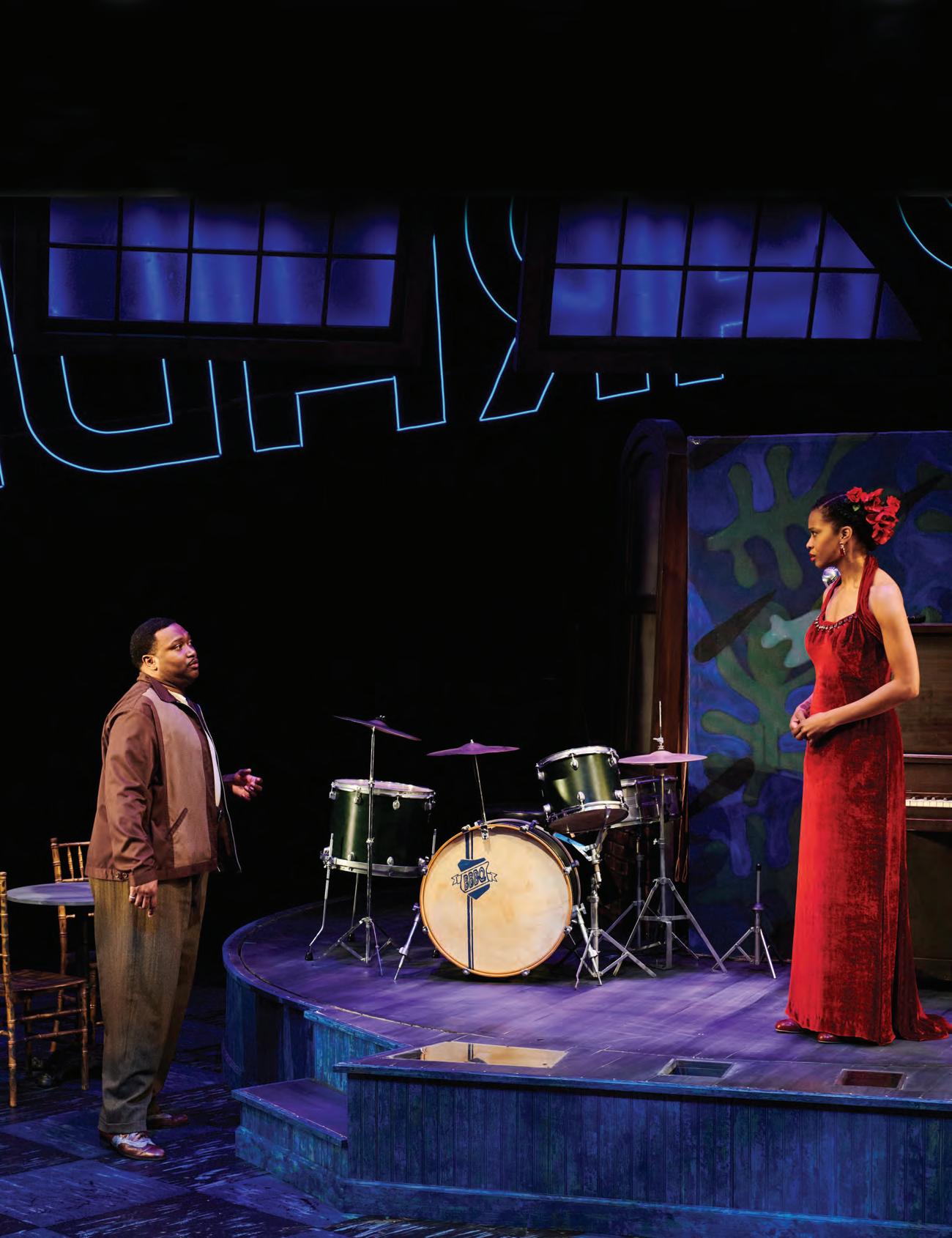 by Holly L. Derr
Kristi Jan Hoover
by Holly L. Derr
Kristi Jan Hoover
TTheatres across the country are rethinking their organizational structures in light of the forced changes brought about by the COVID-19 pandemic, calls for change from We See You White American Theatre (WSYWAT), and a recognition of the lack of diversity in theatre programming and hiring.

With an industry-wide generational shift in leadership also underway, some theatres have found this to be an opportune time to reorganize their institutions away from the singular artistic director model and to operate instead under shared artistic leadership.
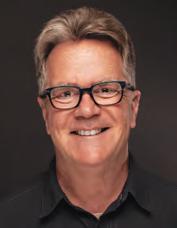
Southern Theatre interviewed leaders at three theatre companies that have recently moved to shared leadership, two companies that have created a second rung of coartistic directors for shared leadership, and three companies that were formed years ago through shared leadership. We asked these companies to share their paths to shared leadership, how their models work, and the advantages and disadvantages they are finding. Permutations of the model abound, and according to numerous artistic leaders, so do the benefits of working this way.
Theatres that recently transitioned to shared leadership
Pittsburgh’s City Theatre had already responded to WSYWAT, which calls explicitly for a “power sharing model for curation and beyond in season planning,” with a series of public commitments in November 2020. So, when artistic director Marc Masterson (he/him) began to consider retiring in a few years, it made sense for him to develop, in collaboration with a succession planning committee, a shared leadership model.
Aiming for as much stability as possible, Masterson drew from existing talent within the organization in October 2021 in naming two co-artistic directors, both of whom make the team more diverse: Clare Drobot (she/her), a dramaturg, playwright and producer, and Monteze Freeland (he/him), a Black actor, director, teaching artist and producer. To ensure there still is one point person per season, the three have been rotating by season as lead artistic director, while
achieving consensus in programming and season selection. City Theatre is two years into its three-year plan, and according to Drobot, “We haven’t set next steps after the initial three years yet.”
The call for change posted online by WSYWAT resonated with City Theatre, Freeland said, as it raised important questions about the structure, duration, gender and race of leadership – and charged theatre organizations to determine how they could bring more voices to the table.
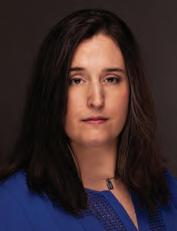
“It called for people who had been in positions of leadership for decades to decide whether or not their voice was the voice of the current climate and were they living and practicing equitable behavior and directives within their organization,” Freeland said.
Theatre organizations, including City Theatre, examined what they were producing, Freeland noted, and asked important questions: “Were those voices representative of the work they were hoping to put on stage and new audiences they want to see
LEFT: When Marc Masterson (left), City Theatre’s longtime artistic director, began considering retirement, he created a shared leadership model with two co-artistic directors: Clare Drobot (middle) and Monteze Freeland (right).
OPPOSITE PAGE: Freeland and Melva Graham appear in Dominique Morisseau’s Paradise Blue, presented in March and April as part of City Theatre’s 2022 season.
A significant challenge shared by many of the leaders engaged in shared leadership is that everything does take more time. So, if you are thinking of adopting such a structure, plan accordingly.
Winter 2023 Southern Theatre 37
come through their doors after a vicious pandemic?”
While Freeland and Masterson agreed that diversity has always been a core value at City Theatre, they believe that the greater variety of voices now at the table during season planning has enriched the process.

“[The shift to this model] coincided with COVID, actually, and we began practicing right away a collaborative decision-making process, where there was room for each of us to bring forward our passion projects and where we gave each other space for that,” Masterson said. “It wasn’t the neutral, ‘everything was consensus,’ because I think that can water things down. “
Instead, each of the co-artistic directors advanced projects that interested them.
“We did a drive-in stage,” Masterson said. “We did a lot of digital stuff. We created world premieres that were fully produced with green screens. And we did some readings and workshops and a wide variety of stuff, probably more stuff than we ever did before.”
At Virginia Repertory Theatre in Richmond, VA, three artistic directors began sharing leadership within the last year. Desirée Roots (she/her) became artistic director of community in November

2021 and was joined by Todd D. Norris (he/him) as artistic director of education and Rick Hammerly (he/him), as artistic director of programming, in March and April 2022, respectively.
Here, too, the push to have multiple artistic leaders came from the company’s co-founders, Phil Whiteway and Bruce Miller, as they planned their retirement. Surveying the company and its growth over the years, they identified three areas of importance and persuaded the Board to search for a different leader for each area. Roots, a Black singer, actor and dancer with deep roots in the Richmond community, oversees programs that connect youth with community health and wellness programs, as well as the theatre’s inclusion, diversity, equity and access programming; Norris, a director, oversees one theatre space and programming for children, families and schools; and Hammerly, also a director, focuses on the development of programming for adult audiences in two spaces.
Despite this clear division of duties, the three leaders still have to come to consensus on a variety of matters and therefore they still benefit from having more voices at the table. One example that Norris cited is their policy on masking.
“What shared leadership has allowed us to do is look at masking from different perspectives,” Norris said. “What are the adults wanting? What are the schools and the kids wanting? What are our longtime subscribers saying? What are potential new subscribers telling us? And just as human beings, we’re going to have slightly different perspectives on it as well.”
At theatres that have recently made the transition, it can be difficult for leaders to parse the difference between the challenges of a shared leadership structure and the challenges of the simultaneously occurring pandemic and the upheaval that followed the murder of George Floyd.
Like City Theatre and Virginia Repertory, the Wilma Theater in Philadelphia – which produced the film that made James Ijames’s play Fat Ham eligible for its 2022 Pulitzer Prize – has been in the process of shifting to shared leadership with a rotating lead over the same years in which it has faced the pandemic. As was the case at City, the Wilma’s leaders responded with innovative digital programming that has expanded its audience far beyond Philadelphia.
As the pandemic began, the Wilma had reached a point where succession planning was necessary. Blanka Zizka (she/her),
ABOVE: Virginia Repertory Theatre recently moved to shared leadership, with (left to right) Rick Hammerly, Desirée Roots and Todd D. Norris sharing artistic director duties.
38
Winter 2023
RIGHT: Marjie Southerland portrays Harriet Tubman in Virginia Rep’s Harriet Tubman and the Underground Railroad, a 2020 children’s theatre production that was presented in a socially distanced format.
x Southern Theatre x
artistic director emeritus and co-founder, says the idea to combine succession planning with a shift to shared leadership arose out of the work happening in the rehearsal room with the Wilma’s company of actors, HotHouse. In fact, Zizka raised the money necessary to pay multiple artistic directors as part of a Transformation Fund that also invested in their lobby as a public gathering space and in the HotHouse company.
Developed in 2011, according to their website, “in order to develop a process for creating the trust that underlies the creation of living, adventurous art,” HotHouse is composed of 16 Philadelphia actors that host various guest directors and artists who are invited to share their techniques and methodologies. The idea is that these artists, who come from around the world and have their own companies, would “work with the actors, using their techniques, so that they would be learning from them how to create, how to unify a company,” Zizka said.
Zizka found the work to be profound and hugely interesting, resulting in “a really strong, deep collaboration with the actors,” she said.
“So, when we were working on a production, it was not me directing in that old-fashioned sense of me having complete vision – of course, I had a vision of the piece – but there was an experimentation that was part of the process, so that we were sharing the knowledge of the process and what we had learned into creating the characters on stage, creating a piece together.”
That process was “pretty radical for the kind of American nonprofit theatre of the size that the Wilma is now,” Zizka said.
Her interest in bringing that process into the theatre’s own operations led to the move toward shared leadership. Zizka chose a diverse group of three directors to become co-artistic directors: James Ijames (he/him), a playwright and Black man who was the first lead after Zizka in the rotation; Russian-born Yuri Urnov (he/him), who was next up; and Morgan Green (she/her), the current lead.
Unlike at City Theatre, the Wilma has used a model in which the concept of a rotating lead applied to the curation of a season as well, with each lead in turn having final say on their year’s programming. Nevertheless, Green describes a very collaborative process, when it was her turn as lead, with at least six voices at the table: the other two artistic directors, the artistic associate, the managing director and an artistic intern.
In the end, though, Green says, “It is a season that is very reflective of me and my taste in conversation with the Wilma’s history and aesthetic. So, I think it was a happy medium that we found together. It is a diverse season, in terms of the types of stories that we’re telling and who is telling them.”
Although the Wilma has taken major steps toward greater diversity and equity, Green says the theatre hasn’t yet reached its goal in that area.
“I think we’re on a journey in terms of diversity and equity work at the Wilma,” Green said. “We’re very much in process, making a lot of policy changes.”
For example, she said, the Wilma shortened the work week to five days and eliminated 10 out of 12s. It also developed a set of values to guide decision making.

“We also are working with an EDI [equity, diversity and inclusion] officer for every production now, who we’re going to hire as an employee next season, and there’s a larger organization-wide blueprint of EDI work that we’ve developed together,” Green said.
After its successful first round of rotation, the Wilma is now looking at an evenmore-shared leadership model in which, rather than rotating as lead, the co-artistic directors share equally in all the decision making.
“We’re currently designing the way to continue with shared leadership but remove the component that’s cycling,” Green said. “So, it’s not like each person gets one year to curate, but that there’s a team of three people moving forward
Winter 2023 Southern Theatre 39
and there’s some mechanism to still cycle the people, but over a longer period of time.“
That change comes, she said, from their recognition that “this rhythm of gearing up and then curating one year, one season, is not sustainable, because the work of curating takes a lot of time to build relationships and develop projects, and it needs more momentum. So, we’re trying to figure out how to keep the many voices in conversation about big decisions, but also find some sturdier stability for the theatre to move forward.”
Theatres with multiple associate artistic directors
Some theatres, like Center Theatre Group in Los Angeles and the Oregon Shakespeare Festival in Ashland, have met the challenge of maintaining stability during a leadership transition, a pandemic and a racial reckoning by keeping the singular artistic director model in place while diversifying and expanding the number of
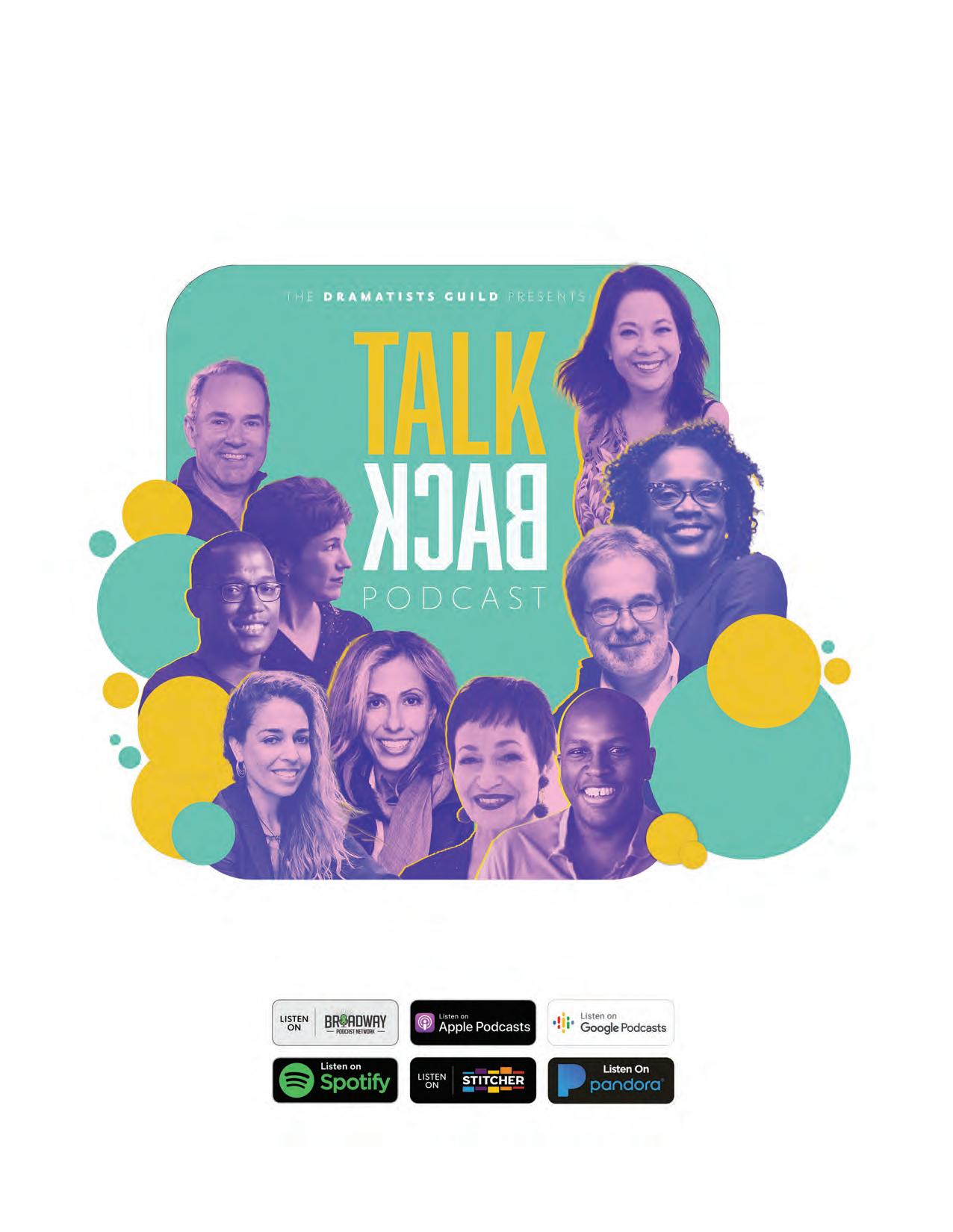

associate artistic directors who constitute the next rung on the organizational chart.
Center Theatre Group (CTG), which presents productions at the Mark Taper Forum, the Ahmanson Theatre and the Kirk Douglas Theatre in Los Angeles, is currently transitioning from the longtime leadership of Michael Ritchie to a yet unchosen new artistic director. Ritchie had so much confidence in the idea of shared leadership that he stepped down even earlier than originally planned to make room for new voices.
While the search for a new artistic director has continued, the artistic side of things has been run by five associate artistic directors: Kelley Kirkpatrick (he/ him); Lindsay Allbaugh (she/her); Tyrone Davis (he/him); Neel Keller (he/him); and Luis Alfaro (he/him), who recently left the position to devote more time to teaching and writing.

The team worked with a consultant, Mica Cole, to build a firm foundation for


 ABOVE: Blanka Zizka (second from left), co-founder and artistic director emeritus of the Wilma Theatre, chose a diverse group of three directors to become co-artistic directors before she stepped down from her lead role: James Ijames (left), Yuri Urnov (second from right) and Morgan Green (right).
ABOVE: Blanka Zizka (second from left), co-founder and artistic director emeritus of the Wilma Theatre, chose a diverse group of three directors to become co-artistic directors before she stepped down from her lead role: James Ijames (left), Yuri Urnov (second from right) and Morgan Green (right).
40 x Southern Theatre x Winter 2023
LEFT: Brennen S. Malone plays Juicy in Wilma Theater’s 2021 film of Fat Ham, which made the play by Ijames eligible to win the 2022 Pulitzer Prize for Drama.



4
their work together, based in a shared sense of mission, vision and values.
“This has been a much more meaningful and deeper way of working because of the collaboration and the necessity to have conversations with the group and hear all the different points of view,” Kirkpatrick said.
Planning a season collaboratively also has had a significant impact on the institution: The upcoming season that the team curated for the Mark Taper Forum is not only centered on women, non-binary and trans voices, but also will feature a majority of Los Angeles-based actors, designers and directors, and will feature its first play by a Native American playwright. The collaborators credit this change not just to having more voices in the room, but also to centering anti-racism and serving Los Angeles as two of their shared values.
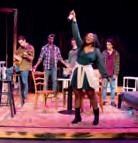
While the CTG Board has been a champion of the structure, it will be up to the incoming artistic director (or directors) to decide whether to continue using it. In the

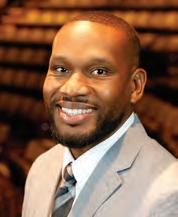
meantime, the impact is being felt all over the organization.
“As an organization, we’re talking about it, but also departments individually have been talking about: ‘How do you flatten hierarchy? How do you share power? What is shared leadership?’ ” Allbaugh said.
As staff in those other areas of CTG work in this way with each other and with Meghan Pressman, the managing director/ CEO, they are moving from simple discussion to action on the issues.

“I see other departments, particularly our production department, really making great strides in this direction as well,” Allbaugh said. “So, I think it’s a long-term
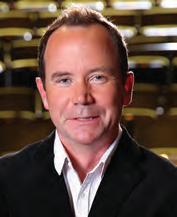
investment in completely changing institutional theatre.”

Oregon Shakespeare Festival (OSF) transitioned in 2019 from the long-time leadership of Bill Rauch to Nataki Garrett, who hired a diverse team of three immigrants as her associate artistic directors – Scarlett Kim (she/her), Evren Odcikin (he/him) and Mei Ann Teo (they/them) – to oversee artistic programming, innovation and strategy, and new work, respectively.

The reorganization was, in this case, not a response to the pandemic and WSYWAT, but instead was part and parcel of an emphasis Garrett put on innovation, including producing digital theatre,
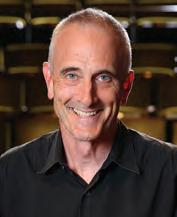 TOP: Center Theatre Group is operating under shared artistic leadership, currently with four associate artistic directors (left to right): Kelley Kirkpatrick, Tyrone Davis, Lindsay Allbaugh and Neel Keller. A fifth associate artistic director, Luis Alfaro, not pictured, stepped down recently.
BOTTOM: Center Theatre Group / Mark Taper Forum presented the West Coast premiere of Lynn Nottage’s play Clyde’s, which ran from Nov. 16 through Dec. 18, 2022. Featured in a scene from the play are (left to right) Nedra Snipes, Garrett Young, Reza Salazar and Kevin Kenerly.
TOP: Center Theatre Group is operating under shared artistic leadership, currently with four associate artistic directors (left to right): Kelley Kirkpatrick, Tyrone Davis, Lindsay Allbaugh and Neel Keller. A fifth associate artistic director, Luis Alfaro, not pictured, stepped down recently.
BOTTOM: Center Theatre Group / Mark Taper Forum presented the West Coast premiere of Lynn Nottage’s play Clyde’s, which ran from Nov. 16 through Dec. 18, 2022. Featured in a scene from the play are (left to right) Nedra Snipes, Garrett Young, Reza Salazar and Kevin Kenerly.
42 x
2023
Craig Schwartz Photography
Southern Theatre x Winter







www.SetRentals.com/SETC Email: rentals@thegateway.org ready-SET-go! Elevate Your Art ORDER YOUR BROADWAY QUALITY SET TODAY! Phantom Rent SET RENTALS We have an inventory of dozens of complete set rental packages, props and drops that we can ship across the continental United States! Our professionally designed and constructed rental packages will bring the look of Broadway to your stage, whether you're a large regional theatre, or a small high school.
Heels NEW FOR 2022!
Head over
WHY STUDY THEATRE AT SEWANEE?
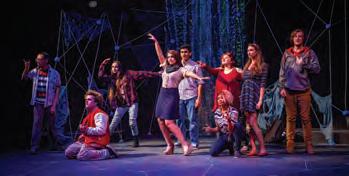

LEFT: Increased innovation was the goal of Nataki Garrett, artistic director of Oregon Shakespeare Festival, in moving to shared leadership with the appointment of three associate artistic directors: Scarlett Kim (top), Evren Odcikin (middle) and Mei Ann Teo (bottom).
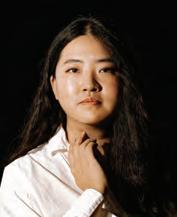
ABOVE: Carolina Vargas portrays Guiderius in a scene from The Cymbeline Project, a 10-episode digital production conceived by Garrett and created by Kim, which interweaves theatrical performance and digitally rendered visual layers to create an experience that is part theatre, part film. Episodes were available for streaming or on demand in November and December 2022.

film and virtual reality experiences.
As an example, Kim pointed to an artist who came to direct a play, but also made two short films and did two VR experiments.
“Nataki’s vision for OSF is a radically expansive artistic home where an artist can come and rehearse different versions of themselves and their practices,” Kim said.

The idea is to open the door for artists to express their creativity as it evolves.
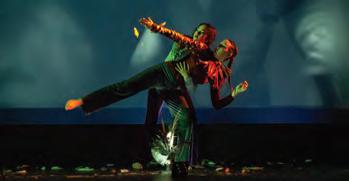
“As a shared artistic leadership team, we are charged with actualizing OSF as a ‘container for the future,’ per Nataki’s call to action,” Kim said. “OSF is a ‘container for the future’ that is ever-evolving, that is always iterating to respond to the needs and the ambition and the intuition of the artists in the moment. And that will always change as the current of the world changes.”
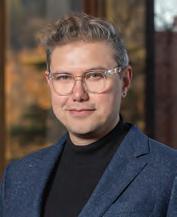
The change is so sweeping as to include the physical building in which they work. No longer a row of separate rooms, OSF’s offices have been transformed to an open-concept workspace.
“I think that that is actually a beautiful metaphor for how this is all starting to function,” said Teo.
A focus on centering the most marginalized voices led to a 2023 season that Odcikin called “very Black identity forward. It’s very immigrant forward. It’s very queer forward. Our first four directors are Black in the season, and we didn’t try to do any of those things. I did not realize that until after we were done with the season planning and looked at it.”
Odcikin noted that the selection of Black directors was not a goal that was set for the season or a “box” they were trying to check. Rather, he said, it’s what happened as a result of deep discussions about identity and artistry.
“[It] turns out if you put these people in a room and have that kind of conversation, a lot of Black directors end up in the repertory season,” Odcikin said. “You don’t have to watch out for those things that other theatres do to not mistakenly end up with an all-white season.”
A chance to explore all aspects of theatre—acting, design, directing, playwriting, history, and theory.
The Tennessee Williams Center—a state-of-the-art facility featuring two theatres, design and scenery studios, and more.
Major and minor in theatre arts, minor in dance.
Expanded financial aid program to
the full
of
The Sewanee Pledge—study abroad, get funding for an internship, and you’ll graduate in four years. Guaranteed!
meet
need
those who qualify.
Learn more at theatre.sewanee.edu 44 x Southern Theatre x Winter 2023
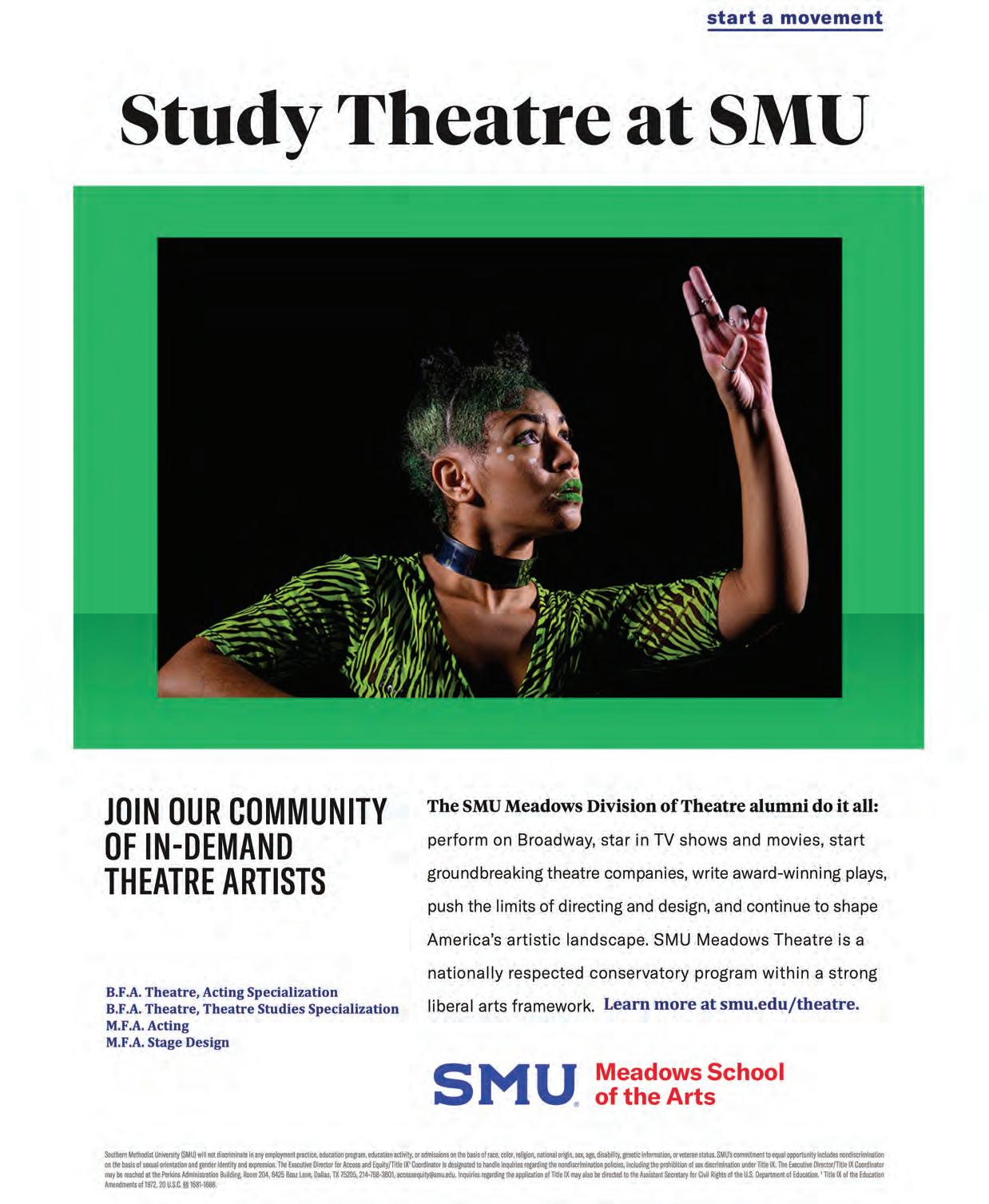
Teo cautions against anyone attempting to exactly replicate what they’ve built at OSF, arguing that different theatres should have different management structures.
“I don’t believe in the replication of it, because all structures are broken in some way,” Teo said. “The nonprofit structure is broken, but also has power in making potent and necessary cultural production possible. A structure that works has to be iterative and responsive to the moment at hand. And Nataki’s vision requires this structure. It actually requires it. So, it’s like making art – we’re finding the form that fits the content.”
Theatres that were founded with shared leadership
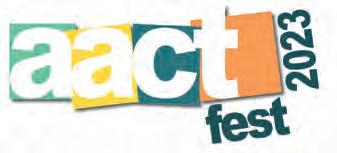


While transitioning to more shared leadership may be a trend in the industry, perhaps the leaders most suited to give advice on how to share artistic power are
those who founded their companies with that principle in mind, such as Detroit Public Theatre, the Austin-based collective the Rude Mechs, and Los Angeles’ Artists at Play.

When Sarah Clare Corporandy (she/ her), Courtney Burkett (she/her), and Sarah Winkler (she/her) co-founded Detroit Public Theatre in 2015, playwright and actor Dominique Morisseau (she/her) was on the advisory board. From there, she joined the board, and then in 2020 she joined the staff as executive artistic director, forming a four-person leadership team with the three producing artistic directors. Rather than using a rotating model, the four leaders at Detroit Public Theatre share in all decision making.

“We all work together, and we lean on each other’s strengths and support each other’s weaknesses,” Corporandy said.

AACT Webinars Online Roundtables Virtual Masterclasses Industry Connections Script Club aact.org/webinars aact.org JOIN NOW!
Helping Theatres Thrive
AACT is the place to go for connections to resources and tools that you need to create theatre Introductory rates for first time members June 12-17, 2023 Louisville, KY Register NOW! aact.org/23
photo: Colvin Theatrical The Mountaintop The Lexington Players, Lexington, MA
ABOVE: Carolette Phillips and Henri Franklin appear in Detroit ’67, Detroit Public Theatre’s 2022 production of Dominique Morisseau’s acclaimed play set against the backdrop of the 1967 Detroit riots.
46
RIGHT: The leadership team at Detroit Public Theatre consists of (left to right): Sarah Winkler, Morisseau, Courtney Burkett and Sarah Clare Corporandy.
x Southern Theatre x Winter 2023
DON'T BREAK A LEG INSTALL INCORD NETTING
InCord is North America's largest custom netting fabricator, providing the best products worldwide since 1995.


Our products are custom-designed with safety; our commercial-grade materials are rigorously tested and continue to exceed industry standards. Let us focus on safety so you can focus on staging.
We purchased your Orchestra Pit Net about 3 or 4 years ago. Last night during a performance, a performer fell into the pit and was properly arrested by your net. Thank you!!




Joe Menhart: 860.531.1046 theatre@incord.com www.incord.com/theatre
ORCHESTRA PIT NET - STAGE GUARD™ - CATWALK SAFETY SYSTEMS - SCENIC ELEMENTS
BRAD Kennesaw University
Contact your distributor for more information or contact InCord directly to be connected with one of our trusted, nationwide partners in safety. Fully Customizable Optional Features Tested and Trusted
That said, the division of duties between the leaders at this theatre, where there is no managing director, is explicit: Corporandy heads up strategic planning, finance, contracts and HR; Burkett directs marketing and production; Winkler oversees development and board relations; and Morisseau manages what could be called external affairs. (Morisseau, a Black woman, volunteered herself for the job to make her role within the artistic leadership of the company more visible and the artistic leadership of the theatre more representative of the city of Detroit.) At the same time, the value of collaboration permeates all of their planning.
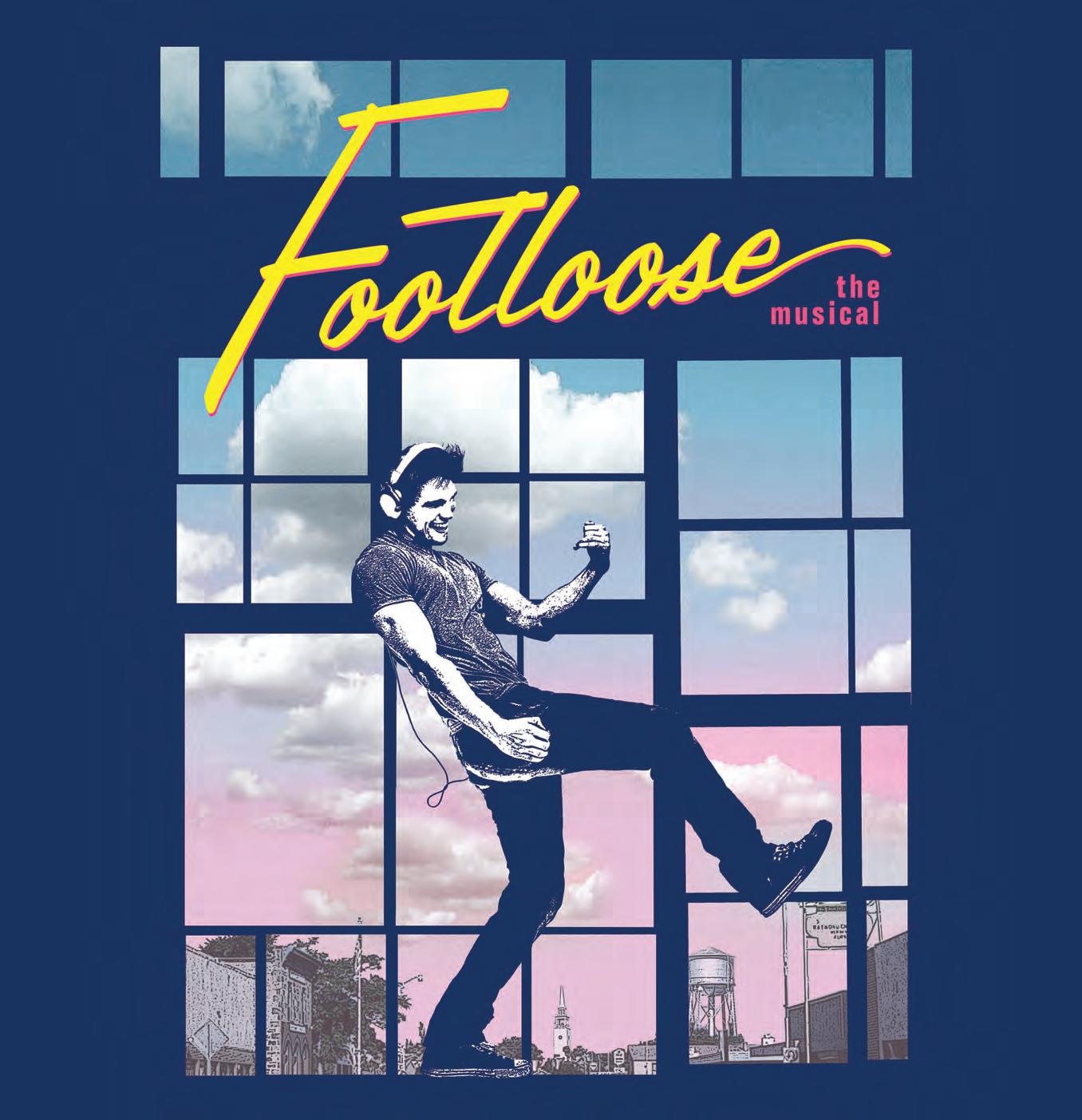
“Even though I’m the money person, there are things where I want Winkler’s opinion because she’s looking at it from this direction,” Corporandy said. “I want Courtney’s opinion because she’s looking at it from this direction.
Corporandy noted that, after working for a long time herself on the season eight budget, she felt it was important to have the co-artistic directors weigh in as well.


“They think of things that I don’t,” she said. “And that’s one of the ways the collaboration is at its strongest – it kind of takes the pressure off of having to be perfect at everything.”
Other benefits of working this way, Corporandy said, include getting the opportunity to tap each other’s strengths.
“There are times where I’m like, I don’t know a lot about that, but Courtney [does] – I can ask her,” Corporandy said. “There
are also times where I’m like, I’m not great with that person or I’m having a bad day or I’m over my limit, or Sarah’s temperament is better for that, or Dominique’s temperament is better for that conversation. And so now, instead of being one person having to be able to do it all and handle every personality and have all the answers, there are four of us.”
Though their board required detailed job descriptions and an organizational chart to put their full faith in such a collaborative model, Corporandy describes the theatre’s management ethos as: “Be nimble and expect to have to solve problems.”
“In the way that we work, we are nimble and responsive to change,” she said. “And you know, COVID taught us that, too. How many business plans did we all make, how many budgets did everyone make over and over and over again? How many scenarios? So, I don’t ever want to be so tied down in a structure that we can’t pivot, because I think that’s our strength. I don’t have all the answers, but that’s how we work in general is that it’s okay to pivot, to change.”
She also said artistic leaders working in shared leadership need to balance their egos with the needs of the moment.
“You have to let go of the ego when you’re sharing that much,” she said. “There are times when I’m reading the room and [it’s clear] this room doesn’t need another artistic opinion from me. Even though I’m a producing artistic director, I’m not going to give it ... So, there are some times we have to make choices about that. When do I get
Rude Mechs was founded in Austin, TX, more than 20 years ago with shared leadership. The current coproducing artistic directors, shown in 2017, are (left to right): Lana Lesley, Kirk Lynn, Madge Darlington, Shawn Sides and Thomas Graves.
48 x Southern
2023
Rino Pizzi
Theatre x Winter
Footloose, the exhilarating movie musical adaptation, celebrates its 25th Broadway anniversary in 2023! Let your audience cut loose to the rhythm of its rockin’ score, featuring Top 40 hits and electric new songs for the stage. More at concordsho.ws/Footloose

@concordshows
25 YEARS
to step in, in that role? And when do I not step in, in that role, because it’s someone else’s turn?”
Austin’s Rude Mechs became an institution in 1998, years after this group of likeminded artists began working together, so when it came to defining the organization’s structure, it made sense to replicate their collaborative rehearsal room practice in the administrative structure of the company, co-founder Shawn Sides (she/her) said.
While the division of duties between the five co-producing artistic directors –Madge Darlington (she/her), Thomas Graves (he/him), Lana Lesley (she/her), Kirk Lynn (he/him) and Sides – is less explicit than at Detroit Public Theatre, co-founders Lynn and Sides echoed Corporandy’s sentiment on the challenge of having to remove their egos from the decision-making process.

“I think we have lots of discipline, meaning it’s very fluid. I think we trust
ourselves to be quiet when we don’t have either a strong opinion or it’s not our area of expertise,” said Lynn.
Sides said their process “kind of evolved over time, more than anything else as a time-saving device, because earlier meetings could be completely interminable. You have an opinion to say about, like the font –oh my Lord, how many long conversations do we have about font?”
Lynn agreed, saying, “Different ones of us like having say about different things. I never particularly care about the marketing and design ’cause I’m not a very visual person. And then, when something really matters to you, you speak. It’s a way that you can have a say about the things that matter to you, but also feel that other people are watching out for the parts that are less your strength.”
The producing artistic leaders of Artists at Play, a Los Angeles producing collective focused on exploring Asian American experience that was founded in 2011 under shared leadership, agreed that co-artistic leaders have to know their own strengths and weaknesses and respect one another’s professional expertise.
Although a three-person team consisting of Julia Cho (she/her), Stefanie Lau (she/her) and Marie-Reine Velez (she/ her) shares fiduciary responsibility for the company, Cho tends to run their crowdfunding campaigns, while Lau shepherds the creation of the budget. In terms of shared values, an annual retreat brings the collective together “to really check in with each other and revisit our lives, our work, our mission, our vision,” Cho said.

Because they aim to serve a diverse Asian American and Pacific Islander community, these producing artistic leaders value having multiple voices at the table.
“We need to make sure we’re not just focusing on the East Asian communities,” Cho said. “We’re trying to expand what Asian American theatre means to us, to our audiences, and to be as diverse and inclusive as possible with what we choose to present. Having all those different
mindsets and perspectives in the room can only lead to more innovative and exciting conversations, and it opens you up to more possibilities and forces you to confront your own biases or close-mindedness. And I think that’s all for the better – nothing but good can come from being challenged and listening and learning.”
Shared leadership: pros & cons
A significant challenge shared by many of the leaders engaged in shared leadership is that everything does take more time. So, if you are thinking of adopting such a structure, plan accordingly. Not only do the co-producing artistic directors of the Rude Mechs go through the budget together line by line, but according to Lynn, “When things are working really well, when we write a grant, everybody has touched the grant, and it deepens through the questioning and having five brains who are passionate look at it from different points of view.” One need not have written many grants to imagine how long that takes.
CTG’s Allbaugh echoed that time is a challenge, but added that, ultimately, it is also a benefit: “When you really are being thoughtful and generous and working in a
BA/BS in Theatre NAST Accredited Scholarships Available www.radford.edu/theatre 540-831-5141
50 x Southern Theatre x Winter 2023
Artists at Play was founded more than a decade ago by three women who jointly serve as producing artistic leaders – (left to right) Stefanie Lau, Marie-Reine Velez and Julia Cho – and Peter J. Kuo, who left the organization in 2015.
new way, things do take longer. It does take longer when you have five artistic people making a decision. So, we’re constantly trying to find the balance between deadlines and making sure we really investigated and have been thorough about our decision making.”
For example, Allbaugh said, “One of the things that we are really trying to break down across the institution is just going to the same people we’ve always gone to because it’s easy. And we go, oh, that guy takes our photos, and this person is our printer. Thinking about who our vendors are, that takes more time.”
She recommends “getting out ahead of those decisions so that you can thoughtfully think about other people to bring to the table that can do the job just as well or better.”
At Virginia Repertory, the need for more time for planning and decision-making has also been both a challenge and a boon.
“Issues get considered more deeply,
more carefully, which takes more time,” Norris said. “You just have to remind yourself, this is going to take longer, a season selection process is going to take longer if you are trying to bat about philosophical questions about ‘What kind of a theatre do you want to be? What do you want your theatre to stand for in the community?’ Those conversations are longer now, and it’s good for the results.”
All of those who spoke to Southern Theatre find the benefits of shared leadership, such as more imaginative programming and more innovative collective problem-solving, far outweigh the challenges. Some leaders even experience increased work/life balance.
“Everybody’s life goes through these different phases and different moments and different biologies and dependencies, and different people can be leaders at different times,” said Lynn of Rude Mechs. “It’s like, this is really Lana and Shawn’s company for a while because they had
this passion, and now it really feels like it’s Thomas and Madge’s company for a while – not in any big way that anybody else might notice, but just the power and the energy and the passion can sort of rotate. We sometimes talk about the metaphor of a cycling team, where different people can be the leaders and everybody else can draft for a while.”
Whether creating a theatre from the ground up, dealing with COVID-related challenges, meeting the demands of WSYWAT, or planning a leadership succession, theatre leaders may want to explore the shared leadership model as a way to move toward decision making that is more inclusive, diverse and innovative. n

Holly L. Derr is the artistic director and head of graduate directing at the University of Memphis. The founding artistic director of SKT, Inc., she has directed for numerous theatres. Her writing credits include The Atlantic, HowlRound, Ms. Magazine, Slate and Bitch.

51
Winter 2023 Southern Theatre
GOING BACK Which Pandemic-Inspired Changes Will Continue at Theatres, Schools?
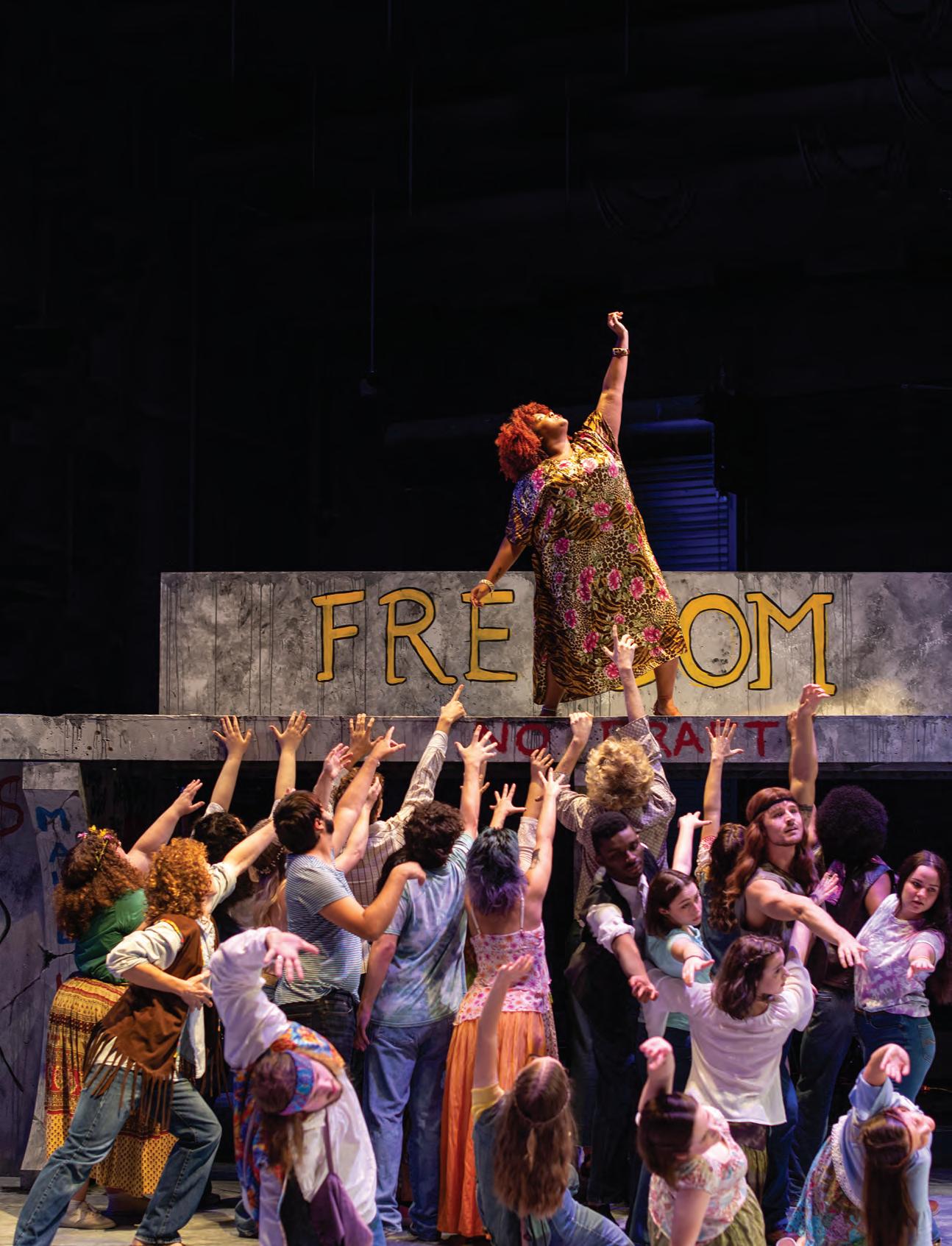 by Scott Hayes
Kasey Brookshire
by Scott Hayes
Kasey Brookshire
AAs members were coming home from the 2020 SETC Convention in Louisville, residents all over the United States began to receive confirmation that COVID-19 was spreading nationwide. Within two weeks, nearly every company and school offering theatre programs was dealing with a brand-new question: How can we teach and produce theatre when we cannot gather together?
Now, after nearly three years of testing, masking, social distancing, virtual productions, video conferences and other pandemic-necessitated actions, theatre companies and programs face another question: What changes to theatre production and training that came with the pandemic will continue into the future?
More than 150 individuals in SETC’s database responded to a Southern Theatre survey on this topic, with 60% of the responses coming from professional, community and outdoor theatre companies and 40% from university and professional theatre training programs.
From video auditions to online classes, we share on the pages that follow their thoughts on what will remain and what will disappear.
Auditions, interviews and portfolio reviews
Video submissions, long a requirement for film and television work, became the only option for most theatre auditions and interviews during the pandemic, and 69% of the survey respondents indicated this change would be permanent, at least for the first rounds of activities. While some respondents noted that video auditions are not always ideal for getting to know the auditionee, others said they are helpful in that they provide greater accessibility for auditionees and often at a lower cost for the theatre as well.
Some respondents, like Nathanael Fisher (he/ him), producing artistic director at Emerald Coast Theatre Company in Destin/Miramar Beach, FL, regularly used video submissions prior to the pandemic, but have seen a large increase in these submissions since 2020.
While Melanie Cornelison-Jannotta (she/her), executive director of The Prizery in South Boston, VA, did her 2022 casting through video submissions, she says the practice has limitations: “I think it’s a great tool for finding people you are interested in, but I really want to have callbacks in person before casting.”
Others say they expect initial auditions to continue as video submissions, with “live” callbacks over Zoom or other videoconferencing platforms.
“Zoom allows us to provide re-directs and interviews in real time, face-to-face. This saves time for
all,” said Lynn Stallings (she/her), executive director of Atlanta Workshop Players, which plans to continue both online and in-person auditions.
The Dollywood entertainment park in Pigeon Forge, TN, also holds both in-person and video auditions, but “we always prefer in-person interviews and auditions. Always,” said Roger White (he/him), entertainment manager.
At colleges and universities, plans vary. Karen Brewster (she/her), chair of the East Tennessee State University Department of Theatre and Dance, said her department plans to keep using video submissions until the pandemic is completely over, but she is “not sure if we will keep video beyond that.”
Dick Block (he/him), associate head of the School of Drama at Carnegie Mellon University in Pittsburgh, PA, noted that his institution has always allowed “both online portfolio submissions and interviews/ reviews.” On the other end of the spectrum, Paul B. Crook (he/him), executive director of the Etherredge Center and External Programs at the University of South Carolina Aiken, said his school’s small department did not use video for auditions or interviews prior to or during the height of the pandemic and doesn’t plan to in the future.
The Theatre and Dance Department at Georgia College & State University in Milledgeville has “embraced video interviews and meetings,” said Eric Griffis (he/they), interim chair.
Opposite page: Theatre and school representatives say many changes instituted at the height of the COVID pandemic will continue at least short-term going forward, but most don’t plan to present streamed or online shows, except in special cases. Instead, the great majority have returned solely to live shows, like this 2021 production of Hair at Piedmont University in Demorest, GA, featuring Brittany Wilder as Dionne, a vocal member of The Tribe.
Winter 2023 Southern Theatre 53
Shelly Elman (she/her), chair of the Department of English, Film, Languages and Performing Arts at the University of West Georgia in Carrollton, acknowledged that while her department accepts video auditions, in-person is preferred.
“We like the face-to-face auditions because we want to talk with the student as well as audition them,” Elman said. “If we use a tape, the interview doesn’t necessarily happen.”
Understudies, swings, multiple casts and crews
Most survey respondents acknowledged that the pandemic affected their use of understudies, swings or other forms of substitute cast or crew members. Before the start of the crisis, only 19% of respondents represented institutions with an understudy or swing policy, but that number has risen to 54%. The specifics of the policies differ.
Shenandoah Summer Music Theatre in Winchester, VA, has always used understudies from within the company, according to Elizabeth Albert (she/her), managing director. But as the pandemic continued, she said, “we have had to hire separate swings and assign understudies to every principal role, which is an added cost.”
Additional swing hires have been necessary at Jobsite Theater in Tampa, FL, as well, with “folks in smaller roles prepared to step into larger from the beginning,” said David M. Jenkins (he/him), producing artistic director. “Directors and other company personnel are also being conscripted, for a lack of a better way of putting it, to go in.”
Marina Hunley-Graham (she/her), artistic director of the Unto These Hills outdoor theatre in Cherokee, NC, said her theatre began using three tiers of understudies in 2021.
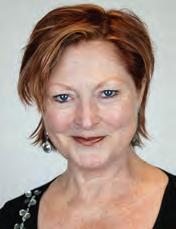
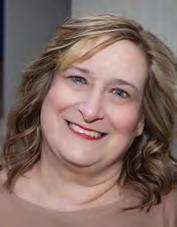
“Before, it was just the role and one understudy,” she said. “We found a need for a fourth tier this year.”
Swings have played an important role at Creative Greensboro (NC) during the pandemic, according to Todd Fisher (he/ him), performing arts coordinator.
“We would have had to cancel several performances if it wasn’t for swings,” Fisher said. “They were considered part of the cast and even given a bow if they did not perform that evening.”
Other institutions have not used and do not plan to use understudies or swings. The added cost of understudies or swings is beyond the means of many theatres that have suffered income losses during the pandemic, said Donna Northcott (she/her), the founding artistic director for St. Louis (MO) Shakespeare and Magic Smoking Monkey Theatre.
“We are a non-Equity company and working on an even tighter budget as a result of being without income for two years,” Northcott said. “Paying even an honorarium to understudies/multiple casts is just not an option.”
Todd Davison (he/him), artistic director at Maples Repertory Theatre in Macon, MO, said his theatre is in a similar situation.

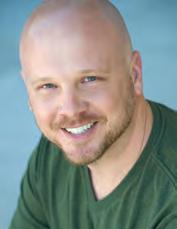
“Our runs are short, and we have rolled the dice on people staying healthy,” Davison said. “We’ve had emergency understudies go on book-in-hand and we have had to cancel shows because a key player was quarantined. However, in the future we will still likely operate without understudies as we are still in a very precarious funding situation.”
Finances aren’t the only reason some theatres continued without understudies or swings during the height of the pandemic. Mark Chenovick (he/we), artistic director at SecondStory Repertory in Redmond, WA, noted that hiring “understudies and swings give actors the impression that
they are easily replaced. It also creates unnecessary competition and comparison within the cast.”
While more than half of theatres reported hiring swings or understudies, few theatres said they had put formal protocols in place to create multiple crews or crew substitutions. Only one-fifth of the survey respondents said they now use crew substitutes, and most of these said they cover their needs using less structured processes such as having present crew members take over the work for missing personnel.
“Since the pandemic, we are now crosstraining many of our tech personnel to be able to use them as needed, where needed,” said Thom Wilson (he/him), first vice president at Tablerock Festival in Salado, TX.
Several respondents noted they did not have enough personnel for existing crew needs, let alone substitutes.
Streaming productions
Half of the survey respondents reported streaming productions during the pandemic. However, nearly all of these respondents were from colleges and universities. Most stand-alone companies responding to the survey said they could not overcome the financial or logistic issues required to stream productions.
One of those noting that difficulty was Valerie Rachelle (she/her), artistic director at Oregon Cabaret Theatre in Ashland.
“For a small theatre, it’s not as simple as just pointing an iPhone and putting it on a live social media platform,” Rachelle said. “There are rights and royalties to pay to the writers for the piece, the actors, the unions, the streaming service you use,
Melanie CornelisonJannotta
Roger White
Nathanael Fisher
54 x
x Winter 2023
Lynn Stallings
Southern Theatre
Dick Block

as well as the cost your ticketing system charges you, etc.”
At colleges and universities, the trend toward streaming has slowed as the pandemic eases. Less than 20% of the colleges and universities that streamed during the pandemic planned to continue the practice for copyrighted titles. Five respondents said they planned to stream only works that were also presented in front of an audience.
A number of respondents, including Riley Risso Coker (she/her), producing director at Oklahoma Shakespearean


Festival and director of theatre for Southeastern Oklahoma State University in Durant, expressed disdain for the practice.
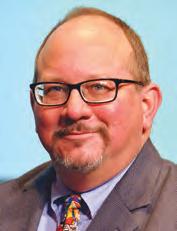


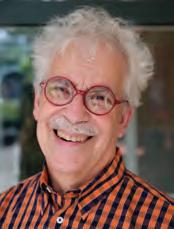
“We are trying very hard to get our audiences back into the theatre,” Coker said. “Streaming our productions does not accomplish that.”
William Morgan, artistic manager for the Cleveland (OH) Hearing and Speech Center, which presents SignStage, a deaf awareness program using theatre techniques to educate audiences about Deaf culture, also called for theatre to return to the stage.


 Karen Brewster Eric Griffis Paul B. Crook
Karen Brewster Eric Griffis Paul B. Crook
55
Winter 2023 Southern Theatre
“Theatre was invented as an in-person live event,” Morgan said. “If you’re not doing in-person live performances, then you’re not doing theatre. Don’t change the definition. Theatre is for live performing That’s what theatre is!”
Even with the generally negative view of streaming, some respondents acknowledged they would use or would consider using streaming for specific purposes. For example, some said they planned to continue streaming original work, crediting the pandemic for the change.
Brent A. Menchinger (he/him), chair

of Theatre at Murray State University in Kentucky, said his school found recorded productions to be a way to reach school children inexpensively: “We recorded public domain scripts and short original plays with author permission. We shot them like a film, then posted on YouTube or sent them to K-12 schools at no charge.” Other continuing production-related changes



Most of the production-related changes that respondents said they expected to continue were related to COVID-19 safety protocols. Many noted plans to

 Marina Hunley-Graham
Marina Hunley-Graham
56 x
2023
Elizabeth Albert Todd Fisher Riley Risso Coker
Southern Theatre x Winter
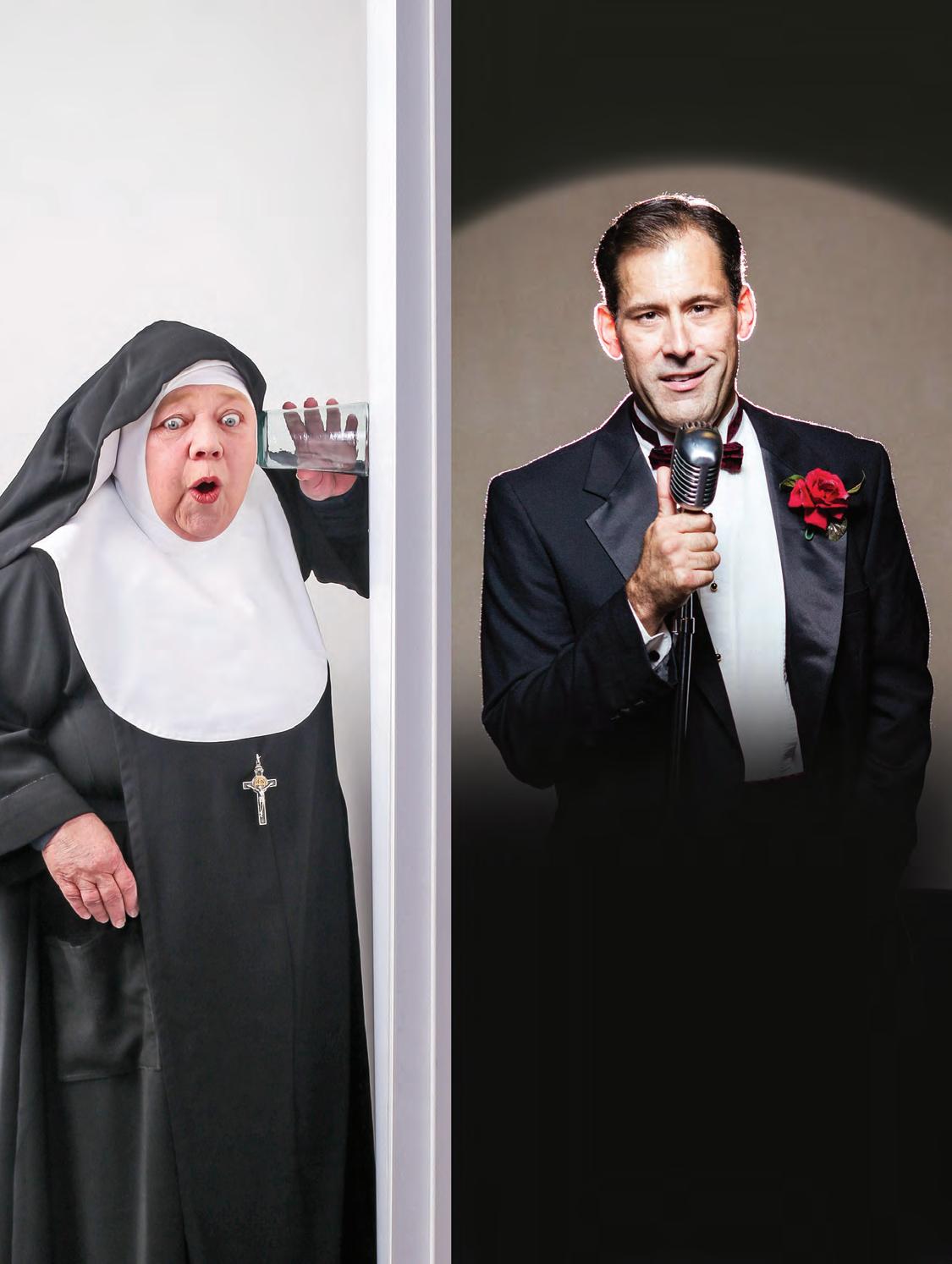
continue masking, temperature checks, social distancing, proof of vaccination and quarantine/isolation protocols. These were generally based on what was mandated by their institutions and/or local and state governments.
Wm. Perry Morgan-Hall (he/him), director of the musical theatre program at Greensboro (NC) College, said seating plans at his institution would still use social distancing measures. Jon A. Putzke (he/him), artistic director at Vero Beach (FL) Theatre Guild, also planned to keep seating adjustments made during the pandemic in place.

“We reconfigured the seats in our theatre so the rows are now six feet apart and will be left that way permanently,” Putzke said. “Patrons love the wide-open aisles in front of each row.”
Other changes that began during the pandemic and may become permanent at some theatres include digital programs and an emphasis on digital tickets. For example, Venice (FL) Theatre no longer keeps its in-person box office open full-time, said Kristofer Geddie (he/him), general manager and director of diversity. “We’ve also eliminated the post-show ‘enjoyed it’ line,” he said.
New Stage Theatre in Jackson, MS, is continuing mostly touchless ticketing and safety measures begun at the height of the pandemic, according to Francine Thomas Reynolds (she/her), artistic director.

“We employ a COVID safety manager, we do screening every day during rehearsals and performances, we have changed the way we use microphones, we have sanitizing stations, we are still COVID testing consistently, and we are still pur-
chasing masks,” Reynolds said. “We run air conditioning and HEPA filters consistently during rehearsals and performance.”
Jenkins, of Jobsite Theater, spoke for several respondents when he mentioned elimination of the 10 out of 12 technical rehearsals and a reduction in “tech week hours in general” as pandemic era changes that will continue. He also said many face-to-face meetings were being switched permanently to video conferences.



At Synchronicity Theatre in Atlanta, most production meetings continue to be online rather than in person, said Rachel May (she/her), producing artistic director.
“While this provides some challenges for creative exploration of ideas, we have found good tools to have those conversations in meetings – including Pinterest for sharing of images, virtual whiteboards for brainstorming, etc.,” May said. “And we have in-person meet-ups when we have to engage in hands-on problem-solving. These online meetings have made meeting scheduling somewhat easier and attendance stronger, and has helped our freelance artists who are juggling multiple gigs and gas prices.”
Training-related changes from pandemic
Respondents who are educators were asked to comment on teaching and classroom changes that started during the height of the pandemic and may continue.
Just under two-thirds of the respondents reported moving to an increased number of individual assignments for their studiobased theatre courses at the height of the pandemic. Of those, less than half planned to continue the practice.
William Morgan Kristofer Geddie Wm. Perry Morgan-Hall Jon A. Putzke
58 x Southern Theatre x Winter 2023
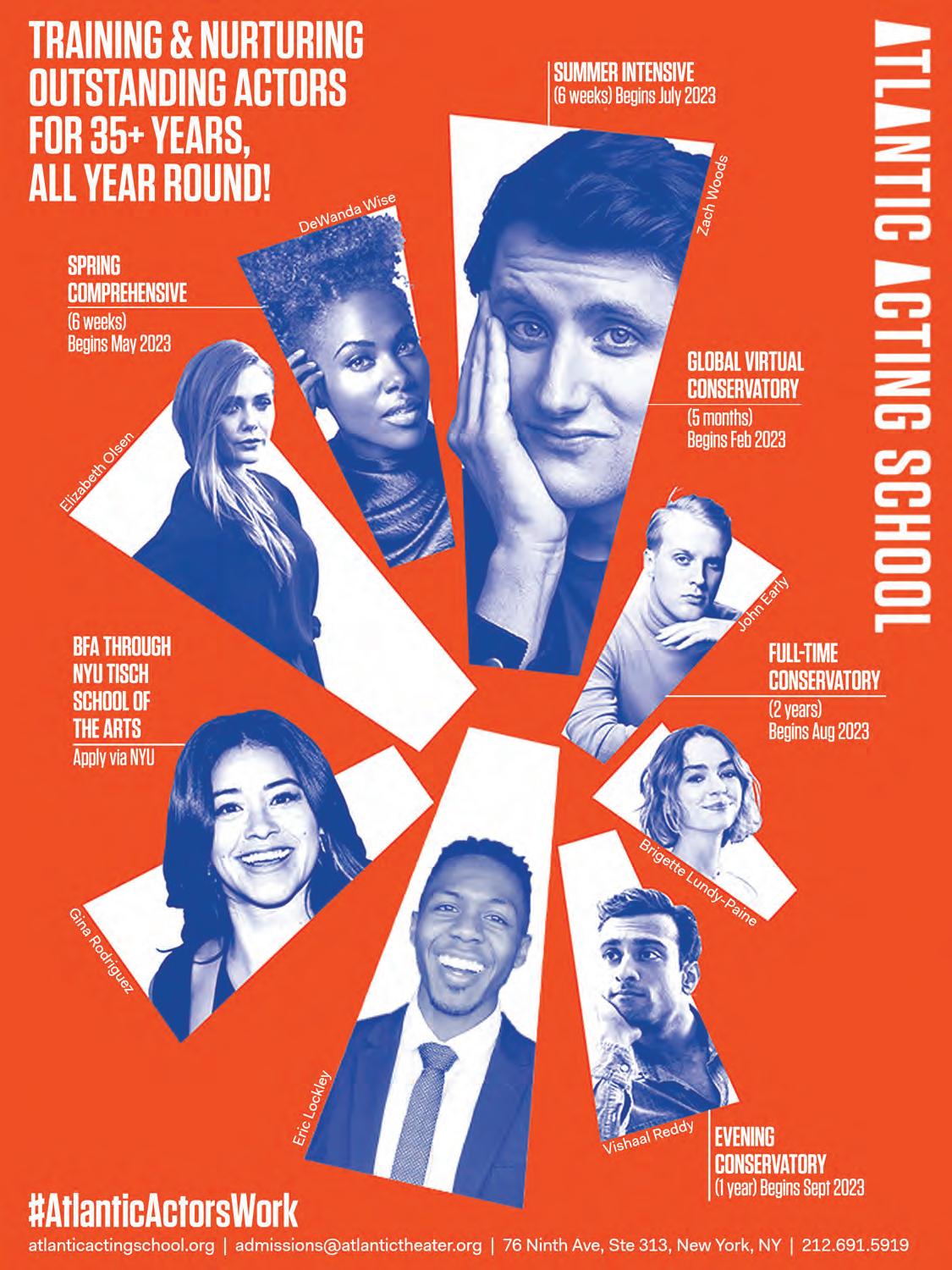
We’re Hiring!
One of the respondents who planned to continue individual assignments is Maegan McNerney Azar (she/her), chair of Theatre Arts at Furman University in Greenville, SC, and current SETC president, who noted the importance of both individual and group work for actor and dancer training.
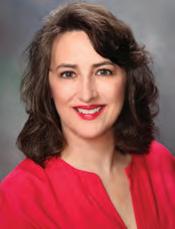

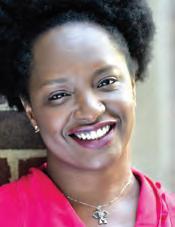

Adanma Onyedike Barton (she/her), an associate professor of theatre at Berea (KY) College and SETC’s vice president of equity & inclusion, spoke for many when she wrote, “Teaching acting over Zoom is a nightmare.” However, she acknowledged that she, like so many practitioners “still found a way to do scene work, and the students ended up enjoying all of our classes.”
Some school representatives said they did not plan to continue additional individual assignments as a general practice, while adding that COVID circumstances might still require flexibility for some students. For example, Reis Myers McCormick (she/ her), director of development for the KD Conservatory College of Film & Dramatic Arts in Dallas, TX, said the school would accommodate students based on need.
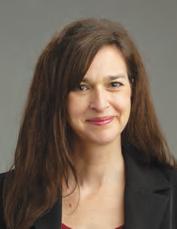
Most of the respondents said they had allowed video submissions for studiobased courses, but none planned to continue the process unless there was a specific connection to the assignment.
Kyla Kazuschyk (she/her), associate professor of costume technology at Louisiana State University and co-chair of SETC’s Cultural Diversity Committee, said there are certain classes where video might be preferred: “For stage makeup and costume construction class, the video presentations have been even better than
the in-person presentations were.”
Several respondents mentioned auditions and screen acting assignments as typical of the kinds of assignments that would continue to use video submissions. David Haugen (he/him), head of performance at Ohio University in Athens, found the practice of “filming assignments at home and uploading them to Flipgrid to be very useful” for screen acting courses.
Remote (video conference) attendance for courses

Everyone affected by the pandemic became familiar with video conference use. Respondents had varying answers to whether this would continue in the classroom. Each theatre department has to follow the institution’s overall policy, and these policies are frequently based on decisions from local and state governments.
Crook, of USC Aiken, noted his institution had “discontinued remote attendance as an option for a traditional, in-person class.”
Several schools continued to allow remote attendance for lecture courses, but less frequently for studio work.

Neno Russell (he/him), costume technologist at the University of Tennessee Knoxville and SETC’s vice president of services, said that “for studio work, it is very difficult for the student to make the progress they would in person. I personally have gone to allowing them more classroom instruction time to make up for missed classes.”
Retaining an option for remote attendance can be important for accessibility, Azar pointed out.
“Students largely prefer to be in person,
Visit us online at ogunquitplayhouse.org/ work-with-us or scan the QR code for more info. 2023 SEASON Celebrating 90 years of world-class theatre.
10 Main St • Ogunquit, ME
Rachel May Reis Myers McCormick Adanma Onyedike Barton
60 x Southern Theatre x Winter 2023
Francine Thomas Reynolds

Nebraska Wesleyan University Theatre Graduate READY to enter the theatre industry. theatre.nebrwesleyan.edu / 402.465.2128 / rkathman@nebrwesleyan.edu Do at NWU. MORE > BFA: acting > BFA: musical theatre > BFA: directing > BFA: design and technology > BFA: theatre studies > BA: theatre > BA: theatre arts education MORE SHOWS —30+ shows a year, including 3-5 musicals MORE EXPERIENCES —beginning your first year MORE CONNECTIONS —to NYC and across the globe MORE DEGREE OPTIONS
and we prefer to have them there, but sometimes circumstances are out of our control, and having the option for virtual attendance prevents missed learning
Like a number of other respondents, Raimondo Genna (he/him), department chair for the University of South Dakota in Vermillion, and McCormick of KD Conservatory noted that video conferencing remained an option for students at their schools who tested positive for COVID-19.

“Our student body has not been entirely COVID-free since our June semester start, therefore the option continues to be


Plans for asynchronous online courses had less to do with the pandemic than with an institution’s prior forays into online instruction. Most had started simply due to the demand and expectation for courses to be offered online and accessible to students on their own time.
At William Carey University in Hattiesburg, MS, it was actually another health challenge that led to asynchronous delivery of classes online, said Tim Matheny (he/him), department chair.
“This initiative began during the swine flu outbreak a number of years ago, and the university president requested every class be prepared to move fully online at a moment’s notice,” Matheny said. “This preparation led to a number of classes that we continued to offer to students as a fully online option.”
Face-to-face and online offerings are offered simultaneously at several schools, including the University of Rhode Island in Kingston, where “we have a few classes

that have historically been taught this way and will continue,” said David T. Howard (he/him), Theatre Department chair.
Foundational changes
Prior to the survey, several educators reported to Southern Theatre that their institutions had seen an increased need to offer preparatory courses for incoming college students since the start of the pandemic – a finding backed up by about half of the survey respondents.
“Freshman through juniors went through two years of high school online,” a survey respondent who wished to remain anonymous said. “They legitimately don’t know how to prepare/study for collegelevel work and have to be taught how to do this and how to utilize the resources – the syllabus, office hours, the library, the student tutoring center, the writing center – provided to them. We realized this at the end of the 2021-2022 school year, that it was a universal experience at colleges regardless of size or status, and are remedying this moving forward.”
Other respondents who said their department or their institution has had to make adjustments to assist such students include Menchinger of Murray State University, who noted that “more students than ever are in expanded Math, English and Reading university studies courses.”

There have been other foundational changes as well. Steve Boone (he/him), associate professor in the Department of Theatre and Film at Bowling Green (OH) State University, said his school has changed attendance policies and that ACT/SAT scores are no longer required. Several respondents mentioned significant
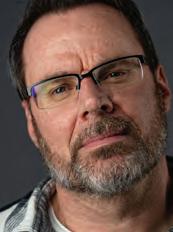

 David Haugen
David Haugen
62
Raimondo Genna Neno Russell Kyla Kazuschyk
x Southern Theatre x Winter 2023
B.A. in Theatre in Performance and/or Production
• TRANSFORM! Shaping the whole theatre artist for the professional theatre industry of today and preparation for success in any career
• THRIVE! Cutting edge consent-based training with nationally and internationally recognized faculty
• CREATE! Dynamic experiential learning in state-of-the-art theatre facilities and technology

• EXPAND! With annual production tour to London to perform in International Theatre festival

additional efforts from departments and institutions to help students deal with mental health challenges. Finally, Menchinger noted what was probably the most shared outcome for all respondents: “Most professors are much more technically savvy than before and more familiar with [their learning management system].”




Looking ahead

It cannot be overstated how frequently respondents expressed their happiness to return to theatres, studios and classrooms. Many will take the lessons learned from the pandemic as a call to continue protecting their students, companies and patrons.


That’s a sentiment well-expressed by Barton: “No one should acquire COVID19 from going to a play. I believe we all
take appropriate measures.”
Yet Barton also acknowledged a longing familiar to all of us in theatre as we try to move forward: “Our students come to the theatre, and we like to put up shows in person. I pray we can continue practicing this even as the world is moving and remaking around us so fast.” n




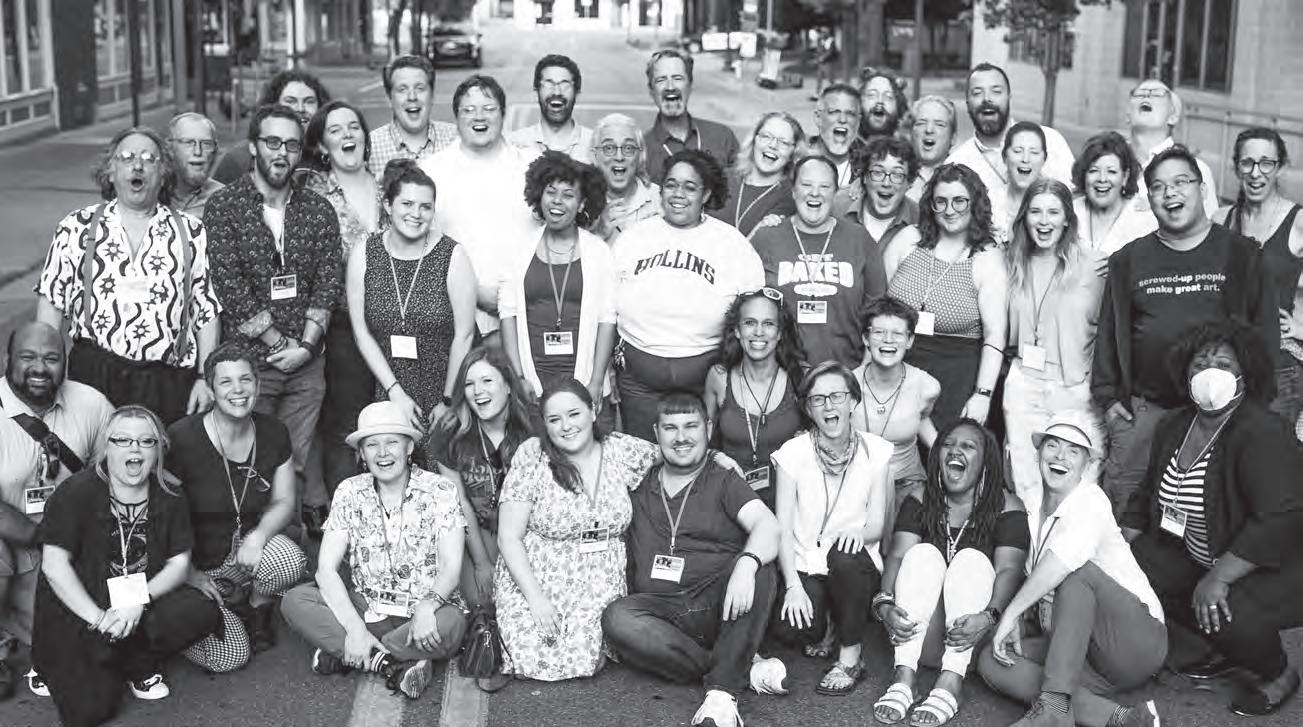 Scott Hayes (he/him) is dean of the School of Communication & the Arts at Liberty University in Virginia and a member of the Southern Theatre Editorial Board.
Scott Hayes (he/him) is dean of the School of Communication & the Arts at Liberty University in Virginia and a member of the Southern Theatre Editorial Board.
THEATRE & DANCE within the Liberal Arts Academically and artistically rigorous Individualized, supportive and inclusive Department of Theatre & Dance theatre.wfu.edu THEATRE & DANCE in the Nation’s Capital STUDY ACTING, DANCE AND PRODUCTION DESIGN WITH A BACHELOR OF ARTS IN THEATRE OR DANCE 202.994.8072 WASHINGTON, DC ctad@gwu.edu
64 x Southern Theatre x Winter 2023
David T. Howard Tim Matheny Steve Boone
DON’T SETTLE FOR JUST A GRADUATE PROGRAM. Find your artistic home in a collaborative, creative community.

with concentrations in dramaturgy, directing, performance, plays with music, plays for youth, and applied theatre hollins.edu/grad/playwriting
hollins.edu/grad/playwriting
Call us at (540) 362-6575 or email hugrad@hollins.edu for full details. Expand
portfolio, upgrade
skills, and build
network during
high-intensity/low-residency intensive summer sessions.
in: New Play Dramaturgy hollins.edu/grad/dramaturgy New Play Directing hollins.edu/grad/directing New Play Performance hollins.edu/grad/acting
in Playwriting
your
your
your
our
Certificates
M.F.A.
Development
M.A. in Theatre and New Play
Words, words, words … [Hamlet II,ii] reviews books on theatre that have a connection to the Southeast or may be of special interest to SETC members. Sarah McCarroll, an associate professor of theatre at Georgia Southern University, edits this regular column. If you have a book for review, please send to: SETC, Book Editor, 5710 W. Gate City Blvd., Suite K, Box 186, Greensboro, NC 27407.

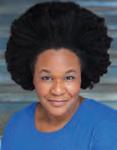
Stage Management Basics: A Primer for Performing Arts

Stage Managers (2nd edition)
by Emily Roth, Jonathan Allender-Zivic and Katy McGlaughlin
2021, 2nd edition, Routledge
Web: www.routledge.com
ISBN: 978-0367678319; Pages: 244
Price: $23.96 (paperback or e-book); $128 (hardback)
by Stacy A. Blackburn
Professors and instructors of stage management are constantly looking for the ideal book to aid them in teaching the “hows” of the craft of stage management. With Stage Management Basics: A Primer for Performing Arts Stage Managers, authors Emily Roth, Jonathan Allender-Zivic, and Katy McGlaughlin offer a step-by-step look at how a stage manager functions in the performing arts. While clearly geared for the beginning stage manager, the book draws on the vast experience of all three authors to take the reader through a show from beginning to end.

This well-written text can really be broken into three primary sections. Section one introduces us to the characteristics of an effective stage manager, the definitions of commonly used theatre terms, and the job descriptions of the staff, creatives and team members a stage manager may come in contact with in the process. It offers a quick introduction to some of the work and context of stage managers for people who may be new to theatre or who have not had much of a formal education in the performing arts. This section may be a bit redundant for theatre folx who have been involved in the performing arts for a while (or have had an Introduction to Theatre class), but it establishes a common vocabulary for the rest of the text.
The second section will be most helpful
for a beginning stage management class at the high school or college level. The authors take us step-by-step through the job of the stage manager, from auditions through the strike of a show. Liberally scattered throughout the text are paperwork samples, diagrams and photos that show “real-world” examples of their ideas in practice. The chapters of this section could easily be translated into a course syllabus for a semester or used as a checklist for beginning stage managers who may already have been thrown into a show. The form samples can easily be translated from the book into blank documents that can be used almost immediately in practice. This second edition of the book also comes with a companion website that has blank form templates ready for use.
The final section of the book covers stage managing for opera and dance. Both chapters compare and contrast the skills, definitions and jobs of the stage manager as described earlier in the book with these specific types of performing arts. Both chapters also show examples of paperwork that might differ from their appearance earlier in the book.
I had a little difficulty finding the companion website that is mentioned throughout the book as having more resources, reading lists, chapter tests and glossary terms. However, I discovered through Routledge that I had just missed it – it is listed at the bottom of the book’s title page (the one that lists published date, ISBN numbers and the like). Go to www. routledge.com/cw/roth, and it pulls up right away. The companion website appears to be rich in resources for both student stage managers and their instructors. There
are downloadable forms for any stage management situation, suggested readings, online and classroom resources, and a link to contact the authors with questions. There is a separate instructors’ area that requires its own log-in.
Stage Management Basics: A Primer for Performing Arts Stage Managers is a terrific resource for beginning stage managers at both the high school and the college level and the people who teach stage management. The book provides an easy-to-follow walk-through of the stage manager’s job, in addition to providing resource material to help stage managers create the paperwork that helps a production flow. n
WORDS, WORDS, WORDS . . .
Stacy A. Blackburn (she/her) is the theatre production manager and a professor of stage management at Virginia Tech. A 24-year member of Actors’ Equity Association, she has worked as the production stage manager for theatres across the country.
Editor: Sarah McCarroll
66 x Southern Theatre x Winter 2023
KENT STATE
MASTER OF FINE ARTS PROGRAMS
M.F.A. in Design and Technology
• Costume Design
• Lighting Design
• Scenic Design
• Theatre Technology
M.F.A. in Acting
BACHELOR OF FINE ARTS PROGRAMS
B.F.A. in Design, Technology and Production
B.F.A. in Musical Theatre
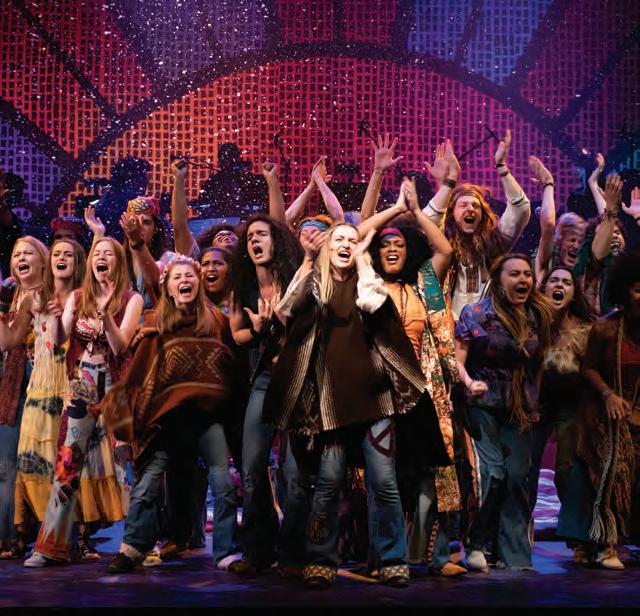

B.F.A. in Dance Performance
BACHELOR OF ARTS PROGRAMS

B.A. in Theatre Studies
B.A. in Dance Studies
WWW.KENT.EDU/THEATREDANCE WWW.PORTHOUSETHEATRE.COM
PASSION. OPPORTUNITY.
Index for Southern Theatre, Volume LXIII
Volume LXIII, Number 1, Winter 2022
Ross, Zackary Hot off the Press All-Gender Casting Possibilities
LXIII/1/2022/4
Glenn, David Outside the Box: Design/Tech Solutions
Window of Opportunity: Use Screen Material for Easy Image Transfer
LXIII/1/2022/6-7
Colleran, Jim Clearing a Path
Tony Award-Winning Teacher Corey Mitchell
Reflects on His Career and His Role as a ‘Bulldozer’ for His Students
LXIII/1/2022/8-14
Theatre Gap Initiative: Creating Opportunities for Students of Color
LXIII/1/2022/16-20
Curry, J. K. Opening Doors
Professional Theatres Partner with HBCUs to Help Develop Black Leaders
LXIII/1/2022/22-34
Cates, Chris Preparing to Start Your Job Search? Professional Companies Offer Advice for Emerging Artists
LXIII/1/2022/38-46
16 Tips for Getting a Theatre Job in 2022
LXIII/1/2022/46-47
Hayes, Scott Pandemic Productions College and University Theatre Professors
Innovate, Embracing Media and Collaboration
LXIII/1/2022/48-68
Bracey, Jasmine Words, Words, Words … Review of Radical Vision: A Biography of Lorraine Hansberry, by Soyica Diggs Colbert
LXIII/1/2022/70
Unbylined Index to Volume LXII
LXIII/1/2022/72
Unbylined 2022 SETC College, University & Training Program Directory
LXIII/1/2022/D-1 – D-28
Volume LXIII, Number 2, Spring/Summer 2022
Ross, Zackary Hot off the Press Plays With Younger Roles
LXIII/2/2022/4
Stratton, Matthew Outside the Box: Design/Tech Solutions Pump Up Your Spatter Technique: The Garden Sprayer 2.0
LXIII/2/2022/6-7
Jeffers, Gaye Norm Lewis ‘Believe in Something, and Believe in Yourself’ LXIII/2/2022/8-17
Cuomo, Amy Sally Cade Holmes Producing Is Her Super power
LXIII/2/2022/18-24
Edwards, Johanna
Maynard Jim LeBrecht Inclusivity, Not Just Accessibility
LXIII/2/2022/26-32
Watkins, Elizabeth Embracing Inclusion Diversify Your Classroom, Empower Your Students with Devised Theatre LXIII/2/2022/34-40
Taylor, Jonathon
After the Pandemic Pause
Advice from the 2022 SETC Design Keynotes on Retur ning to Work in a Reframed Theatre World LXIII/2/2022/42-47
Unbylined SETC Thanks Its Commercial Partners LXIII/2/2022/48
Milton, Garrett Lee 2022 SETC Young Scholars Award Winners Schönegge, Berit LXIII/2/2022/50
Benjamin, Jack Tiza Garland Honored with SETC’s 2022 Suzanne M. Davis Memorial Award LXIII/2/2022/51
Hurtado, Javier Luis Words, Words, Words … Review of Theatre of the Sphere: The Vibrant Being, by Luis Valdez and Michael M. Chemers LXIII/2/2022/52
Volume LXIII, Number 3, Fall 2022
Ross, Zackary Hot off the Press Plays About Obstacles
LXIII/3/2022/4
Glenn, David Outside the Box: Design/Tech Solutions Stops on Stage: Searching for a Braking Breakthrough
LXIII/3/2022/6-7
Novak, Tiffany Dupont The Future of Ar ts Fundraising Viewed Through the Lens of Six Rising Leaders
LXIII/3/2022/8-24
Alsip, Tom A Play for All Seasons Colleges Share the Key Factors They Consider in the Show Selection Process
LXIII/3/2022/26-38
King, Laura
Playwriting in the Pandemic Much Was Lost, and Much Was Found
LXIII/3/2022/40-56
2022 Charles M. Getchell New Play Award King, Laura The Playwright
2022 Getchell Award Winner John Mabey Explores the Link Between Celebrating a Person’s Life and Grieving Their Loss
LXIII/3/2022/58-59, 62
Mabey, John The Play

An excerpt from A Complicated Hope, the 2022 winner of the Charles M. Getchell New Play Award, given by SETC to recognize a worthy new play, is published.
LXIII/3/2022/60-61
D’Ambrosi, Joseph R.
Words, Words, Words … Review of Toward a Future Theatre: Conversations During a Pandemic, by Caridad Svich
LXIII/3/2022/64
C M Y CM MY CY CMY K 68 x Southern Theatre x Winter 2023


Contact Resources For: For Disney Live Entertainment opportunities, please visit our website at Disneycareers.com. © Disney *Images do not represent current operational guidelines or health and safety measures such as face covering and physical distancing requirements. Visit DCLjobs.com for opportunities Disney Live Entertainment works with various live entertainment entities and actual hiring agency may be one of those entities.

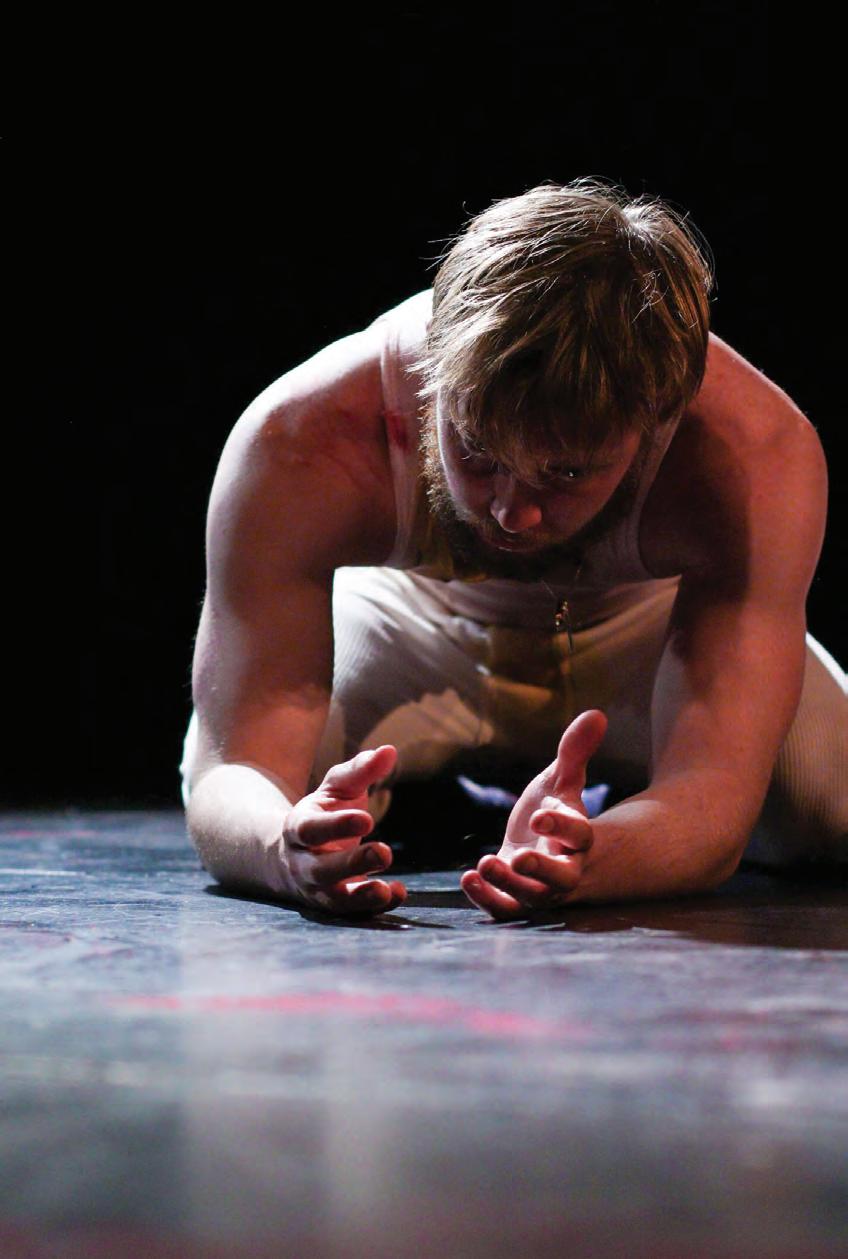
Non-Profit Org. US Postage Paid Auto Greensboro, NC Permit No. 744 Southeastern Theatre Conference 5710 W. Gate City Blvd., Suite K, Box 186 Greensboro, NC 27407 www.setc.org Stella Adler Studio of Acting 65 Broadway Floor 2 New York, NY 10006 StellaAdler.com 212-689-0087 classes@stellaadler.com Art of Acting Studio 1017 N Orange Drive Los Angeles, CA 90038 artofactingstudio.com 323-601-5310 info@artofactingstudio.com I WANT TO CHANGE THE WORLD. I WANT TO HEAL. I WANT TO BE A DOCTOR. PROFESSIONAL CONSERVATORY Apply by January 6, 2023 An Affordable MFA Alternative 2023 SUMMER INTENSIVES ACTOR WORKSHOPS The Stella Adler Studio of Acting/Art of Acting Studio is a 501(c)3 not-for-profit organization and is accredited by the National Association of Schools of Theatre. Actor!







 by Stefanie Maiya Lehmann
by Stefanie Maiya Lehmann
 by Holly L. Derr
by Holly L. Derr

 Zackary Ross (he/him) is an assistant professor of theatre and the arts administration program director at Bellarmine University in Louisville, KY. He is a member of the Southern Theatre Editorial Board.
Zackary Ross (he/him) is an assistant professor of theatre and the arts administration program director at Bellarmine University in Louisville, KY. He is a member of the Southern Theatre Editorial Board.




























































 22 x Southern Theatre x Winter 2023
22 x Southern Theatre x Winter 2023

 by Jennifer Goff
Porfirio Solorzano
by Jennifer Goff
Porfirio Solorzano

 AMY
AMY
























































 by Holly L. Derr
Kristi Jan Hoover
by Holly L. Derr
Kristi Jan Hoover











 ABOVE: Blanka Zizka (second from left), co-founder and artistic director emeritus of the Wilma Theatre, chose a diverse group of three directors to become co-artistic directors before she stepped down from her lead role: James Ijames (left), Yuri Urnov (second from right) and Morgan Green (right).
ABOVE: Blanka Zizka (second from left), co-founder and artistic director emeritus of the Wilma Theatre, chose a diverse group of three directors to become co-artistic directors before she stepped down from her lead role: James Ijames (left), Yuri Urnov (second from right) and Morgan Green (right).







 TOP: Center Theatre Group is operating under shared artistic leadership, currently with four associate artistic directors (left to right): Kelley Kirkpatrick, Tyrone Davis, Lindsay Allbaugh and Neel Keller. A fifth associate artistic director, Luis Alfaro, not pictured, stepped down recently.
BOTTOM: Center Theatre Group / Mark Taper Forum presented the West Coast premiere of Lynn Nottage’s play Clyde’s, which ran from Nov. 16 through Dec. 18, 2022. Featured in a scene from the play are (left to right) Nedra Snipes, Garrett Young, Reza Salazar and Kevin Kenerly.
TOP: Center Theatre Group is operating under shared artistic leadership, currently with four associate artistic directors (left to right): Kelley Kirkpatrick, Tyrone Davis, Lindsay Allbaugh and Neel Keller. A fifth associate artistic director, Luis Alfaro, not pictured, stepped down recently.
BOTTOM: Center Theatre Group / Mark Taper Forum presented the West Coast premiere of Lynn Nottage’s play Clyde’s, which ran from Nov. 16 through Dec. 18, 2022. Featured in a scene from the play are (left to right) Nedra Snipes, Garrett Young, Reza Salazar and Kevin Kenerly.

































 by Scott Hayes
Kasey Brookshire
by Scott Hayes
Kasey Brookshire













 Karen Brewster Eric Griffis Paul B. Crook
Karen Brewster Eric Griffis Paul B. Crook





 Marina Hunley-Graham
Marina Hunley-Graham





















 David Haugen
David Haugen













 Scott Hayes (he/him) is dean of the School of Communication & the Arts at Liberty University in Virginia and a member of the Southern Theatre Editorial Board.
Scott Hayes (he/him) is dean of the School of Communication & the Arts at Liberty University in Virginia and a member of the Southern Theatre Editorial Board.










